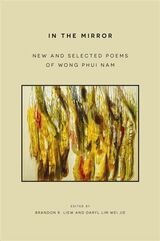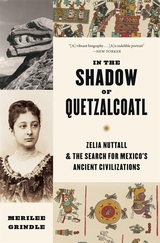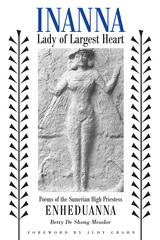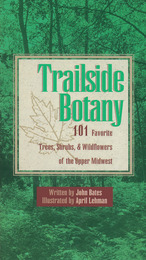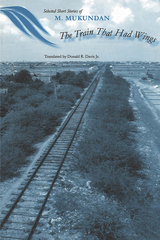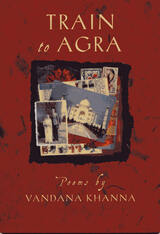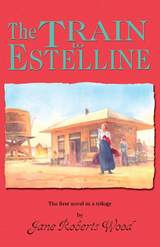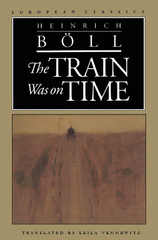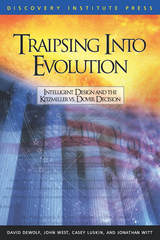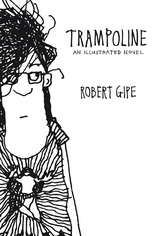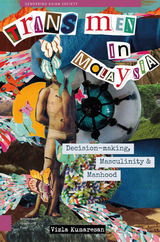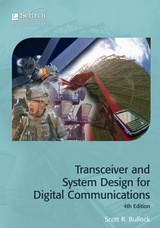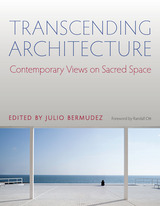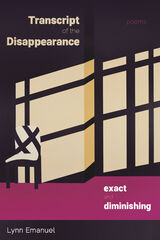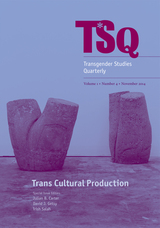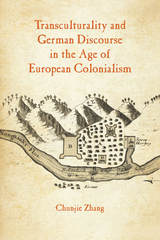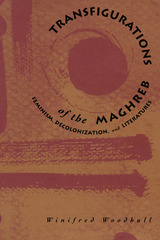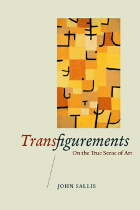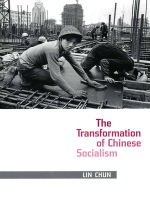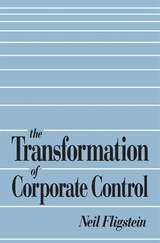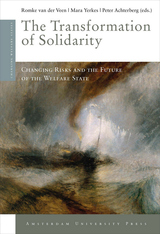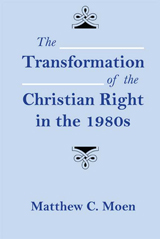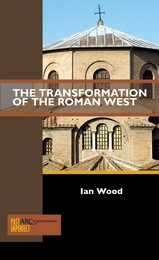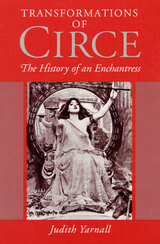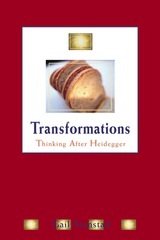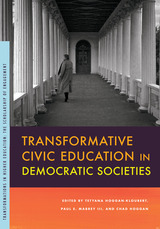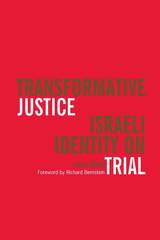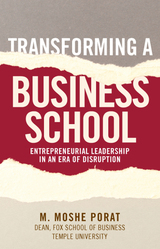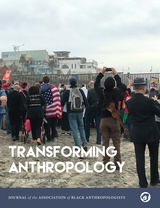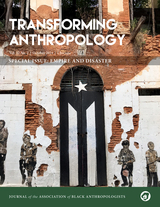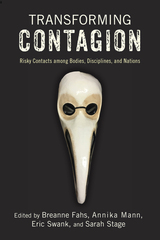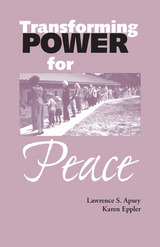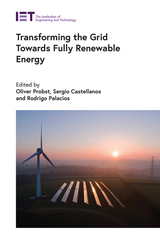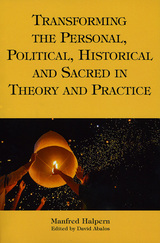Trails for the Twenty-First Century: Planning, Design, and Management Manual for Multi-Use Trails
Edited by Karen-Lee Ryan; Rails-to-Trails Conservancy
Island Press, 1993 Trails for the Twenty-first Century gives step-by-step guidance in all aspects of the planning, design, and management of multi-use trails. Topics discussed include: - how to make physical and cultural assessments of the site and surrounding communities
- planning the trail: public involvement, meeting the needs of adjacent landowners, compliance with legislation
- designing the trail: making it unique,meeting the needs of different users, working with special features
- maximizing the trail's potential
Trails of Central Arkansas: A Guide to Central Arkansas' Land and Water Trails
Johnnie Chamberlin
Parkhurst Brothers, Inc., 2012 Chock-full of informative detail,
Trails of Central Arkansas delivers:
* Sixty trails in 36 parks or locations from Benton and Bryant to Cabot, from Wrightsville to Conway
* Color maps of every trail
* GPS coordinates for every trailhead
* Color-coded distinctions between paved and unpaved trails
* Level of difficulty ratings
* Scenery Scores
* Top-ten lists: Most Scenic, Trails for Kids, and Trails for Solitude
Trails of Little Rock: Hiking, Biking, and Kayaking Trails in Little Rock
Johnnie Chamberlin
Parkhurst Brothers, Inc., 2009 Residents and visitors have an urban-outdoor haven in Little Rock: actually more than two dozen of them. They are the hiking trails, biking trails as well as the canoe and kayak-read waterways within the city and immediate area. Whether your passion is a quiet walk in the woods, a mountain-climb, fishing, bird-watching, or a quiet float, this handbook will help you find and use the trails and waterways of Little Rock.
 Trails to Tiburón: The 1894 and 1895 Field Diaries of W J McGee
W. J. McGee; Transcribed by Hazel McFeely Fontana; Annotated and with an Introduction by Bernard L. Fontana
University of Arizona Press, 2000 When William John McGee set out from Washington, D.C., for the Sonoran Desert in 1894, he was inspired by a passion for adventure as much as a thirst for knowledge. McGee lived in an era when discovery was made through travel rather than study, and reputations were forged by going where no outsiders had gone before.
A self-taught scientist in the newly forming field of anthropology, McGee led two expeditions through southern Arizona and northern Sonora for the Bureau of American Ethnology. There he conducted ethnographic research among the Papagos (Tohono O'odham) and the Seris, and his subsequent publication The Seri Indians helped secure his place in the anthropological community.
McGee's complete journals of the expeditions, kept in small field notebooks and preserved in the Library of Congress, are published here for the first time. These journals contain detailed descriptions of the country and people McGee encountered and convey the adventure of traveling through wild and unfamiliar places—including a voyage to Isla Tiburón, or Shark Island, in the Gulf of California—and being plagued by foul weather, a shortage of supplies, and fear of attack from hostile Indians.
Trails to Tiburón features 57 historical photographs taken on the expedition, capturing the places McGee saw and the people he encountered. Fontana's notes to the diary provide useful botanical, geological, and ethnographic information, while his introduction places McGee and his field work in the context of late-nineteenth-century anthropology and science.
Trails to Tiburón reveals McGee's versatility as a field worker and shows his methods, often questioned today, to be the reasonable response of a man caught up in the intellectual fervor of his time. For anyone wanting to share in the spirit of adventure, these journals are a landmark in the annals of exploration.
Trailside Botany: 101 Favorite Trees, Shrubs, and Wildflowers of the Upper Midwest
John Bates
University of Minnesota Press, 2004 In Trailside Botany, you will find clear descriptions and detailed drawings of the 101 wildflowers, trees, and other plants that you are most likely to see along your favorite North Woods trail. Take your exploration a step further by trying the intriguing activities naturalist John Bates suggests throughout the book. The carry-along guide is a must for families, hikers, teachers, students, and naturalists of all ages.
Train Dance
Jonathan Wells
Four Way Books, 2011 Train Dance adopts the rhythm and return of the commute through the Hudson Valley into Manhattan as a motif for the echoes of memory and event that contour a life. Reflecting on the place of poetry amid the urban hustle—a way one might “Carry myself like a tune/ Into the chorus of the city”—Wells records a series of linked journeys in which a son comes to understands his mother’s death and writing engraves events in memory, retaining events as locations—station stops, as it were—to which one returns.
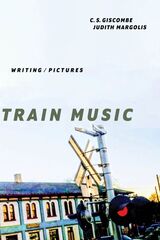 Train Music: Writing / Pictures
C.S. Giscombe and Judith Margolis
Omnidawn, 2021 A poet and a book artist take a train across the United States, creating and conversing along the way.
Late in the fall of 2017, poet C. S. Giscombe and book artist Judith Margolis boarded an Amtrak train in New York City and, four days later, stepped off another train at the edge of San Francisco Bay. Giscombe was returning home to California to address an all-white audience on the problem of white supremacy, and expatriate Margolis, accustomed to a somewhat solitary existence, was visiting the United States and making collages. Traveling together, they each turned their train quarters into writing and drawing “studios” where they engaged in conversations and arguments and shared experiences of the discomforts and failures of recent times.
Their original intention had been to travel west and document, in journals and sketchpads, the complex, charged American landscape, but as the trip progressed—and in the months afterwards—the project took on a new shape. Train Music, the book that resulted, recollects and explores the century’s racial and gendered conflicts—sometimes sensually, sometimes in stark images, sometimes in a “mixed economy” of poetry and prose.
The Train That Had Wings: Selected Stories of M. Mukundan
M. Mukundan; Translated from the Malayalam by Donald R. Davis Jr.
University of Michigan Press, 2005 The Train That Had Wings presents modern life in Kerala in terms of a shared but tragically compromised humanity. Mukundan dares to look beneath the routines and facades of everyday life in order to probe depth of sin, greed, and hypocrisy but also to rediscover what brings joy and hope. Sixteen short story translations and a critical introduction, offering examples of Mukundan's realistic, existentialist, psychedelic, and parabolic stories, show his range and talent for the very short story. If Hawthorne wrote “twice told tales,” Mukundan writes half-told tales, stories that jump in the middle, stomp around for just a minute, and leap away almost before the reader can settle in. Half-told, but a powerful and infectious half.
Train to Agra
Vandana Khanna
Southern Illinois University Press, 2001 Calling upon two cultures, Vandana Khanna’s Train to Agra meditates on the effects of displacement and expatriation on the construction of a young Indian American woman’s identity. The physical journeys undertaken by the speaker reflect her inner journey from immigrant child to Indian American woman, struggling to find her place between India and America, Krishna and Jesus, samosas and hamburgers. The speaker constantly tries to recapture visions, smells, and sounds of her childhood and her travels, but cannot do so without imagination. Her memory fails her, so through metaphor she invents her past as it should have been. Traveling through her reflections on childhood, fate, faith, death, and belonging, she comes to accept her reality as a construct of lived memories and wished-for fantasies.
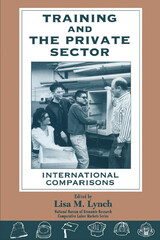 Training and the Private Sector: International Comparisons
Edited by Lisa M. Lynch
University of Chicago Press, 1994 How can today's workforce keep pace with an increasingly competitive global economy? As new technologies rapidly transform the workplace, employee requirements are changing and workers must adapt to different working conditions. This volume compares new evidence on the returns from worker training in the United States, Germany, France, Britain, Japan, Norway, and the Netherlands.
The authors focus on Germany's widespread, formal apprenticeship programs; the U.S. system of learning-by-doing; Japan's low employee turnover and extensive company training; and Britain's government-led and school-based training schemes. The evidence shows that, overall, training in the workplace is more effective than training in schools. Moreover, even when U.S. firms spend as much on training as other countries do, their employees may still be less skilled than workers in Europe or Japan.
Training and the Private Sector points to training programs in Germany, Japan, and other developed countries as models for creating a workforce in the United States that can compete more successfully in today's economy.
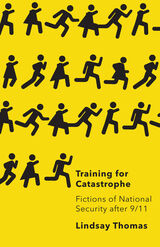 Training for Catastrophe: Fictions of National Security after 9/11
Lindsay Thomas
University of Minnesota Press, 2021 A timely, politically savvy examination of how impossible disasters shape the very real possibilities of our world Why would the normally buttoned-down national security state imagine lurid future scenarios like a zombie apocalypse? In Training for Catastrophe, author Lindsay Thomas shows how our security regime reimagines plausibility to focus on unlikely and even unreal events rather than probable ones. With an in-depth focus on preparedness (a pivotal, emergent national security paradigm since 9/11) she explores how fiction shapes national security. Thomas finds fiction at work in unexpected settings, from policy documents and workplace training manuals to comics and video games. Through these texts—as well as plenty of science fiction—she examines the philosophy of preparedness, interrogating the roots of why it asks us to treat explicitly fictional events as real. Thomas connects this philosophical underpinning to how preparedness plays out in contemporary politics, emphasizing how it uses aesthetic elements like realism, genre, character, and plot to train people both to regard some disasters as normal and to ignore others. Training for Catastrophe makes an important case for how these documents elicit consent and compliance. Thomas draws from a huge archive of texts—including a Centers for Disease Control comic about a zombie apocalypse, the work of Audre Lorde, and the political thrillers of former national security advisor Richard Clarke—to ask difficult questions about the uses and values of fiction. A major statement on how national security intrudes into questions of art and life, Training for Catastrophe is a timely intervention into how we confront disasters.
 Training Library Instructors: Vol 1: A Guide to Training Graduate Students
Matthew Weirick Johnson
Association of College & Research Libraries, 2024 Pedagogy impacts all parts of library work and culture. It changes the way we interact with learners regardless of setting and however we name or define the teaching moment, from research help to outreach to leading meetings. Pedagogy is a praxis of relation, and studying it can improve all aspects of our work and organizations.
In two volumes, Training Library Instructors collects examples of how we train our colleagues to teach, whether they’re student workers, non-librarian staff, new or experienced librarians, or something else entirely. Volume 1, A Guide to Training Graduate Students, focuses on teacher training for graduate students in LIS programs and in academic libraries. It presents existing literature and theories, approaches to teaching library school students to teach, and critical reflections from librarians about their varied experiences receiving teacher training.
A Guide to Training Graduate Students provides a useful introduction, detailed examples, and salient reflections to help us better train library instructors during their time as graduate students through coursework and work experience. You’ll discover ideas for designing courses, internships, and other programs and ways to mentor graduate students who are interested in becoming library instructors.
 Training Library Instructors: Vol 2: A Guide to Training Librarians
Matthew Weirick Johnson
Association of College & Research Libraries, 2024 Pedagogy impacts all parts of library work and culture. It changes the way we interact with learners regardless of setting and however we name or define the teaching moment, from research help to outreach to leading meetings. Pedagogy is a praxis of relation, and studying it can improve all aspects of our work and organizations.
In two volumes, Training Library Instructors collects examples of how we train our colleagues to teach, whether they’re student workers, non-librarian staff, new or experienced librarians, or something else entirely. In Volume 2, A Guide to Training Librarians, librarians share their knowledge about teaching, learning, and pedagogy through a variety of replicable activities: formal and informal workshops, courses, communities of practice, peer observation, and more. Programs include mock instruction, nano-teaching, and other feedback and homework mechanisms; happen at the individual, institutional, or consortial level; and can involve collaborations across library or university departments.
So many librarians value lifelong learning and the opportunity to learn from each other. A Guide to Training Librarians provides a starting point for readers considering their own teach-the-teacher programs and various approaches to learning together, exploring library instruction for the first time, or expanding existing knowledge through continued education.
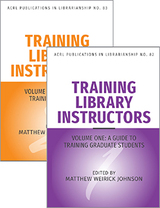 Training Library Instructors: Volume 1 and 2
Matthew Weirick Johnson
Association of College & Research Libraries, 2024 Pedagogy impacts all parts of library work and culture. It changes the way we interact with learners regardless of setting and however we name or define the teaching moment, from research help to outreach to leading meetings. Pedagogy is a praxis of relation, and studying it can improve all aspects of our work and organizations.
In two volumes, Training Library Instructors collects examples of how we train our colleagues to teach, whether they’re student workers, non-librarian staff, new or experienced librarians, or something else entirely. Volume 1, A Guide to Training Graduate Students, focuses on teacher training for graduate students in LIS programs and in academic libraries. It presents existing literature and theories, approaches to teaching library school students to teach, and critical reflections from librarians about their varied experiences receiving teacher training. In Volume 2, A Guide to Training Librarians, librarians share their knowledge about teaching, learning, and pedagogy through a variety of replicable activities: formal and informal workshops, courses, communities of practice, peer observation, and more.
Training Library Instructors provides detailed, easily implemented and modified plans for courses, internships, teach-the-teacher programs, and other instructional methods and opportunities for graduate students and library workers at all levels of teaching experience.
 The Training of Good Physicians: Critical Factors in Career Choices
Fremont J. Lyden, H. Jack Geiger, and Osler L. Peterson
Harvard University Press Why do some doctors begin practice before they have as much training as they should ideally have? This book attempts to find answers to this vital question. It is the first large-scale comparative study of American medical school graduates in terms of the amount and type of training received and choice of specialty. The graduates from two classes, 1950 and 1954, of twelve widely differing medical schools were sent questionnaires requesting detailed information on their backgrounds, financial and social circumstances while in medical school, and other pertinent data. The authors have related the survey data to selection of specialty in such a way as to create profiles of the doctors who decide on a more thorough preparation and those who are satisfied with less. This organization of the material provides information basic to the problem of determining how to encourage more extensive training.
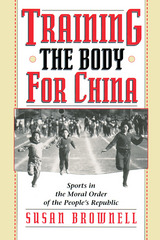 Training the Body for China: Sports in the Moral Order of the People's Republic
Susan Brownell
University of Chicago Press, 1995 Competing in the 1986 National College Games of the People's Republic of China, Susan Brownell earned both a gold medal in the heptathlon and fame throughout China as "the American girl who won glory for Beijing University." Now an anthropologist, Brownell draws on her direct experience of Chinese athletics in this fascinating look at the culture of sports and the body in China.
Training the Body for China is the first book on Chinese sports based on extended fieldwork by a Westerner. Brownell introduces the notion of "body culture" to analyze Olympic sports as one element in a whole set of Chinese body practices: the "old people's disco dancing" craze, the new popularity of bodybuilding (following reluctant official acceptance of the bikini), mass calisthenics, martial arts, military discipline, and more.
Translating official and dissident materials into English for the first time and drawing on performance theory and histories of the body, Brownell uses the culture of the body as a focal point to explore the tensions between local and global organizations, the traditional and the modern, men and women. Her intimate knowledge of Chinese social and cultural life and her wide range of historic examples make Training the Body for China a unique illustration of how gender, the body, and the nation are interlinked in Chinese culture.
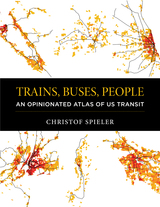 Trains, Buses, People: An Opinionated Atlas of US Transit
Christof Spieler
Island Press, 2018 What are the best transit cities in the US? The best Bus Rapid Transit lines? The most useless rail transit lines? The missed opportunities?
In the US, the 25 largest metropolitan areas and many smaller cities have fixed guideway transit—rail or bus rapid transit. Nearly all of them are talking about expanding. Yet discussions about transit are still remarkably unsophisticated. To build good transit, the discussion needs to focus on what matters—quality of service (not the technology that delivers it), all kinds of transit riders, the role of buildings, streets and sidewalks, and, above all, getting transit in the right places.
Christof Spieler has spent over a decade advocating for transit as a writer, community leader, urban planner, transit board member, and enthusiast. He strongly believes that just about anyone—regardless of training or experience—can identify what makes good transit with the right information. In the fun and accessible Trains, Buses, People: An Opinionated Atlas of US Transit, Spieler shows how cities can build successful transit. He profiles the 47 metropolitan areas in the US that have rail transit or BRT, using data, photos, and maps for easy comparison. The best and worst systems are ranked and Spieler offers analysis of how geography, politics, and history complicate transit planning. He shows how the unique circumstances of every city have resulted in very different transit systems.
Using appealing visuals, Trains, Buses, People is intended for non-experts—it will help any citizen, professional, or policymaker with a vested interest evaluate a transit proposal and understand what makes transit effective. While the book is built on data, it has a strong point of view. Spieler takes an honest look at what makes good and bad transit and is not afraid to look at what went wrong. He explains broad concepts, but recognizes all of the technical, geographical, and political difficulties of building transit in the real world. In the end,Trains, Buses, People shows that it is possible with the right tools to build good transit.
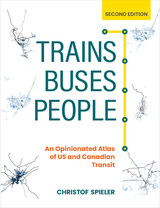 Trains, Buses, People, Second Edition: An Opinionated Atlas of US and Canadian Transit
Christof Spieler
Island Press, 2021 “Gets right to the point: put [transit] where the people are...The author combines detailed knowledge and a refreshing frankness...Keep this book within easy reach.”
-Planning
In some US and Canadian cities, transit has quietly been expanding and improving over the last few years, despite funding and ridership challenges. How do we assess the advances and failures of our current systems to move forward strategically and wisely?
The first edition of Trains, Buses, People was dubbed “a transit wonk’s bible” and guided “a smarter conversation about urban transit” in the US. This second edition is fully updated and expanded to include eight Canadian cities and two new US cities (Indianapolis and San Juan, Puerto Rico).
In Trains, Buses, People, Second Edition: An Opinionated Atlas of US and Canadian Transit, transit expert and “transportation hero” Christof Spieler provides a new section on inclusivity to help agencies understand how to welcome riders regardless of race, gender, income, or disability. Select cities include new maps overlaying transit and poverty data, and systems that have started construction since the first edition in 2018 have been added. Other new sections address network typologies, guideway types, station types, and fares.
Spieler has spent over a decade advocating for transit as a writer, community leader, urban planner, transit board member, and enthusiast. He strongly believes that just about anyone—regardless of training or experience—can identify what makes good transit with the right information. In the fun, accessible, and visually appealing Trains, Buses, People, Second Edition: An Opinionated Atlas of US and Canadian Transit, Spieler shows how cities can build successful transit. He profiles the 49 metropolitan areas in the US and eight metropolitan areas in Canada that have rail transit or BRT, using data, photos, and maps for easy comparison. Spieler ranks the best and worst systems and he offers analysis of how geography, politics, and history complicate transit planning. He shows how the unique circumstances of every city have resulted in very different transit systems.
Trains, Buses, People, Second Edition is intended for non-experts—it will help any citizen, professional, or policymaker with a vested interest evaluate a transit proposal and understand what makes transit effective. It shows that it is possible, with the right tools, to build good transit.
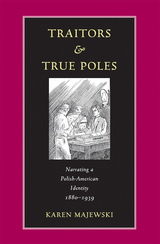 Traitors and True Poles: Narrating a Polish-American Identity, 1880–1939
Karen Majewski
Ohio University Press, 2003 During Poland’s century-long partition and in the interwar period of Poland’s reemergence as a state, Polish writers on both sides of the ocean shared a preoccupation with national identity. Polish-American immigrant writers revealed their persistent, passionate engagement with these issues, as they used their work to define and consolidate an essentially transnational ethnic identity that was both tied to Poland and independent of it. By introducing these varied and forgotten works into the scholarly discussion, Traitors and True Poles recasts the literary landscape to include the immigrant community’s own competing visions of itself. The conversation between Polonia’s creative voices illustrates how immigrants manipulated often difficult economic, social, and political realities to provide a place for and a sense of themselves. What emerges is a fuller picture of American literature, one vital to the creation of an ethnic consciousness. This is the first extended look at Polish-language fiction written by turn-of-the-century immigrants, a forgotten body of American ethnic literature. Addressing a blind spot in our understanding of immigrant and ethnic identity and culture, Traitors and True Poles challenges perceptions of a silent and passive Polish immigration by giving back its literary voice.
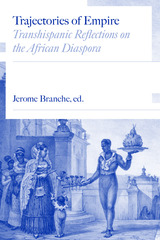 Trajectories of Empire: Transhispanic Reflections on the African Diaspora
Jerome C. Branche
Vanderbilt University Press, 2022 Trajectories of Empire extends from the beginning of the Iberian expansion of the mid-fifteenth century, through colonialism and slavery, and into the twentieth and twenty-first centuries in Latin American republics. Its point of departure is the question of empire and its aftermath as reflected in the lives of contemporary Latin Americans of African descent and of their ancestors in the historical processes of Iberian colonial expansion, colonization, and the Atlantic slave trade.
The book’s chapters explore what Blackness means in the so-called racial democracies of Brazil and Cuba today. Among the historical narratives and themes it covers are the role of medical science in the objectification and nullification of Black female personhood during slavery in nineteenth-century Brazil; the protocols of portraiture in the colonial period that, in including enslaved individuals, pictorially highlight and freeze their supposed inferiority vis-à-vis their owners; and those aspects of discourse that promote colonial capture and oppression in terms of evangelization and the saving of souls, or simply create the discursive template as early as the fifteenth century, for their continued alienation and marginalization across generations.
Trajectories of Empire’s contributions come from the fields of literary criticism, visual culture, history, anthropology, popular culture (rap), and cultural studies. As the product of an interdisciplinary collective, this book will be of interest to scholars in Iberian or Hispanic studies, Africana studies, postcolonial studies, and transatlantic studies, as well as the general public.
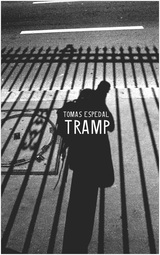 Tramp: Or the Art of Living a Wild and Poetic Life
Tomas Espedal
Seagull Books, 2010 A lyrical travelogue charting Tomas Espedal’s journeys to and ruminations around the world, from his native Norway to Istanbul and beyond.
“Why travel?” asks Tomas Espedal in Tramp, “Why not just stay at home, in your room, in your house, in the place you like better than any other, your own place. The familiar house, the requisite rooms in which we have gathered the things we need, a good bed, a desk, a whole pile of books. The windows giving on to the sea and the garden with its apple trees and holly hedge, a beautiful garden, growing wild.”
The first step in any trip or journey is always a footstep—the brave or curious act of putting one foot in front of the other and stepping out of the house onto the sidewalk below. Here, Espedal contemplates what this ambulatory mode of travel has meant for great artists and thinkers, including Rousseau, Kant, Hazlitt, Thoreau, Rimbaud, Whitman, Giacometti, and Robert Louis Stevenson. In the process, he confronts his own inability to write from a fixed abode and his refusal to banish the temptation to become permanently itinerant.
Lyrical and rebellious, immediate and sensuous, Tramp conveys Espedal’s own need to explore on foot—in places as diverse as Wales and Turkey—and offers us the excitement and adventure of being a companion on his fascinating and intriguing travels.
Trampoline: An Illustrated Novel
Robert Gipe
Ohio University Press, 2015 Dawn Jewell is fifteen. She is restless, curious, and wry. She listens to Black Flag, speaks her mind, and joins her grandmother’s fight against mountaintop removal mining almost in spite of herself. “I write by ear,” says Robert Gipe, and Dawn’s voice is the essence of his debut novel, Trampoline. She lives in eastern Kentucky with her addict mother and her Mamaw, whose stance against the coal companies has earned her the community’s ire. Jagged and honest, Trampoline is a powerful portrait of a place struggling with the economic and social forces that threaten and define it. Inspired by oral tradition and punctuated by Gipe’s raw and whimsical drawings, it is above all about its heroine, Dawn, as she decides whether to save a mountain or save herself; be ruled by love or ruled by anger; remain in the land of her birth or run for her life.
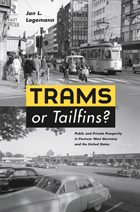 Trams or Tailfins?: Public and Private Prosperity in Postwar West Germany and the United States
Jan L. Logemann
University of Chicago Press, 2012 In the years that followed World War II, both the United States and the newly formed West German republic had an opportunity to remake their economies. Since then, much has been made of a supposed “Americanization” of European consumer societies—in Germany and elsewhere. Arguing against these foggy notions, Jan L. Logemann takes a comparative look at the development of postwar mass consumption in West Germany and the United States and the emergence of discrete consumer modernities. In Trams or Tailfins?, Logemann explains how the decisions made at this crucial time helped to define both of these economic superpowers in the second half of the twentieth century. While Americans splurged on private cars and bought goods on credit in suburban shopping malls, Germans rebuilt public transit and developed pedestrian shopping streets in their city centers—choices that continue to shape the quality and character of life decades later. Outlining the abundant differences in the structures of consumer society, consumer habits, and the role of public consumption in these countries, Logemann reveals the many subtle ways that the spheres of government, society, and physical space define how we live.
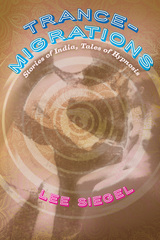 Trance-Migrations: Stories of India, Tales of Hypnosis
Lee Siegel
University of Chicago Press, 2014 Listen to what I am about to tell you: do not read this book alone. You really shouldn’t. In one of the most playful experiments ever put between two covers, every other section of Trance-Migrations prescribes that you read its incantatory tales out loud to a lover, friend, or confidant, in order to hypnotize in preparation for Lee Siegel’s exploration of an enchanting India. To read and hear this book is to experience a particular kind of relationship, and that’s precisely the point: hypnosis, the book will demonstrate, is an essential aspect of our most significant relationships, an inherent dimension of love, religion, medicine, politics, and literature, a fundamental dynamic between lover and beloved, deity and votary, physician and patient, ruler and subject, and, indeed, reader and listener.
Even if you can’t read this with a partner—and I stress that you certainly ought to—you will still be in rich company. There is Shambaraswami, an itinerant magician, hypnotist, and storyteller to whom villagers turn for spells that will bring them wealth or love; José-Custodio de Faria, a Goan priest hypnotizing young and beautiful women in nineteenth-century Parisian salons; James Esdaile, a Scottish physician for the East India Company in Calcutta, experimenting on abject Bengalis with mesmerism as a surgical anesthetic; and Lee Siegel, a writer traveling in India to learn all that he can about hypnosis, yoga, past life regressions, colonialism, orientalism, magic spells, and, above all, the power of story. And then there is you: descending through these histories—these tales within tales, trances within trances, dreams within dreams—toward a place where the distinctions between reverie and reality dissolve.
Here the world within the book and that in which the book is read come startlingly together. It’s one of the most creative works we have ever published, a dazzling combination of literary prowess, scholarly erudition, and psychological exploration—all tempered by warm humor and a sharp wit. It is informing, entertaining, and, above all, mesmerizing.
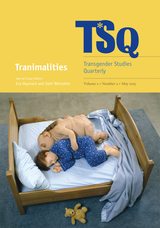 Tranimalities
Eva S. Hayward and Jami Weinstein, special issue editors
Duke University Press If the critical import of this issue of TSQ, “Tranimalities,” can be narrowed to a single focal point, it is that the human/nonhuman distinction is inextricably tied to questions of gender and sexual difference. Issue editors Eva Hayward and Jami Weinstein, along with the authors whose work they have selected for inclusion, collectively argue that to be human has meant taking a position in relation to sexual difference and becoming gendered (the English& it, for example, has no personhood, as opposed to he and& she), while to be forcibly ungendered or to become transgendered renders one's humanness precarious. It can result in one's status being moved toward the not-quite-human, the inhuman, the “mere” animal, or even toward death, toward a purportedly inanimate “gross materiality.” The editors' exquisite introduction, the feature articles, and much of the content in the journal's recurring sections (including Harlan Weaver's contribution to the New Media section, Paige Johnson's film analysis and Anthony Wagner's artist statement in Arts and Culture, and M. Dale Booth's essay on recent scholarship in the Book Review section) all explore the non/human in relation to transgender at an unprecedented level of detail and theoretical sophistication. They plumb philosophical depths that bring transgender studies into conversation with some of the most fundamental questions we can ask about ourselves and the cosmos we experience, and in doing so they help realize the potential originally envisioned for this journal and for the field.
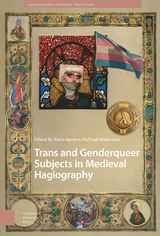 Trans and Genderqueer Subjects in Medieval Hagiography
Alicia Spencer-Hall
Amsterdam University Press, 2021 Trans and Genderqueer Subjects in Medieval Hagiography presents an interdisciplinary examination of trans and genderqueer subjects in medieval hagiography. Scholarship has productively combined analysis of medieval literary texts with modern queer theory – yet, too often, questions of gender are explored almost exclusively through a prism of sexuality, rather than gender identity. This volume moves beyond such limitations, foregrounding the richness of hagiography as a genre integrally resistant to limiting binaristic categories, including rigid gender binaries. The collection showcases scholarship by emerging trans and genderqueer authors, as well as the work of established researchers. Working at the vanguard of historical trans studies, these scholars demonstrate the vital and vitally political nature of their work as medievalists. Trans and Genderqueer Subjects in Medieval Hagiography enables the re-creation of a lineage linking modern trans and genderqueer individuals to their medieval ancestors, providing models of queer identity where much scholarship has insisted there were none, and re-establishing the place of non-normative gender in history.
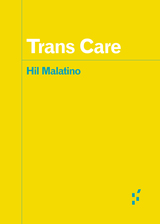 Trans Care
Hil Malatino
University of Minnesota Press, 2020 A radical and necessary rethinking of trans care
What does it mean for trans people to show up for one another, to care deeply for one another? How have failures of care shaped trans lives? What care practices have trans subjects and communities cultivated in the wake of widespread transphobia and systemic forms of trans exclusion? Trans Care is a critical intervention in how care labor and care ethics have been thought, arguing that dominant modes of conceiving and critiquing the politics and distribution of care entrench normative and cis-centric familial structures and gendered arrangements. A serious consideration of trans survival and flourishing requires a radical rethinking of how care operates.
Forerunners is a thought-in-process series of breakthrough digital works. Written between fresh ideas and finished books, Forerunners draws on scholarly work initiated in notable blogs, social media, conference plenaries, journal articles, and the synergy of academic exchange. This is gray literature publishing: where intense thinking, change, and speculation take place in scholarship.
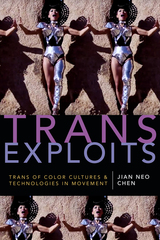 Trans Exploits: Trans of Color Cultures and Technologies in Movement
Jian Neo Chen
Duke University Press, 2019 In Trans Exploits Jian Neo Chen explores the cultural practices created by trans and gender-nonconforming artists and activists of color. They argue for a radical rethinking of the policies and technologies of racial gendering and assimilative social programming that have divided LGBT communities and communities of color along the lines of gender, sexuality, class, immigration status, and ability. Focusing on performance, film/video, literature, digital media, and other forms of cultural expression and activism that track the displaced emergences of trans people of color, Chen highlights the complex and varied responses by trans communities to their social dispossession. Through these responses, trans of color cultural workers such as performance artist Yozmit, writer Janet Mock, and organizer Jennicet Gutiérrez challenge dominating perceptions and institutions that kill, confine, police, and discipline trans people.
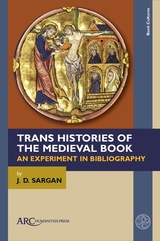 Trans Histories of the Medieval Book: An Experiment in Bibliography
J. D. Sargan
Arc Humanities Press, 2025 Archival collections are political spaces: the decisions that govern whose histories are preserved, when, and by whom are not neutral. They reflect the communities that make them. For most of western history queer, trans, and gender non-conforming people were excluded from such communities. Premodern trans experiences went largely unreported and reconstructing such histories relies on the piecing together of ephemeral glimpses. Literary scholars developed tactics and tools to read through the traces, with hugely generative results that highlight the richness of non-normative premodern genders. But how do we move beyond the limits of the trace to uncover a more expansive history of premodern gender non-conformity? This book takes a methodological approach to the question. An experiment in applying trans approaches to the study of the premodern book offers alternatives both for trans histories and for book historical methods.
Trans Men in Malaysia: Decision-Making, Masculinity and Manhood
Vizla Kumaresan
Amsterdam University Press, 2025 Cutting across the disciplines of trans gender studies and psychology, this book examines the psychological decision-making process behind twenty-three Malaysian trans men’s journeys navigating masculinity from childhood through adulthood. Using interviews and grounded theory methodology, the author analyses how trans men reclaim and redefine a form of resilient masculinity that seeks to divorce itself from patriarchal definitions, done through the exploration of relationships with their identities and de-linking male identity from masculinity. The book examines how trans men redefine their masculinity while maintaining proximity to femininity. Trans men unpack expectations of masculinity from Malaysian perspective on race and gender, to centre their decision-making on their own values and beliefs.
 Trans Philosophy
Perry Zurn
University of Minnesota Press, 2024 Establishing trans philosophy as a unique field of inquiry, offering tools for our quest toward a more just and equitable world Trans Philosophy defines this burgeoning and polymorphous discipline as philosophical work that is accountable to and illuminative of cross-cultural and global trans experiences, histories, and cultural productions. Across language and politics, feminism and phenomenology, and decolonial theory, it addresses trans worldmaking in all its beauty and mundanity. Critically, the editors center the contributions of trans and gender-nonconforming philosophers from around the globe. Showcasing work from a range of emerging and established voices, Trans Philosophy addresses discrimination, embodiment, identity, language, and law, utilizing diverse philosophical methods to attend to significant intersections between trans experience and class, disability, race, nationality, and sexuality. At a time when trans-exclusionary views are gaining traction in politics as well as philosophy, this volume urgently redraws the contours of trans discourse, centering the wisdom already generated in trans and other gender-disruptive communities. Contributors: Megan Burke, Sonoma State U; Robin Dembroff, Yale U; Marie Draz, San Diego State U; Che Gossett, U of Pennsylvania; Ryan Gustafsson, U of Melbourne; Stephanie Kapusta, Dalhousie U; Tamsin Kimoto, Washington U, St. Louis; Hil Malatino, Pennsylvania State U and Rock Ethics Institute; Amy Marvin, Lafayette U; Marlene Wayar. Retail e-book files for this title are screen-reader friendly.
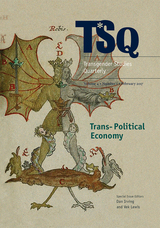 Trans- Political Economy
Dan Irving and Vek Lewis, special issue editors
Duke University Press This issue of TSQ: Transgender Studies Quarterly, “Trans-Political Economy,” edited by Dan Irving and Vek Lewis, addresses how capitalism differentially and unequally affects trans and sex/gender-diverse people across the globe. “We all, from our different social and political locations, become implicated in those architectures through our everyday interactions with a variety of coordinated and contradictory institutions and rationalities that order our lives across different local and global geopolitical spaces and scales,” write Lewis and Irving. The editors of and contributors to this issue reveal how the narrowly constructed objects of trans studies and political economy (such as gender, labor, class, and economy) have been complicit in the necropolitical devaluation of trans lives and existing strategies crafted for trans survival. Topics include trans visibility and commodity culture; trans credit reporting; the growing population of T-girls, trans women truckers; trans street-based sex workers; the system of sex/gender identification for trans asylum seekers in South Africa; and waria affective labor in Indonesia. There is also a roundtable deconstructing trans* political economy. The Arts & Culture section of this issue features a review of season 7 of RuPaul's Drag Race in relation to certain political-economic elements of the drag industry as well as an in-depth look at the representation of transgender lives on film, specifically in Dallas Buyers Club.
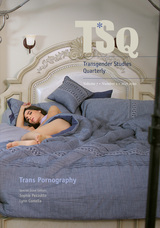 Trans Pornography
Sophie Pezzutto and Lynn Comella, special issue editors
Duke University Press, 2020 For many people, trans or not, pornography is the first point of contact with trans identities, communities, and subcultures. Always a popular niche, demand for trans pornography has significantly risen in recent years. No longer the domain of a handful of small studios, trans porn is now produced by transnational porn empires and is becoming a staple of commercial pornography production. To date, trans studies has not effectively engaged with the topic of trans porn, while pornography scholarship has largely neglected it as a genre of significance. The contributors to this issue—a mix of scholars and industry insiders—fill that gap and provide an overview of this emerging area of inquiry. Articles include an examination of trans micropornography (user-made remixes shared among fans), a history of two pioneers of mainstream trans pornography, and a photo-essay of portraits by Rae Threat.
Contributors
Skylar Adams, Carolyn Bronstein, Lynn Comella, Korra Del Rio, Sly Fawkes, Aster Gilbert, RL Goldberg, Laura Horak, Valentina Mia, Geoffrey H. Nicholson, Sophie Pezzutto, Matt Richardson, Whitney Strub, Rae Threat
 Trans Studies en las Americas
Claudia Sofia Garriga-López, Cole Rizki, and Juana María Rodríguez, special issue editors
Duke University Press Shifting the geopolitics of trans studies, travesti theory is a Latinx American body of work with an extensive transregional history. As a particular body politics, travesti identification is not only a sexed, gendered, classed, and racialized form of relation, but a critical mode and an epistemology. Throughout the Américas, trans and travesti studies take a multiplicity of forms: scholarly work that engages identitarian and anti-identitarian analytical frameworks as well as interventions into state practices, cultural production, and strategic activist actions. These multiple critical approaches—both travesti and trans—are regionally inflected by the flows of people, ideas, technologies, and resources that shape the hemisphere, opening up space to explore the productive tensions and expansive possibilities within this body of work.
This special issue of TSQ prompts a conversation between trans and travesti studies scholars working across the Américas to investigate how shifts in cultural practices, aesthetics, geographies, and languages enliven theories of politics, subjectivity, and embodiment. Contributors to this issue offer a hemispheric perspective on trans and travesti issues to the Anglophone academy, expand transgender studies to engage geopolitical connections, and bring interdisciplinary approaches to topics ranging from policy to cultural production. This issue is an unprecedented English-language collection by Latin American and Latinx scholars on trans and travesti issues.
Contributors. Lino Arruda, Daniel Coleman, Cynthia Citlallin Delgado, El Colectivo del Archivo de la Memoria Trans, Juan Carlos Garrido, Claudia Sofía Garriga-López, Bernadine Hernández, Hillary Hiner, Denilson Lopes, Andrés Lopez, Cole Rizki, Juana María Rodríguez, Oli Rodriguez, Marcia Lucia Machuca Rose, Martín de Mauro Rucovsky, Dora Silva Santana, Susy Shock, Sayak Valencia
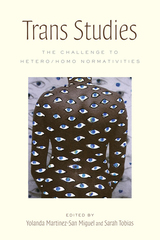 Trans Studies: The Challenge to Hetero/Homo Normativities
Martínez-San Miguel, Yolanda
Rutgers University Press, 2016 Winner of the 2017 Sylvia Rivera Award in Transgender Studies from the Center for LGBTQ Studies (CLAGS)
From Caitlyn Jenner to Laverne Cox, transgender people have rapidly gained public visibility, contesting many basic assumptions about what gender and embodiment mean. The vibrant discipline of Trans Studies explores such challenges in depth, building on the insights of queer and feminist theory to raise provocative questions about the relationships among gender, sexuality, and accepted social norms. Trans Studies is an interdisciplinary essay collection, bringing together leading experts in this burgeoning field and offering insights about how transgender activism and scholarship might transform scholarship and public policy. Taking an intersectional approach, this theoretically sophisticated book deeply grounded in real-world concerns bridges the gaps between activism and academia by offering examples of cutting-edge activism, research, and pedagogy.
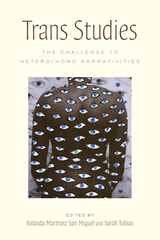 Trans Studies: The Challenge to Hetero/Homo Normativities
Martínez-San Miguel, Yolanda
Rutgers University Press, 2016 Winner of the 2017 Sylvia Rivera Award in Transgender Studies from the Center for LGBTQ Studies (CLAGS)
From Caitlyn Jenner to Laverne Cox, transgender people have rapidly gained public visibility, contesting many basic assumptions about what gender and embodiment mean. The vibrant discipline of Trans Studies explores such challenges in depth, building on the insights of queer and feminist theory to raise provocative questions about the relationships among gender, sexuality, and accepted social norms. Trans Studies is an interdisciplinary essay collection, bringing together leading experts in this burgeoning field and offering insights about how transgender activism and scholarship might transform scholarship and public policy. Taking an intersectional approach, this theoretically sophisticated book deeply grounded in real-world concerns bridges the gaps between activism and academia by offering examples of cutting-edge activism, research, and pedagogy.
 Transacting as Art, Design and Architecture: A Non-Commercial Market
Edited by Marsha Bradfield, Cinzia Cremona, Amy McDonnell, and Eva Sajovic
Intellect Books, 2021 An interdisciplinary anthology exploring alternatives to the principles of commercial markets that dominate contemporary life.
The essays in this volume apply an experimental ethos to collaborative cultural production. Expanding the fields of art, design, and architectural research, contributors provide critical reflection on collaborative practice-based research. The volume builds on a pop-up market hosted by the London-based arts cluster Critical Practice that sought to creatively explore existing structures of evaluation and actively produce new ones. Assembled by lead editor Marsha Bradfield, the essays contextualize the event within London’s long history of marketplaces, offer reflections from the stallholders, and celebrate its value system, particularly its critique of econometrics. A glossary rounds off the text and opens up the publication as a resource.
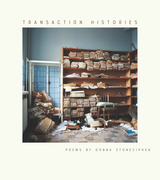 Transaction Histories
Donna Stonecipher
University of Iowa Press, 2018 Reveling in the paradox of the formal prose poem, Donna Stonecipher’s Transaction Histories gathers together six series of poems that explore the disobedient incongruities of aesthetics and emotions. Stonecipher’s carefully sculpted forms and exacting language are held in tension with an unruly imagination to provoke a vision of experience densely layered with bodies impinging upon and altering each other, engaging in transactions that unfold in poetically complex and emotionally startling ways. By turns wry and melancholic, playful and acerbic, erotically charged and politically skeptical, Stonecipher’s poems marry a deeply felt lyricism to a fascination with the mechanisms of narrative. The result is akin to Roland Barthes’s notion of “the novelistic”: writing that flirts with the gestures and spaces of the novel without the trappings of plot, character, or action. Narrative fragments dart in and out of sight, spectral figures and motifs recur in fugal patterns, and habits of ruthless observation are brought to bear on the details of both intimate life and social organization. Stonecipher lays claim to a stylistic achievement and vision that are entirely her own, transparent and elusive, casual in address and rigorous in design. Whether training its eye on fetishized polar bears, illegal garbage dumping, or ideological debates around rose chintz wallpaper, Transaction Histories tracks the fitful and tragicomic relationships that exist among objects, landscapes, texts, and people, and lays bare the ways in which our transactions keep our lives going.
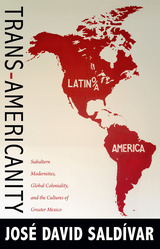 Trans-Americanity: Subaltern Modernities, Global Coloniality, and the Cultures of Greater Mexico
José David Saldívar
Duke University Press, 2012 A founder of U.S.-Mexico border studies, José David Saldívar is a leading figure in efforts to expand the scope of American studies. In Trans-Americanity, he advances that critical project by arguing for a transnational, antinational, and "outernational" paradigm for American studies. Saldívar urges Americanists to adopt a world-system scale of analysis. "Americanity as a Concept," an essay by the Peruvian sociologist Aníbal Quijano and Immanuel Wallerstein, the architect of world-systems analysis, serves as a theoretical touchstone for Trans-Americanity. In conversation not only with Quijano and Wallerstein, but also with the theorists Gloria Anzaldúa, John Beverley, Ranajit Guha, Walter D. Mignolo, and Gayatri Chakravorty Spivak, Saldívar explores questions of the subaltern and the coloniality of power, emphasizing their location within postcolonial studies. Analyzing the work of José Martí, Sandra Cisneros, Toni Morrison, Arundhati Roy, and many other writers, he addresses concerns such as the "unspeakable" in subalternized African American, U.S. Latino and Latina, Cuban, and South Asian literature; the rhetorical form of postcolonial narratives; and constructions of subalternized identities. In Trans-Americanity, Saldívar demonstrates and makes the case for Americanist critique based on a globalized study of the Américas.
 Transanything: Essays
Ever Jones
Northwestern University Press, 2025 A debut essay collection that upends our notions of loneliness, wilderness, and liberation
Transanything reveals a world in metamorphosis. A hermit crab retires its shell, lovers drift apart, and seasons churn, all amid Ever Jones’s own narrative of midlife gender transition.
Jones takes up a tradition of writing—about the American landscape, solitude, wilderness, and the West—long intertwined with colonialism and heteropatriarchy, and makes it wholly their own. A self-proclaimed “nature essay” misbehaves, wandering away from the hummingbird outside Jones’s window. In their chronicle of a week in Yellowstone, Jones navigates trails frequented by grizzlies and a campground where their identity is regarded as equally dangerous. Elk, bison, and bark spiders roam this book’s pages, but it is the gray wolf—the embattled apex predator of the American West, narrow survivor of settler colonial violence, and vessel for American myths of independence—who emerges as Jones’s shapeshifting coprotagonist.
Taking on a global web of colonial systems that seek to divide us, Jones disrupts loneliness and forges space for queerness and transness to be aliveness—to be transanything.
 Transatlantic Central Europe: Contesting Geography and Redifining Culture beyond the Nation
Jessie Labov
Central European University Press, 2019 While there are still occasional uses of it today, the term "Central Europe" carries little of the charge that it did in the 1980s and early 1990s, and as a political and intellectual project it has receded from the horizon. Proponents of a distinct cultural profile of these countries—all involved now in the process of Transatlantic integration—used "Central European", as a contestation with the geo-political label of Eastern Europe. This book discusses the transnational set of practices connecting journals with other media in the mid-1980s, disseminating the idea of Central Europe simultaneously in East and West. A range of new methodologies, including GIS-mapping visualization, is used, repositing the political-cultural journal as one central node of a much larger cultural system. What has happened to the liberal humanist philosophy that "Central Europe" once evoked? In the early years of the transition era, the liberal humanist perspective shared by Havel, Konrád, Kundera, and Michnik was quickly replaced by an economic liberalism that evolved into neoliberal policies and practices. The author follows the trajectories of the concept into the present day, reading its material and intellectual traces in the postcommunist landscape. She explores how the current use of transnational, web-based media follows the logic and practice of an earlier, 'dissident' generation of writers.
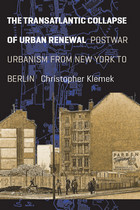 The Transatlantic Collapse of Urban Renewal: Postwar Urbanism from New York to Berlin
Christopher Klemek
University of Chicago Press, 2011 The Transatlantic Collapse of Urban Renewal examines how postwar thinkers from both sides of the Atlantic considered urban landscapes radically changed by the political and physical realities of sprawl, urban decay, and urban renewal. With a sweep that encompasses New York, London, Berlin, Philadelphia, and Toronto, among others, Christopher Klemek traces changing responses to the challenging issues that most affected the lives of the world’s cities.
In the postwar decades, the principles of modernist planning came to be challenged—in the grassroots revolts against the building of freeways through urban neighborhoods, for instance, or by academic critiques of slum clearance policy agendas—and then began to collapse entirely. Over the 1960s, several alternative views of city life emerged among neighborhood activists, New Left social scientists, and neoconservative critics. Ultimately, while a pessimistic view of urban crisis may have won out in the United States and Great Britain, Klemek demonstrates that other countries more successfully harmonized urban renewal and its alternatives. Thismuch anticipated book provides one of the first truly international perspectives on issues central to historians and planners alike, making it essential reading for anyone engaged with either field.
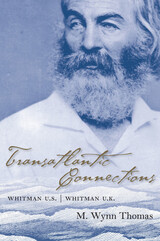 Transatlantic Connections: Whitman U.S., Whitman U.K.
Thomas, M. Wynn
University of Iowa Press, 2005 In this series of textual readings and cultural comparisons, M. Wynn Thomas explores Whitman’s amazing ability to appeal across distances and centuries.
The book’s contrasting sections reflect the two locations studied: the first shows Whitman in his time and place, while the second repositions him within the cultures of England and Wales from the late 19th to the late 20th century. In the opening chapter he is placed against the vivid, outrageous background of the New York of his time; the second finds evidence in his poetry of a critique of the new urban politics of the emerging city boss; the third radically redefines Whitman's relationship to his famous contemporary Longfellow. Other chapters deal with the Civil War poet, exploring the ways in which his poetic responses were in part shaped by his relationship to his soldier brother George, and his use of the meteorological discoveries of his day to fashion metaphors for imaging the different phases of the conflict.
The second section ponders the paradox that this Whitman, who was so much the product of his specific time and limited “local” culture, should come to be accepted as an international visionary. The United Kingdom is taken as offering striking instances of this phenomenon, and his transatlantic admirers are shown to have been engaged in an unconscious process of “translating” Whitman into the terms of their own culturally specific social, political, and sexual preoccupations. Some of the connections explored are those between Whitman and Edward Carpenter, the so-called English Whitman; between Whitman and perhaps his greatest English critic, D. H. Lawrence; and between Whitman and the Welsh poets Ernest Rhys, Amanwy (David Rees Griffiths), Niclas y Glais (T. E. Nicholas), Waldo Williams, Glyn Jones, Dylan Thomas, and R. S. Thomas.
This bold and original study, offering new points of entry into understanding Whitman as the product of his time and place as well as understanding the reception of Whitman in the U.K. as a process of cultural translation, should fascinate scholars of Whitman and students of comparative literature.
 The Transatlantic Constitution: Colonial Legal Culture and the Empire
Mary Sarah Bilder
Harvard University Press, 2008 Departing from traditional approaches to colonial legal history, Mary Sarah Bilder argues that American law and legal culture developed within the framework of an evolving, unwritten transatlantic constitution that lawyers, legislators, and litigants on both sides of the Atlantic understood. The central tenet of this constitution—that colonial laws and customs could not be repugnant to the laws of England but could diverge for local circumstances—shaped the legal development of the colonial world.
Focusing on practices rather than doctrines, Bilder describes how the pragmatic and flexible conversation about this constitution shaped colonial law: the development of the legal profession; the place of English law in the colonies; the existence of equity courts and legislative equitable relief; property rights for women and inheritance laws; commercial law and currency reform; and laws governing religious establishment. Using as a case study the corporate colony of Rhode Island, which had the largest number of appeals of any mainland colony to the English Privy Council, she reconstructs a largely unknown world of pre-Constitutional legal culture.
 Transatlantic Conversations: Nineteenth-Century American Women’s Encounters with Italy and the Atlantic World
Beth L. Lueck
University of New Hampshire Press, 2017 This unique interdisciplinary essay collection offers a fresh perspective on the active involvement of American women authors in the nineteenth-century transatlantic world. Internationally diverse contributors explore topics ranging from women's social and political mobility to their authorship and activism. While a number of essays focus on such well-known writers as Margaret Fuller, Catharine Maria Sedgwick, Harriet Beecher Stowe, George Eliot, Louisa May Alcott, and Charlotte Perkins Gilman, other, perhaps lesser-known authors are also included, such as E. D. E. N. Southworth, Elizabeth Stuart Phelps, Elizabeth Peabody, Jeannette Hart, and Laura Richards.
These essays show the spectrum of interests and activities in which nineteenth-century women were involved as they moved, geographically and metaphorically, toward gaining their independence and the right to control their lives. Traveling far and wide—to Italy, France, Great Britain, and the Bahamas—these writers came into contact with realities far different from their own. On topics ranging from homeopathy and literary endeavors to politics and revolution, they conversed with others, reaching and inspiring transnational audiences with their words and deeds, and creating a space for self-expression in the rapidly changing transatlantic world.
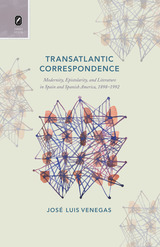 Transatlantic Correspondence: Modernity, Epistolarity, and Literature in Spain and Spanish America, 1898–1992
José Luis Venegas
Ohio State University Press, 2014 Transatlantic Correspondence: Modernity, Epistolarity, and Literature in Spain and Spanish America, 1898–1992 by José Luis Venegas explores how influential Spanish and Spanish American writers used letters in their literary works to formulate distinctive visions of modernity. Bringing into the discussion authors such as Rubén Darío, Miguel de Unamuno, Carmen Martín Gaite, and Gabriel García Márquez, Venegas reveals unsuspected connections between the authors’ literary use of epistolary writing and their opinions about the place of Hispanic culture and civilization within a global context. Transatlantic Correspondence contributes to broader debates on literary transnationalism and the contradictory nature of modernity.
Each chapter frames literary works by authors from both sides of the Atlantic within key historical events spanning the loss of Spain’s overseas possessions in 1898 to the commemoration of Columbus’s quincentennial in 1992. This broad range of historical reference is counterpointed by the nuanced examination of a single formal feature in a wide variety of canonical and non-canonical texts. Drawing on insights from postcolonial studies, the book addresses the link between historical transformations that traverse decades and continents and specific stylistic choices in order to foster an understanding of Hispanic literary and cultural studies that is not limited by categories such as “movement,” “generation,” and “national literature.”
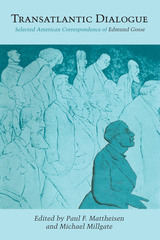 Transatlantic Dialogue: Selected American Correspondence of Edmund Gosse
Edited by Paul F. Mattheisen and Michael Millgate
University of Texas Press, 1965 The mauve life and times of Edmund Gosse glow warmly in these letters, delightful to even the most casual reader, engrossing to one with an interest in the distinguished correspondents or in the late-Victorian and Edwardian eras. An obscure figure today to all but literary connoisseurs, Gosse was, in his day, a near giant in both England and the United States. Max Beerbohm, that discriminating man, in a mural of prominent figures who were also his friends, sketched Edmund Gosse large among George Bernard Shaw, John Masefield, G. K. Chesterton, John Galsworthy, and Lytton Strachey. This volume consists primarily of a selection of the letters exchanged between Gosse and a number of American writers, notably William Dean Howells, Edmund Clarence Stedman, Oliver Wendell Holmes, Richard Watson Gilder, Edith Wharton, and Henry James. The letters, most of them previously unpublished, contain much of biographical and general historical interest, but the main theme of the book is the exploration of Anglo-American literary relations during the last quarter of the nineteenth century and the early years of the twentieth. The letters that passed between Gosse and Stedman provide valuable evidence for the study of literary taste on the two sides of the Atlantic and also show how each man sought to enhance the other's transatlantic reputation; the correspondence between Gosse and Gilder, particularly during the period when Gosse was London editor of Gilder's Century magazine, is especially revealing of cultural attitudes and antagonisms. A central thread is provided by the warm and long-sustained friendship between Gosse and Howells, the leading American man of letters of his day. The long introduction to the book deals with such topics as Gosse's American reputation, his immensely successful visit to the United States in the winter of 1884–1885 (based on the manuscript diary that Gosse kept during the visit), and his American friendships, with particular attention to the relationship with Howells. The thoroughness and vitality of the annotation are extremely effective in familiarizing the reader with the people and events in the book.
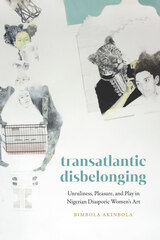 Transatlantic Disbelonging: Unruliness, Pleasure, and Play in Nigerian Diasporic Women's Art
Bimbola Akinbola
Duke University Press, 2025 In Transatlantic Disbelonging, Bimbola Akinbola redirects the focus in diaspora studies from questions of loss and longing to acts of unapologetic self-definition through the study of Nigerian diasporic women artists navigating disparate geographies, allegiances, and identities. Drawing on the work of contemporary visual and performance artists, experimental filmmakers, and writers—including Wura-Natasha Ogunji, Njideka Akunyili Crosby, Zina Saro-Wiwa, ruby onyinyechi amanze, and Nnedi Okorafor—Akinbola articulates how these artists use their experiences as cultural outsiders to redefine home and national belonging on their own terms. Taking a capacious interdisciplinary approach, she explores how these women employ anti-respectability, taboo, the erotic, and play to challenge oppressive colonial legacies and expectations pertaining to gender and morality. For the artists in this book, their artmaking is a form of homemaking that embraces ambivalence and reinvents alienation as possibility. Theorizing these practices as acts of “disbelonging,” Akinbola radically reimagines diasporic identity formation, illustrating how artists use creative practices to enact and embody belonging and community in expansive ways.
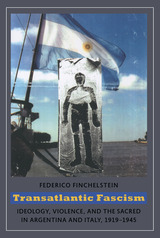 Transatlantic Fascism: Ideology, Violence, and the Sacred in Argentina and Italy, 1919-1945
Federico Finchelstein
Duke University Press, 2010 In Transatlantic Fascism, Federico Finchelstein traces the intellectual and cultural connections between Argentine and Italian fascisms, showing how fascism circulates transnationally. From the early 1920s well into the Second World War, Mussolini tried to export Italian fascism to Argentina, the “most Italian” country outside of Italy. (Nearly half the country’s population was of Italian descent.) Drawing on extensive archival research on both sides of the Atlantic, Finchelstein examines Italy’s efforts to promote fascism in Argentina by distributing bribes, sending emissaries, and disseminating propaganda through film, radio, and print. He investigates how Argentina’s political culture was in turn transformed as Italian fascism was appropriated, reinterpreted, and resisted by the state and the mainstream press, as well as by the Left, the Right, and the radical Right. As Finchelstein explains, nacionalismo, the right-wing ideology that developed in Argentina, was not the wholesale imitation of Italian fascism that Mussolini wished it to be. Argentine nacionalistas conflated Catholicism and fascism, making the bold claim that their movement had a central place in God’s designs for their country. Finchelstein explores the fraught efforts of nationalistas to develop a “sacred” ideological doctrine and political program, and he scrutinizes their debates about Nazism, the Spanish Civil War, imperialism, anti-Semitism, and anticommunism. Transatlantic Fascism shows how right-wing groups constructed a distinctive Argentine fascism by appropriating some elements of the Italian model and rejecting others. It reveals the specifically local ways that a global ideology such as fascism crossed national borders.
 Transatlantic Gender Crossings
Anne Emmanuelle Berger and Éric Fassin, special issue editors
Duke University Press, 2016 A special issue of differences: A Journal of Feminist Cultural Studies
As much as French feminism influenced the establishment of women’s studies in U.S. universities, so has U.S. gender and queer theory marked the French intellectual and academic landscape. For this reason, gender and sexuality studies have been bound up from the beginning with specific intractable questions of internationalization. Has internationalization contributed to an “Americanization” of the field, or has it allowed for different ways of understanding the connections between the local and the global, the center and the periphery? And how might institutionalization and internationalization affect our thinking about the political and theoretical intersections between gender and sexuality or between sex and race? Contributors from Europe and the United States consider theoretical, political, and institutional questions raised by the transatlantic exchange of feminist theories over four decades.
Contributors
Anne Emmanuelle Berger, Éric Fassin, Delphine Gardey, Clare Hemmings, Ranjana Khanna, Griselda Pollock, Tuija Pulkkinen, Elizabeth Weed
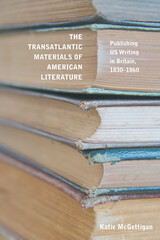 The Transatlantic Materials of American Literature: Publishing US Writing in Britain, 1830–1860
Katie McGettigan
University of Massachusetts Press, 2023 During the antebellum period, British publishers increasingly brought out their own authorized and unauthorized editions of American literary works as the popularity of print exploded and literacy rates grew. Playing a formative role in the shaping of American literature, the industry championed the work of US-based writers, highlighted the cultural value of American literary works, and intervened in debates about the future of American literature, authorship, and print culture. The Transatlantic Materials of American Literature examines the British editions of American fiction, poetry, essays, and autobiographies from writers like Edgar Allan Poe, Harriet Beecher Stowe, Frederick Douglass, and Hannah Flagg Gould. Putting these publications into historical context, Katie McGettigan considers key issues of the day, including developments in copyright law, changing print technologies, and the financial considerations at play for authors and publishers. This innovative study also uncovers how the transatlantic circulation of these works exposed the racial violence and cultural nationalism at the heart of the American experiment, producing overlapping and competing visions of American nationhood in the process.
 Transatlantic Policymaking in an Age of Austerity: Diversity and Drift
Martin A. Levin and Martin Shapiro, Editors
Georgetown University Press, 2004 Transatlantic Policymaking in an Age of Austerity integrates the study of politics and public policy across a broad spectrum of regulatory and social welfare policies in the United States and several nations of Western Europe. The editors and a sterling list of contributors look at policymaking in the 1990s through the present—providing a comparative politics framework—stressing both parallel development and the differences between and among the nations. Similar prevailing ideas and political factors can be identified and transatlantic comparisons made—providing for a clearer understanding of the policymaking process. Faith in regulated markets and the burden of rising welfare costs are concerns found on both sides of the Atlantic. Western democracies also share political climates colored by economic austerity; low trust in government, pressures from interest groups, and a sharply divided electorate. Because of differing political processes and differing policy starting points, a variety of disparate policy decisions have resulted. Real world policymaking in the areas of welfare, health, labor, immigration reform, disability rights, consumer and environmental regulation, administrative reforms, and corporate governance are compared. Ultimately, the last decade is best characterized as one of "drift," sluggish changes with little real innovation and much default to the private sector. In general, policymakers on both sides of the ocean, constrained by economic necessity, have been unable to produce policy outcomes that satisfy the key segments of the electorate. The contributors examine the United States, Great Britain, France, and Germany, as well as a number of other European countries, and study the European Union itself as a policymaking institution. Transatlantic Policymaking in an Age of Austerity distills the prominent issues, politics, and roles played by governmental institutions into a new understanding of the dynamics of policymaking in and among transatlantic nations.
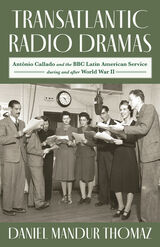 Transatlantic Radio Dramas: Antonio Callado and the BBC Latin American Service During World War II
Thomaz Mandur
University of Pittsburgh Press, 2023 Fills the Gaps of an Important Modernist Brazilian Writer’s Early Career and Illuminates Recurring Themes of His Later Works
The BBC Latin American Service was created in 1938, funded by the British Ministry of Information, to counter fascist propaganda broadcast to Latin America. Now considered one of the major Latin American novelists of the twentieth century, Brazilian writer Antônio Callado (1917–1997) got his start writing radio drama scripts for the BBC LAS during and after World War II. Largely forgotten until Daniel Mandur Thomaz collected them in a 2018 volume published in Brazil, these radio scripts were propaganda in their own right and were part of a concerted effort to win sympathy for Britain and the Allies in Latin America. They reveal how Callado’s experiences during the war influenced his writing and had a critical impact on themes he would revisit consistently throughout his literary career. Transatlantic Radio Dramas analyzes the scripts themselves, but also examines the institutions, material practices, and beliefs that allowed modernist transatlantic networks like the BBC LAS to flourish.
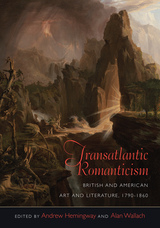 Transatlantic Romanticism: British and American Art and Literature, 1790-1860
Andrew Hemingway
University of Massachusetts Press, 2014 That the Romantic movement was an international phenomenon is a commonplace, yet to date, historical study of the movement has tended to focus primarily on its national manifestations. This volume offers a new perspective. In thirteen chapters devoted to artists and writers of the late eighteenth and early nineteenth centuries, leading scholars of the period examine the international exchanges that were crucial for the rise of Romanticism in England and the United States.
In the book's introduction, Andrew Hemingway—building on the theoretical work of Michael Lowy and Robert Sayre—proposes that we need to remobilize the concept of Weltanschauung, or comprehensive worldview, in order to develop the kind of synthetic history of arts and ideas the phenomenon of Romanticism demands. The essays that follow focus on the London and New York art worlds and such key figures as Benjamin West, Thomas Bewick, John Vanderlyn, Washington Allston, John Martin, J. M. W. Turner, Thomas Cole, James Fenimore Cooper, George Catlin, Edgar Allan Poe, Harriet Beecher Stowe, and Herman Melville. Taken together, these essays plot the rise of a romantic anti-capitalist Weltanschauung as well as the dialectic between Romanticism's national and international manifestations.
In addition to the volume editors, contributors include Matthew Beaumont, David Bindman, Leo Costello, Nicholas Grindle, Wayne Franklin, Janet Koenig, William Pressly, Robert Sayre, William Truettner, Dell Upton, and William Vaughan.
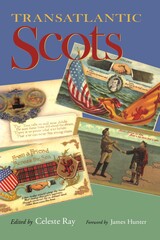 Transatlantic Scots
Edited by Celeste Ray, foreword by James Hunter
University of Alabama Press, 2005 Examines the impact of the Scottish legacy on North American cultures and heritage During the past four decades, growing interest in North Americans' cultural and ancestral ties to Scotland has produced hundreds of new Scottish clan and heritage societies. Well over 300 Scottish Highland games and gatherings annually take place across the U.S. and Canada.
Transatlantic Scots is a multidisciplinary collection that studies the regional organization and varied expressions of the Scottish Heritage movement in the Canadian Maritimes, the Great Lakes, New England, and the American South. From diverse perspectives, authorities in their fields consider the modeling of a Scottish identity that distances heritage celebrants from prevalent visions of whiteness. Considering both hyphenated Scots who celebrate centuries-old transmission of Scottish traditions and those for whom claiming or re-claiming a Scottish identity is recent and voluntary, this book also examines how diaspora themes and Highland imagery repeatedly surface in regional public celebrations and how traditions are continually reinvented through the accumulation of myths. The underlying theoretical message is that ethnicity and heritage survive because of the flexibility of history and tradition.
This work is a lasting contribution to the study of ethnicity and identity, the renegotiation of history and cultural memory into heritage, and the public performance and creation of tradition.
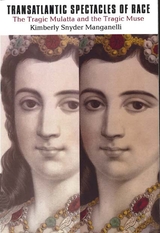 Transatlantic Spectacles of Race: The Tragic Mulatta and the Tragic Muse
Manganelli, Kimberly Snyder
Rutgers University Press, 2012 The tragic mulatta was a stock figure in nineteenth-century American literature, an attractive mixed-race woman who became a casualty of the color line. The tragic muse was an equally familiar figure in Victorian British culture, an exotic and alluring Jewish actress whose profession placed her alongside the “fallen woman.” In Transatlantic Spectacles of Race, Kimberly Manganelli argues that the tragic mulatta and tragic muse, who have heretofore been read separately, must be understood as two sides of the same phenomenon. In both cases, the eroticized and racialized female body is put on public display, as a highly enticing commodity in the nineteenth-century marketplace. Tracing these figures through American, British, and French literature and culture, Manganelli constructs a host of surprising literary genealogies, from Zelica to Daniel Deronda, from Uncle Tom’s Cabin to Lady Audley’s Secret. Bringing together an impressive array of cultural texts that includes novels, melodramas, travel narratives, diaries, and illustrations, Transatlantic Spectacles of Race reveals the value of transcending literary, national, and racial boundaries.
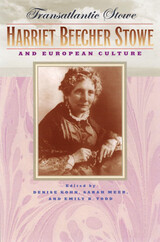 Transatlantic Stowe: Harriet Beecher Stowe and European Culture
Denise Kohn
University of Iowa Press, 2006 Uncle Tom’s Cabin broke publishing records and made Harriet Beecher Stowe in her time one of the world’s most famous authors. The book was a bestseller in Britain and was translated into some forty languages. Yet today Stowe tends to be seen wholly in the context of American literary history. Transatlantic Stowe: Harriet Beecher Stowe and European Culture is the first book to consider multiple aspects of Stowe’s career in an international context. The groundbreaking essays of Transatlantic Stowe examine the author’s literary and literal forays in Europe and the ways in which intellectual and cultural exchanges between the Old and New Worlds shaped her work. It was a crucial moment in the transatlantic discourse, a turning of the tide, and Stowe was among the first American novelists to be lionized in Europe---and pirated by publishers---in the same way that European writers had been treated in America.Blending historical and cultural criticism and drawing on fresh primary material from London and Paris, Transatlantic Stowe includes essays exploring Stowe’s relationship with European writers and the influence of her European travels on her work, especially the controversial travel narrative Sunny Memories of Foreign Lands and her “Italian novel” Agnes of Sorrento.Interdisciplinary and itself transatlantic, the collection discusses visual art and material culture as well as literature and politics and includes contributions from Britain, Ireland, and the United States. Together these essays offer new interpretations of Stowe’s most popular novel as well as new readings of her many other works, illuminate the myriad connections between Stowe and European writers, and thus rewrite literary history by returning Stowe to the larger political, historical, and literary contexts of nineteenth-century Europe.
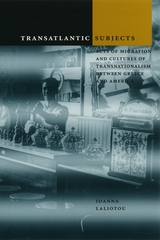 Transatlantic Subjects: Acts of Migration and Cultures of Transnationalism between Greece and America
Ioanna Laliotou
University of Chicago Press, 2004 The early twentieth century was marked by massive migration of southern Europeans to the United States. Transatlantic Subjects views this diaspora through the lens of Greek migrant life to reveal the emergence of transnational forms of subjectivity.
According to Ioanna Laliotou, cultural institutions and practices played an important role in the formation of migrant subjectivities. Reconstructing the cultural history of migration, her book points out the relationship between subjectivity formation and cultural practices and performances, such as publishing, reading, acting, storytelling, consuming, imitating, parading, and traveling. Transatlantic Subjects then locates the development of these practices within key sites and institutions of cultural formation, such as migrant and fraternal associations, educational institutions, state agencies and nongovernmental organizations, mental institutions, coffee shops, the church, steamship companies, banks, migration services, and chambers of commerce.
Ultimately, Laliotou explores the complex and situational entanglements of migrancy, cultural nationalism, and the politics of self. Reading against the grain of hegemonic narratives of cultural and migration histories, she reveals how migrancy produced distinctive forms of sociality during the first half of the twentieth century.
 Transatlantic Theory Transfer: Missed Encounters?
Andreas Huyssen and Anson Rabinbach, special issue editors
Duke University Press, 2017 This issue explores how intellectual theories migrate from Germany to the United States, asking what makes one theory compatible with and successful in the new society while others have little impact. Avoiding the obvious successes (from Marx to the Frankfurt School) and failures (authors whose translated works have had no effect on intellectual life in the United States), contributors investigate complicated cases in which the US reception was not particularly intense. The examples of Hans Blumenberg, Friedrich Kittler, Reinhardt Koselleck, Siegfried Kracauer, Niklas Luhmann, Alexander Mitscherlich, and Gershom Scholem prompt questions about the importance of clear translations, the effects of the publishing business on dissemination, the transformations that theoretical work undergoes as it moves from its original contexts to new ones, and the role of disciplines and interdisciplinarity in shaping a theory's reception.
Contributors. Yaacob Dweck, Philipp Felsch, Paul Fleming, Dagmar Herzog, Stefan-Ludwig Hoffmann, Andreas Huyssen, Martin Jay, Anna Kinder, Joe Paul Kroll, Anson Rabinbach, William Rasch, Johannes von Moltke, Geoffrey Winthrop-Young, Robert Zwarg
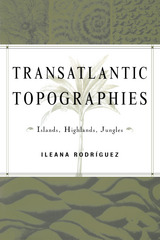 Transatlantic Topographies: Islands, Highlands, Jungles
Ileana Rodriguez
University of Minnesota Press, 2004 Explores the construction of the Americas by and through European eyes Transatlantic Topographies was first published in 2004. Minnesota Archive Editions uses digital technology to make long-unavailable books once again accessible, and are published unaltered from the original University of Minnesota Press editions. Transatlantic Topographies studies the representation of American space during the initial confrontation between Europeans and Amerindians and during the eighteenth, nineteenth, and twentieth centuries. Starting from topographical descriptions of land, islands, highlands, and jungles, Ileana Rodríguez shows how existing systems of knowledge broke down with the discovery of the Americas and had to be reinvented through the interpretation of signs, the accumulation of evidence, material exchange, and, finally, through the learning, teaching, and “kidnapping” of language. Proceeding from the period of exploration to the modern creation of a “twentieth-century frontier,” Rodríguez charts the path that led from island paradise to jungle chaos, from representations of natural beauty to the racialization of the islands. Drawing attention to cross-cultural miscommunication and the riddles of meaning and message it produces, Transatlantic Topographies develops a highly nuanced understanding of the evolving forces of imperialism as they gave way to postcolonialism and then to transnationalism—and newly re-inscribed notions of imperial economic practices.
Transatlantic Women: Nineteenth-Century American Women Writers and Great Britain
Beth L. Lueck
University of New Hampshire Press, 2012 In this volume, fifteen scholars from diverse backgrounds analyze American women writers’ transatlantic exchanges in the nineteenth century. They show how women writers (and often their publications) traveled to create or reinforce professional networks and identities, to escape strictures on women and African Americans, to promote reform, to improve their health, to understand the workings of other nations, and to pursue cultural and aesthetic education. Presenting new material about women writers’ literary friendships, travels, reception and readership, and influences, the volume offers new frameworks for thinking about transatlantic literary studies.
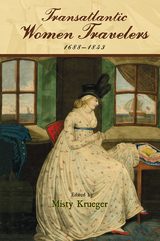 Transatlantic Women Travelers, 1688-1843
Misty Krueger
Bucknell University Press, 2021 This important new collection explores representations of late seventeenth- through mid-nineteenth-century transatlantic women travelers across a range of historical and literary works. While at one time transatlantic studies concentrated predominantly on men’s travels, this volume highlights the resilience of women who ventured voluntarily and by force across the Atlantic—some seeking mobility, adventure, knowledge, wealth, and freedom, and others surviving subjugation, capture, and enslavement. The essays gathered here concern themselves with the fictional and the historical, national and geographic location, racial and ethnic identities, and the configuration of the transatlantic world in increasingly taught texts such as The Female American and The Woman of Colour, as well as less familiar material such as Merian’s writing on the insects of Surinam and Falconbridge’s travels to Sierra Leone. Intersectional in its approach, and with an afterword by Eve Tavor Bannet, this essential collection will prove indispensable as it provides fresh new perspectives on transatlantic texts and women’s travel therein across the long eighteenth century.
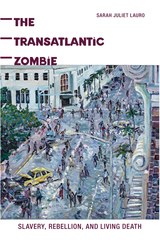 The Transatlantic Zombie: Slavery, Rebellion, and Living Death
Sarah Juliet Lauro
Rutgers University Press, 2015 Our most modern monster and perhaps our most American, the zombie that is so prevalent in popular culture today has its roots in African soul capture mythologies. The Transatlantic Zombie provides a more complete history of the zombie than has ever been told, explaining how the myth’s migration to the New World was facilitated by the transatlantic slave trade, and reveals the real-world import of storytelling, reminding us of the power of myths and mythmaking, and the high stakes of appropriation and homage. Beginning with an account of a probable ancestor of the zombie found in the Kongolese and Angolan regions of seventeenth-century Africa and ending with a description of the way, in contemporary culture, new media are used to facilitate zombie-themed events, Sarah Juliet Lauro plots the zombie’s cultural significance through Caribbean literature, Haitian folklore, and American literature, film, and the visual arts. The zombie entered US consciousness through the American occupation of Haiti, the site of an eighteenth-century slave rebellion that became a war for independence, thus making the figuration of living death inseparable from its resonances with both slavery and rebellion. Lauro bridges African mythology and US mainstream culture by articulating the ethical complications of the zombie as a cultural conquest that was rebranded for the American cinema. As The Transatlantic Zombie shows, the zombie is not merely a bogeyman representing the ills of modern society, but a battleground over which a cultural war has been fought between the imperial urge to absorb exotic, threatening elements, and the originary, Afro-diasporic culture’s preservation through a strategy of mythic combat.
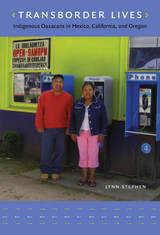 Transborder Lives: Indigenous Oaxacans in Mexico, California, and Oregon
Lynn Stephen
Duke University Press, 2007 Lynn Stephen’s innovative ethnography follows indigenous Mexicans from two towns in the state of Oaxaca—the Mixtec community of San Agustín Atenango and the Zapotec community of Teotitlán del Valle—who periodically leave their homes in Mexico for extended periods of work in California and Oregon. Demonstrating that the line separating Mexico and the United States is only one among the many borders that these migrants repeatedly cross (including national, regional, cultural, ethnic, and class borders and divisions), Stephen advocates an ethnographic framework focused on transborder, rather than transnational, lives. Yet she does not disregard the state: She assesses the impact migration has had on local systems of government in both Mexico and the United States as well as the abilities of states to police and affect transborder communities. Stephen weaves the personal histories and narratives of indigenous transborder migrants together with explorations of the larger structures that affect their lives. Taking into account U.S. immigration policies and the demands of both commercial agriculture and the service sectors, she chronicles how migrants experience and remember low-wage work in agriculture, landscaping, and childcare and how gender relations in Oaxaca and the United States are reconfigured by migration. She looks at the ways that racial and ethnic hierarchies inherited from the colonial era—hierarchies that debase Mexico’s indigenous groups—are reproduced within heterogeneous Mexican populations in the United States. Stephen provides case studies of four grass-roots organizations in which Mixtec migrants are involved, and she considers specific uses of digital technology by transborder communities. Ultimately Stephen demonstrates that transborder migrants are reshaping notions of territory and politics by developing creative models of governance, education, and economic development as well as ways of maintaining their cultures and languages across geographic distances.
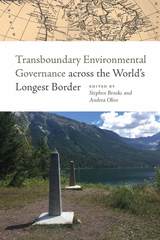 Transboundary Environmental Governance across the World's Longest Border
Stephen Brooks
Michigan State University Press, 2018 Canada and the United States share a border that spans several of the world’s major watersheds and encompasses the largest reserves of fresh water on the planet. The border that separates these two neighbors is political, but the natural environment is a matter of common concern. In recent years, dramatic changes have taken place in the political and environmental landscapes that shape the conversations, possibilities, and processes associated with the management of this shared interest. More than ever, Indigenous populations are recognized to be a necessary part of negotiations and decision-making regarding matters ranging from pipelines to the protection of endangered species’ habitats. Globalization and, in particular, the continuing elaboration of a transnational conversation and architecture for addressing issues related to climate change have ramifications for Canada-US transboundary issues. The contributors to this volume examine the state of the existing transboundary relationship between Canada and the United States, including the governance structures and processes, the environmental impacts and adequacy of these structures and processes, and the opportunities and obstacles that exist for reform and improved outcomes.
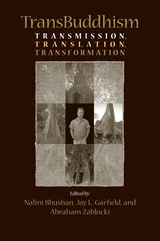 TransBuddhism: Transmission, Translation, and Transformation
Nalini Bhushan
University of Massachusetts Press, 2009 The global spread of Buddhism is giving rise to new forms of religious complexity, both in the West and in Asia. This collection of essays examines the religious and cultural conversations that are occurring in this process from a diverse range of disciplinary, methodological, and literary perspectives, including philosophy, ethnography, history, and cultural studies.
The chapters in the first section explore the transmission of Buddhism to the West, ranging from the writings of one of its earliest western interpreters, the Wesleyan missionary R. Spence Hardy, to the globalization of Tibetan Buddhist reincarnation, to the development and practice of Buddhism within the American prison system. The concluding chapter of this section presents a case study of a Japanese Buddhist temple in Oregon that ultimately died out—an example of a transmission that failed.
The second section looks at the complex issues that arise in the translation of Buddhist terms, texts, and concepts from one language or cultural milieu to another. Two chapters examine the challenges confronted by those who translate Buddhist texts—one exploring the contemporary translation of Tibetan Buddhism, the second analyzing an exchange of poetry in medieval Japan. The other two chapters describe the translation of Buddhist ideas into new cultural domains in America, specifically film and sports.
The final section presents case studies in the transformation of Buddhism which is resulting from its new global interconnections. Topics include the role of women in transforming Buddhist patriarchy, Buddhist-Freudian dialogue in relationship to mourning, and the interplay between Buddhism and the environmental movement.
The book also includes images created by the noted artist Meridel Rubenstein which frame the individual chapters within a nonverbal exploration of the themes discussed.
In addition to the editors, contributors include Mark Blum, Mario D'Amato, Sue Darlington, Elizabeth Eastman, Connie Kassor, Tom Rohlich, Judith Snodgrass, Jane Stangl, and Karma Lekshe Tsomo.
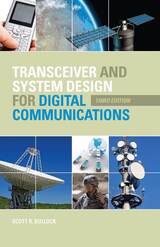 Transceiver and System Design for Digital Communications
Scott R. Bullock
The Institution of Engineering and Technology, 2009 Now in its 3rd edition, this successful book provides an intuitive approach to transceiver design, allowing a broad spectrum of readers to understand the topics clearly. It covers a wide range of data link communication design techniques, including link budgets, dynamic range and system analysis of receivers and transmitters used in data link communications, digital modulation and demodulation techniques of phase-shift keyed and frequency hopped spread spectrum systems using phase diagrams, multipath, gain control, an intuitive approach to probability, jamming reduction method using various adaptive processes, global positioning systems (GPS) data link, and direction-finding and interferometers, plus a section on broadband communications and home networking. Various techniques and designs are evaluated for modulating and sending digital data. Thus readers gain a firm understanding of the processes needed to effectively design wireless data link communication systems.
Transceiver and System Design for Digital Communications
Scott R. Bullock
The Institution of Engineering and Technology, 2014 This applied engineering reference covers a wide range of wireless communication design techniques; including link budgets, error detection and correction, adaptive and cognitive techniques, and system analysis of receivers and transmitters. Digital modulation and demodulation techniques using phase-shift keyed and frequency hopped spread spectrum systems are addressed. The title includes sections on broadband communications and home networking, satellite communications, and global positioning systems (GPS). Various techniques and designs are evaluated for modulating and sending digital signals, and the book offers an intuitive approach to probability plus jammer reduction methods using various adaptive processes. This title assists readers in gaining a firm understanding of the processes needed to effectively design wireless digital communication systems.
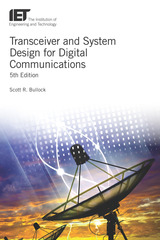 Transceiver and System Design for Digital Communications
Scott R. Bullock
The Institution of Engineering and Technology, 2018 This applied engineering reference covers a wide range of wireless communication design techniques; including link budgets, error detection and correction, adaptive and cognitive techniques, and system analysis of receivers and transmitters. Digital modulation and demodulation techniques using phase-shift keyed and frequency hopped spread spectrum systems are addressed. The book includes sections on broadband communications and home networking, satellite communications, global positioning systems (GPS), search, acquisition and track, and radar communications. Various techniques and designs are evaluated for modulating and sending digital signals, and the book offers an intuitive approach to probability plus jammer reduction methods using various adaptive processes. This title assists readers in gaining a firm understanding of the processes needed to effectively design wireless digital communication and cognitive systems with a basic understanding of radar.
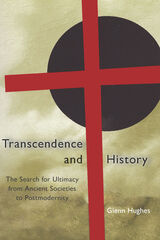 Transcendence and History: The Search for Ultimacy from Ancient Societies to Postmodernity
Glenn Hughes
University of Missouri Press, 2020 Transcendence and History is an analysis of what philosopher Eric Voegelin described as “the decisive problem of philosophy”: the dilemma of the discovery of transcendent meaning and the impact of this discovery on human self-understanding. The world’s major religious and wisdom traditions are built upon the recognition of transcendent meaning, and our own cultural and linguistic heritage has long since absorbed the postcosmological division of reality into the two dimensions of “transcendence” and “immanence.” But the last three centuries in the West have seen a growing resistance to the idea of transcendent meaning; contemporary and “postmodern” interpretations of the human situation—both popular and intellectual—indicate a widespread eclipse of confidence in the truth of transcendence. In Transcendence and History, Glenn Hughes contributes to the understanding of transcendent meaning and the problems associated with it, assisting in the philosophical recovery of the legitimacy of the notion of transcendence. Depending primarily on the treatments of transcendence found in the writings of twentieth-century philosophers Eric Voegelin and Bernard Lonergan, Hughes explores the historical discovery of transcendent meaning and then examines what it indicates about the structure of history. Hughes’s main focus, however, is on clarifying the problem of transcendence in relation to historical existence. Addressing both layreaders and scholars, Hughes applies the insights and analyses of Voegelin and Lonergan to considerable advantage. Transcendence and History will be of particular value to those who have grappled with the notion of transcendence in the study of philosophy, comparative religion, political theory, history, philosophical anthropology, and art or poetry. By examining transcendent meaning as the key factor in the search for ultimate meaning from ancient societies to the present, the book demonstrates how “the decisive problem of philosophy” both illuminates and presents a vital challenge to contemporary intellectual discourse.
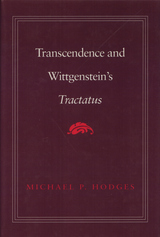 Transcendence and Wittgenstein's Tractatus
Michael P. Hodges
Temple University Press, 1990 Although Wittgenstein claimed that his first book, the Tractatus Logico-Philosophicus, was essentially an ethical work, it has been viewed insistently as a purely logical one. His later work, Philosophical Investigations, is generally seen as presenting totally different ideas from his earlier writings. In this book, Michael Hodges shows how Wittgenstein’s later work emerged from his earlier Tractatus, and he unifies the early philosophy, both its well-known logical aspects and the lesser known ethical dimensions, in terms of the notion of transcendence. Hodges studies the Tractatus in light of Wittgenstein’s own claim that the Philosophical Investigations can only be understood when read against the background of the Tractatus. At the heart of an understanding of the earlier work is the idea of transcendence which structures both Wittgenstein’s logical and ethical insights. Seen in terms of this notion, the rigorous unity of Wittgenstein’s early thinking becomes apparent and the gestalt shift to the later philosophy comes clearly into focus.
 Transcendent Love: Dostoevsky and the Search for a Global Ethic
Leonard G. Friesen
University of Notre Dame Press, 2016 In Transcendent Love: Dostoevsky and the Search for a Global Ethic, Leonard G. Friesen ranges widely across Dostoevsky's stories, novels, journalism, notebooks, and correspondence to demonstrate how Dostoevsky engaged with ethical issues in his times and how those same issues continue to be relevant to today's ethical debates. Friesen contends that the Russian ethical voice, in particular Dostoevsky's voice, deserves careful consideration in an increasingly global discussion of moral philosophy and the ethical life.
Friesen challenges the view that contemporary liberalism provides a religiously neutral foundation for a global ethic. He argues instead that Dostoevsky has much to offer when it comes to the search for a global ethic, an ethic that for Dostoevsky was necessarily grounded in a Christian concept of an active, extravagant, and transcendent love. Friesen also investigates Dostoevsky's response to those who claimed that contemporary European trends, most evident in the rising secularization of nineteenth-century society, provided a more viable foundation for a global ethic than one grounded in the One, whom Doestoevsky called simply "the Russian Christ." Throughout, Friesen captures a sense of the depth and sheer loveliness of Dostoevsky's canon. Dostoevsky was, after all, someone who believed that the ethical life was sublimely beautiful, even as it recklessly embraced suffering and unreasonably forgave others. The book will appeal to both students and scholars of Russian literature and history, comparative ethics, global ethics, and cultural studies, and togeneral readers with an interest in Dostoevsky.
 The Transcendent Mystery of God's Word: A Critical Synthesis of Antioch and Alexandria
John W. Martens
Saint Paul Seminary Press , 2024 Historical-critical methods in biblical scholarship are associated with numerous intellectual movements, such as rationalism, positivism, and historical relativism, that minimize or reject the sacred and revealed nature of Scripture. Ben F. Meyer noted, however, as have official Church documents, that modern biblical techniques are essential for locating the literal, that is, the intended sense of the biblical texts. He likened these modern methods to the ancient Antiochene school’s focus on the literal sense.
But to focus on “Antioch” alone does not account for Scripture’s theological depth, religious context, or fulfillment of the promises of God. Biblical interpretation associated with ancient “Alexandria” offers a focus on the transcendent mystery of God’s word, often lacking in current biblical scholarship, but Meyer noted that ancient allegorical interpretation cannot simply be borrowed today since it often lacks a sense of historic change and development.
This book is not about patristic reception of the Bible in Antioch and Alexandria, but the need to bring together in critical synthesis historical biblical methods that seek to understand the literal sense in all of its fullness and also incorporate methods of interpretation that take seriously the biblical texts as revelatory of God’s word for our salvation. “Antioch” and “Alexandria” are representative in this book of interpretive stances that pay attention to historical context, change, and development and are open to transcendence in order to offer the salvific power of Scripture to readers in our own day.
 Transcendent Woman: Margaret Fuller’s Art and Achievement
David M. Robinson
University of Massachusetts Press, 2025 Journalist, editor, critic, translator, and women’s rights advocate, Margaret Fuller was America’s first major female intellectual. Throughout much of the late-19th and 20th centuries, however, critics and scholars largely saw her as a minor figure in the transcendentalist movement with which she is associated, and her work was considered secondary to that of male figures like Emerson and Hawthorne. While her biography—including her marriage to an Italian noble and her dramatic death in a shipwreck—was often the focus, her skill as a writer was generally overlooked, and her intellectual development largely ignored.
In the early 1980s, David M. Robinson was one of the first scholars to publish an article that focused on Fuller’s mind and art. Now Transcendent Woman completes and extends this early work. Outlining the development of her philosophy, which Robinson defines as a “purpose-oriented form of thinking, tailored to the commitment and assets of each individual,” he traces Fuller’s intellectual journey, first in relation to her family and the people around her in New England and later in her travels in the midwestern United States and, more importantly, through Europe and her residency in Italy. He focuses first and foremost on what Fuller was reading (Goethe was key), what she was thinking as revealed in her letters and journals, and what she was writing, including seminal works such as Summer on the Lakes and Woman in the Nineteenth Century as well as lesser-known essays, translations, and short stories. Drawing extensively on primary sources, Robinson charts Fuller’s development and achievement as an original thinker and fearless advocate of democracy.
 Transcendent Woman: Margaret Fuller's Art and Achievement
David M. Robinson
University of Massachusetts Press, 2025 Journalist, editor, critic, translator, and women’s rights advocate, Margaret Fuller was America’s first major female intellectual. Throughout much of the late-19th and 20th centuries, however, critics and scholars largely saw her as a minor figure in the transcendentalist movement with which she is associated, and her work was considered secondary to that of male figures like Emerson and Hawthorne. While her biography—including her marriage to an Italian noble and her dramatic death in a shipwreck—was often the focus, her skill as a writer was generally overlooked, and her intellectual development largely ignored.
In the early 1980s, David M. Robinson was one of the first scholars to publish an article that focused on Fuller’s mind and art. Now Transcendent Woman completes and extends this early work. Outlining the development of her philosophy, which Robinson defines as a “purpose-oriented form of thinking, tailored to the commitment and assets of each individual,” he traces Fuller’s intellectual journey, first in relation to her family and the people around her in New England and later in her travels in the midwestern United States and, more importantly, through Europe and her residency in Italy. He focuses first and foremost on what Fuller was reading (Goethe was key), what she was thinking as revealed in her letters and journals, and what she was writing, including seminal works such as Summer on the Lakes and Woman in the Nineteenth Century as well as lesser-known essays, translations, and short stories. Drawing extensively on primary sources, Robinson charts Fuller’s development and achievement as an original thinker and fearless advocate of democracy.
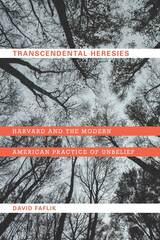 Transcendental Heresies: Harvard and the Modern American Practice of Unbelief
David Faflik
University of Massachusetts Press, 2020 At a moment when the requirements of belief and unbelief were being negotiated in unexpected ways, transcendentalism allowed for a more creative approach to spiritual questions. Interrogating the movement's alleged atheistic underpinnings, David Faflik contends that transcendentalism reconstituted the religious sensibilities of 1830s and 1840s New England, producing a dynamic and complex array of beliefs and behaviors that cannot be categorized as either religious or nonreligious. Rather than "the latest form of infidelity," as one contemporary described it, adherents viewed their unconventional and distinct spiritual practices as a modern religion.
Transcendental Heresies draws on an expansive antebellum archive of period commentary and writings by transcendentalism's practitioners, including Ralph Waldo Emerson, Henry David Thoreau, Theodore Parker, Margaret Fuller, and the women of transcendentalism's second and third waves. From Boston to Concord to the heady environs of Harvard, the species of unbelief they practiced multiplied the religious possibilities of the era, expressing misgivings about traditional notions of divinity, flouting religion's customary forms, and ultimately encouraging spiritual questioning.
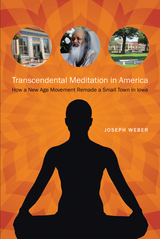 Transcendental Meditation in America: How a New Age Movement Remade a Small Town in Iowa
Joseph Weber
University of Iowa Press, 2014 The Indian spiritual entrepreneur Maharishi Mahesh Yogi took the West by storm in the 1960s and ’70s, charming Baby Boomers fed up with war and social upheaval with his message of meditation and peace. Heeding his call, two thousand followers moved to tiny Fairfield, Iowa, to set up their own university on the campus of a failed denominational college. Soon, they started a school for prekindergarten through high school, allowing followers to immerse themselves in Transcendental Meditation from toddlerhood through PhDs. Although Fairfield’s longtime residents were relieved to see that their new neighbors were clean-cut and respectably dressed—not the wild-haired, drug-using hippies they had feared—the newcomers nevertheless quickly began to remake the town. Stores selling exotic goods popped up, TM followers built odd-looking homes that modeled the guru’s rules for peace-inspiring architecture, and the new university knocked down a historic chapel, even as it erected massive golden-domed buildings for meditators. Some newcomers got elected—and others were defeated—when they ran for local and statewide offices. At times, thousands from across the globe visited the small town. Yet Transcendental Meditation did not always achieve its aims of personal and social tranquility. Suicides and a murder unsettled the meditating community over the years, and some followers were fleeced by con men from their own ranks. Some battled a local farmer over land use and one another over doctrine. Notably, the world has not gotten more peaceful. Today the guru is dead. His followers are graying, and few of their children are moving into leadership roles. The movement seems rudderless, its financial muscle withering, despite the efforts of high-profile supporters such as filmmaker David Lynch and media magnate Oprah Winfrey. Can TM reinvent itself? And what will be the future of Fairfield itself? By looking closely at the transformation of this small Iowa town, author Joseph Weber assesses the movement’s surprisingly potent effect on Western culture, sketches out its peculiar past, and explores its possible future.
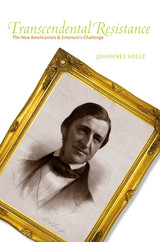 Transcendental Resistance: The New Americanists and Emerson's Challenge
Johannes Voelz
Dartmouth College Press, 2010 Johannes Voelz offers a critique of the New Americanists through a stimulating and original reexamination of the iconic figure of Ralph Waldo Emerson. Voelz argues against the prevailing tendency among Americanists to see Emerson as the product of an “all-pervasive scope of cultural power.” Instead he shows Emerson’s philosophy to be a deft response to the requirements of lecturing professionally at the newly built lyceums around the country. Voelz brings to light a fascinating organic relationship between Emerson’s dynamic style of thinking and the uplifting experience demanded by his public. This need for an audience-directed philosophy, the author argues, reveals the function of Emerson’s infamous inconsistencies on such issues as representation, identity, and nation. It also poses a major counter-argument to the New Americanists’ dim view of Emerson’s individualism and his vision of the private man in public. Challenging the fundamental premises of the New Americanists, this study is an important, even pathbreaking guide to the future of American studies.
 Transcendental Wordplay: America’s Romantic Punsters and the Search for the Language of Nature
Michael West
Ohio University Press, 2000 Throughout the first half of the nineteenth century, America was captivated by a muddled notion of “etymology.” New England Transcendentalism was only one outcropping of a nationwide movement in which schoolmasters across small-town America taught students the roots of words in ways that dramatized religious issues and sparked wordplay. Shaped by this ferment, our major romantic authors shared the sensibility that Friedrich Schlegel linked to punning and christened “romantic irony.” Notable punsters or etymologists all, they gleefully set up as sages, creating jocular masterpieces from their zest for oracular wordplay. Their search for a primal language lurking beneath all natural languages provided them with something like a secret language that encodes their meanings. To fathom their essentially comic masterpieces we must decipher it. Interpreting Thoreau as an ironic moralist, satirist, and social critic rather than a nature-loving mystic, Transcendental Wordplay suggests that the major American Romantics shared a surprising conservatism. In this award-winning study, Professor West rescues the pun from critical contempt and allows readers to enjoy it as a serious form of American humor.
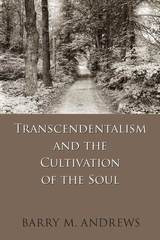 Transcendentalism and the Cultivation of the Soul
Barry M. Andrews
University of Massachusetts Press, 2017 American Transcendentalism is often seen as a literary movement—a flowering of works written by New England intellectuals who retreated from society and lived in nature. In Transcendentalism and the Cultivation of the Soul, Barry M. Andrews focuses on a neglected aspect of this well-known group, showing how American Transcendentalists developed rich spiritual practices to nurture their souls and discover the divine. The practices are common and simple—among them, keeping journals, contemplation, walking, reading, simple living, and conversation. In approachable and accessible prose, Andrews demonstrates how Transcendentalism's main thinkers, Emerson, Thoreau, Fuller, and others, pursued rich and rewarding spiritual lives that inspired them to fight for abolition, women's rights, and education reform. In detailing these everyday acts, Andrews uncovers a wealth of spiritual practices that could be particularly valuable today, to spiritual seekers and religious liberals.
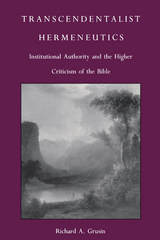 Transcendentalist Hermeneutics: Institutional Authority and the Higher Criticism of the Bible
Richard A. Grusin
Duke University Press, 1991 American literary historians have viewed Ralph Waldo Emerson’s resignation from the Unitarian ministry in 1832 in favor of a literary career as emblematic of a main current in American literature. That current is directed toward the possession of a self that is independent and fundamentally opposed to the “accoutrements of society and civilization” and expresses a Transcendentalist antipathy toward all institutionalized forms of religious observance.
In the ongoing revision of American literary history, this traditional reading of the supposed anti-institutionalism of the Transcendentalists has been duly detailed and continually supported. Richard A. Grusin challenges both traditional and revisionist interpretations with detailed contextual studies of the hermeneutics of Ralph Waldo Emerson, Henry David Thoreau, and Theodore Parker. Informed by the past two decades of critical theory, Grusin examines the influence of the higher criticism of the Bible—which focuses on authorship, date, place of origin, circumstances of composition, and the historical credibility of biblical writings—on these writers. The author argues that the Transcendentalist appeal to the authority of the “self” is not an appeal to a source of authority independent of institutions, but to an authority fundamentally innate.
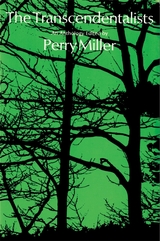 The Transcendentalists: An Anthology
Perry Miller
Harvard University Press The late Perry Miller once stated, “I have been compelled to insist that the mind of man is the basic factor in human history,” and his study of the mind in America has shaped the thought of three decades of scholars. The fifteen essays here collected—several of them previously unpublished—address themselves to the facets of the American consciousness and to their expression in literature from the time of the Cambridge Agreement to the Nobel Prize acceptance speeches of Hemingway and Faulkner. A companion volume to Errand into the Wilderness, its general theme is one adumbrated in Miller’s two-volume masterpiece, The New England Mind—the thrust of civilization into the vast, empty continent and its effect upon Americans’ concept of themselves as “nature’s nation.”
The essays first concentrate on Puritan covenant theology and its gradual adaptation to changing condition in America: the decline in zeal for a “Bible commonwealth,” the growth of trade and industry, and the necessity for coexisting with large masses of unchurched people. As the book progresses, the emphasis shifts from religion to the philosophy of nature to the development of an original literature, although Miller is usually analyzing simultaneously all three aspects of the American quest for self-identity. In the final essays, he shows how the forces that molded the self-conscious articulateness of the early New Englanders still operate in the work of contemporary American writers.
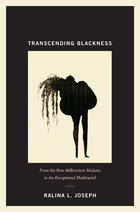 Transcending Blackness: From the New Millennium Mulatta to the Exceptional Multiracial
Ralina L. Joseph
Duke University Press, 2012 Representations of multiracial Americans, especially those with one black and one white parent, appear everywhere in contemporary culture, from reality shows to presidential politics. Some depict multiracial individuals as mired in painful confusion; others equate them with progress, as the embodiment of a postracial utopia. In Transcending Blackness, Ralina L. Joseph critiques both depictions as being rooted in—and still defined by—the racist notion that blackness is a deficit that must be overcome. Analyzing emblematic representations of multiracial figures in popular culture—Jennifer Beals's character in the The L Word; the protagonist in Danny Senza's novel Caucasia; the title character in the independent film Mixing Nia; and contestants in a controversial episode of the reality show America's Next Top Model, who had to "switch ethnicities" for a photo shoot—Joseph identifies the persistence of two widespread stereotypes about mixed-race African Americans, those of "new millennium mulattas" and "exceptional multiracials." The former inscribes multiracial African Americans as tragic figures whose blackness predestines them for misfortune; the latter rewards mixed-race African Americans for successfully erasing their blackness. Addressing questions of authenticity, sexuality, and privilege, Transcending Blackness refutes the idea that race no longer matters in American society.
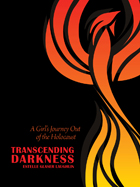 Transcending Darkness: A Girl’s Journey Out of the Holocaust
Estelle Glaser Laughlin
Texas Tech University Press, 2012 “Please, Mama, I don’t want to live like this,” pleaded twelve-year-old Estelle Glaser’s older sister as they watched the bodies of friends dangle from the gibbet in the center of Warsaw’s Apel Platz. “I cannot take the indignities and brutalities. Let’s step forward and make them kill us now.” But Estelle’s mother fiercely responded to her two daughters: No! Life is sacred. It is noble to fight to stay alive. Their mother’s indomitable will was a major factor in the trio’s survival in the face of brutal odds. But Estelle recognized other heroes in the ghetto as well, righteous individuals who stood out like beacons and kept their spirits alive. Their father was one, as were hungry teachers in dim, cold rooms who risked their lives to secretly teach imprisoned children. Estelle’s memoir, published sixty-four years after their liberation from the concentration camp, is a narrative of fear and hope and resiliency. While it is a harrowing tale of destruction and loss, it is also a story of the goodness that still exists in a dark world, of survival and renewal.
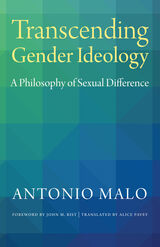 Transcending Gender Ideology: A Philosophy of Sexual Difference
Antonio Malo
Catholic University of America Press, 2020 Human sexuality is a very important subject, especially in a cultural context such as ours, in which social and work transformations offer behavioral models that are characterized by a remarkable sexual indeterminacy. In Transcending Gender Ideology, Antonio Malo tries to rethink sexuality with equilibrium and intellectual rigor, using a philosophical approach, since sexuality does not only affect biological aspects or social conditioning, but above all the same essence of the relationship between man and woman.
Malo’s reflections begin with the historical evolution of the concept of sexuality: the naturalistic conception, which sees the difference between man and woman as something biological and absolute, and the postmodern conception, which criticizes it by judging human sexuality as a socio-cultural construction or gender. According to Malo, the limitation of the gender approach is to deny the relationship of human sexuality to the body and to the differences between man and woman. In fact, by rejecting these aspects, they end up sustaining a limitless creativity of freedom, which transforms the body into something that is used at will, and relationships as something fluid.
Faced with these extremes, Malo proposes a vision of sexuality as a personal condition or sexed condition, received at the time of birth, but which develops, grows and matures through family models, experiences and relationships. Even if based on an original sexual difference, sexed condition covers many other aspects: physical, psychological, social and cultural, as well as behavioral patterns and, above all, the personal integration of sexuality through the gift of oneself in marriage or in celibacy.
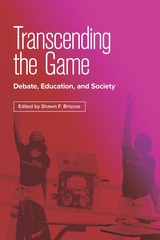 Transcending the Game: Debate, Education, and Society
Edited by Shawn F. Briscoe
Southern Illinois University Press, 2024 A pathway to community, growth, and change
This collection of inclusive essays explores the role of debate in understanding and critiquing injustice and inequality. Edited by Shawn F. Briscoe, these essays closely examine multiple approaches to debate, considering their respective merits and controversies. This detailed compilation analyzes how debate methodologies are useful in everyday life and whether certain approaches have any value at all.
Briscoe provides an in-depth look into the varying styles of debate and contributes to a greater understanding of argument theory by discussing three stylistic approaches: audience-centered, technical/progressive, and nontraditional/performative. The book demonstrates that all three approaches offer students opportunity to engage in a socioemotional learning space, a discipline that prepares students for undergraduate and graduate work, a study that prepares participants for future careers, and a field that investigates current controversies and how to tackle them. Briscoe offers compelling narratives from BIPOC, LGBTQIA, and women authors that explore the personal impact of debate on social equality within this academic discipline, our educational system, and society.
The diversity in gender and race of the contributing authors allows for a multitude of perspectives on the complex styles, benefits, and issues discussed in Transcending the Game. Briscoe peels back the mystery that shrouds the benefits of academic, competitive debate from outsiders and insiders alike. A myriad of personal narratives tell stories about the role of debate in their lives; challenge the unproductive discourse in debate, education, and society; and offer diverse insight into why we debate.
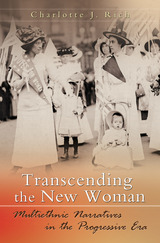 Transcending the New Woman: Multiethnic Narratives in the Progressive Era
Charlotte J. Rich
University of Missouri Press, 2009 The dawn of the twentieth century saw the birth of the New Woman, a cultural and literary ideal that replaced Victorian expectations of domesticity with visions of social, political, and economic autonomy. Although such writers as Edith Wharton and Kate Chopin treated these ideals in well-known literature of that era, marginalized women also explored changing gender roles in works that deserve more attention today. This book is the first study to focus solely on multiethnic women writers’ responses to the ideal of the New Woman in America, opening up a world of literary texts that provide new insight into the phenomenon. Charlotte Rich reveals how these authors uniquely articulated the contradictions of the American New Woman, and how social class, race, or ethnicity impacted women’s experiences of both public and private life in the Progressive era. Rich focuses on the work of writers representing five distinct ethnicities: Native Americans S. Alice Callahan and Mourning Dove, African American Pauline Hopkins, Chinese American Sui Sin Far, Mexican American María Cristina Mena, and Jewish American Anzia Yezierska. She shows that some oftheir works contain both affirmative and critical portraits of white New Women; in other cases, while these authorsalign their multiethnic heroines with the new ideals, those ideals are sometimes subordinated to more urgent dialogues about inequality and racial violence. Here are views of women not usually encountered in fiction of this era. Callahan’s and Mourning Dove’s novels allude to women’s rights but ultimately privilege critiques of violence against Native Americans. Hopkins’s novels trace an increasingly pessimistic trajectory, drawing cynical conclusions about black women’s ability to thrive in a prejudiced society. Mena’s magazine portraits of Mexican life present complex critiques of this independent ideal of womanhood. Yezierska’s stories question the philanthropy of socially privileged Progressive female reformers with whom immigrant women interact. These writers’ works sometimes affirm emerging ideals but in other cases illuminate the iconic New Woman’s blindness to her own racial and economic privilege. Through her insightful analysis, Rich presents alternative versions of female autonomy, with characters living outside the mainstream or moving between cultures. Transcending the New Woman offers multiple ways of transcending an ideal that was problematic in its exclusivity, as well as an entrée to forgotten works. It shows how the concept of the New Woman can be seen in newly complex ways when viewed through the writings of authors whose lives often embody the New Woman’s emancipatory goals—and whose fictions both affirm and complicateher aspirations.
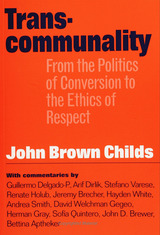 Transcommunality: From The Politics Of Conversion
John Brown Childs
Temple University Press, 2003 In this original and collaborative creation, John Brown-Childs offers unique insights into some of the central problems facing communities, social movements, and people who desire social change: how does one build a movement that can account for race, class and gender, and yet still operate across all of these lines? How can communities sustain themselves in truly social ways? And perhaps most important, how can we take the importance of community into account without forgoing the important distinctions that we all ascribe to ourselves as individuals?Borrowing from the Haudenosaunee, or Iroquois federation, Brown-Childs offers a way of thinking about communities as coalitions, ones that account for differences in the very act of coming together. Using the Iroquois as an example of transcommunality in action, he also offers specific outcomes that many people desire—racial justice and peace are two examples—as points of focus around which many disparate groups may organize, without ever subsuming questions of identity as an expense of organizing.In addition to Brown-Childs' own exegesis, twelve scholars and thinkers from all walks of life offer their own responses to his thinking, enriching the book as an illustration and example of transcommunality.In an age of fractured identities and a world that is moving toward a global community, Transcommunality offers a persuasive way of imagining the world where community and individual identity may not only coexist, but also depend upon the other to the benefit of both.
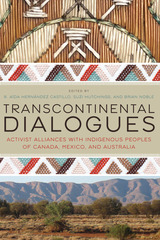 Transcontinental Dialogues: Activist Alliances with Indigenous Peoples of Canada, Mexico, and Australia
Edited by R. Aída Hernández Castillo, Suzi Hutchings, and Brian Noble
University of Arizona Press, 2019 Transcontinental Dialogues brings together Indigenous and non-Indigenous anthropologists from Mexico, Canada, and Australia who work at the intersections of Indigenous rights, advocacy, and action research. These engaged anthropologists explore how obligations manifest in differently situated alliances, how they respond to such obligations, and the consequences for anthropological practice and action.
This volume presents a set of pieces that do not take the usual political or geographic paradigms as their starting point; instead, the particular dialogues from the margins presented in this book arise from a rejection of the geographic hierarchization of knowledge in which the Global South continues to be the space for fieldwork while the Global North is the place for its systematization and theorization. Instead, contributors in Transcontinental Dialogues delve into the interactions between anthropologists and the people they work with in Canada, Australia, and Mexico. This framework allows the contributors to explore the often unintended but sometimes devastating impacts of government policies (such as land rights legislation or justice initiatives for women) on Indigenous people’s lives.
Each chapter’s author reflects critically on their own work as activist-scholars. They offer examples of the efforts and challenges that anthropologists—Indigenous and non-Indigenous—confront when producing knowledge in alliances with Indigenous peoples. Mi’kmaq land rights, pan-Maya social movements, and Aboriginal title claims in rural and urban areas are just some of the cases that provide useful ground for reflection on and critique of challenges and opportunities for scholars, policy-makers, activists, allies, and community members.
This volume is timely and innovative for using the disparate anthropological traditions of three regions to explore how the interactions between anthropologists and Indigenous peoples in supporting Indigenous activism have the potential to transform the production of knowledge within the historical colonial traditions of anthropology.
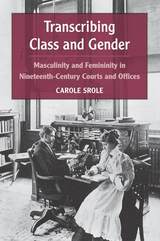 Transcribing Class and Gender: Masculinity and Femininity in Nineteenth-Century Courts and Offices
Carole Srole
University of Michigan Press, 2012 "Drawing upon census data, trade periodicals devoted to stenography and court reporting, the writings of educational reformers, and fiction, Srole allows us to better understand the roles that gender and work played in the formation of middle-class identity. Clearly written and thoroughly researched, her book reminds us of the contradictions that both men and women faced as they navigated changes in the labor market and sought to realize a modern professional identity."
---Thomas Augst, New York University Transcribing Class and Gender explores the changing meanings of clerical work in nineteenth-century America, focusing on the discourse surrounding that work. At a time when shorthand transcription was the primary method of documenting business and legal communications and transactions, most stenographers were men, but changing technology saw the emergence of women in the once male-dominated field. Carole Srole argues that this shift placed stenographers in a unique position to construct a new image of the professional man and woman and, in doing so, to redefine middle- and working-class identities. Many male court reporters emphasized their professionalism, portraying themselves as educated language experts as a way to elevate themselves above the growing numbers of female and working-class stenographers and typewriter operators. Meanwhile, women in the courts and offices were confronting the derogatory image of the so-called Typewriter Girl who cared more about her looks, clothing, and marriage prospects than her job. Like males in the field, women responded by fashioning a gendered professional image---one that served to combat this new version of degraded female labor while also maintaining traditional ideals of femininity. The study is unique in the way it reads and analyzes popular fiction, stenography trade magazines, the archives of professional associations, and writings by educational reformers to provide new perspectives on this history. The author challenges the common assumption that men and women clerks had separate work cultures and demonstrates how each had to balance elements of manhood and womanhood in the drive toward professionalism and the construction of a new middle-class image. Transcribing Class and Gender joins the recent scholarship that employs cultural studies approaches to class and gender without abandoning the social history valuation of workers' experiences. Carole Srole is Professor of History at California State University, Los Angeles. Photo: A female stenographer working for an actuary in 1897. Courtesy Metlife Archives.
Transcript of the Disappearance, Exact and Diminishing: Poems
Lynn Emanuel
University of Pittsburgh Press, 2023 A Poetic Autobiography—Intimate, Sorrowful, and Funny
Lynn Emanuel’s sixth collection of poetry is not sequential or straightforward. It has no conventional chronology, no master narrative. Instead, it is a life story, with all the chaos and messiness entailed therein. Transcript of the Disappearance, Exact and Diminishing is a commotion of grief and wit, audacious images, poems, and paragraphs. It explores and centers on the possibilities and limitations of art in the face of disappearances of many kinds, including the disappearance that is most personal—the poet’s own.
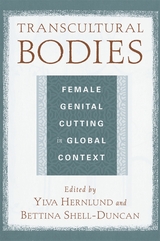 Transcultural Bodies: Female Genital Cutting in Global Context
Hernlund, Ylva K
Rutgers University Press, 2007 Female "circumcision" or, more precisely, female genital cutting (FGC), remains an important cultural practice in many African countries, often serving as a coming-of-age ritual. It is also a practice that has generated international dispute and continues to be at the center of debates over women's rights, the limits of cultural pluralism, the balance of power between local cultures, international human rights, and feminist activism. In our increasingly globalized world, these practices have also begun immigrating to other nations, where transnational complexities vex debates about how to resolve the issue. Bringing together thirteen essays, Transcultural Bodies provides an ethnographically rich exploration of FGC among African diasporas in the United Kingdom, Europe, and Australia. Contributors analyze changes in ideologies of gender and sexuality in immigrant communities, the frequent marginalization of African women's voices in debates over FGC, and controversies over legislation restricting the practice in immigrant populations.
Trans*Cultural Production
Julian B. Carter, David J. Getsy, and Trish Salah, special issue editors
Duke University Press The editors of this issue have selected essays that document the wide range of contemporary trans cultural production, including work not only on literature but also on photography, film, architecture, dance, theater, performance art, new media, and curation. These essays offer the field of transgender studies a useful point of departure for the ongoing and potentially vast undertaking of trans cultural criticism and the interpretation of trans cultural production.
Transculturality and German Discourse in the Age of European Colonialism
Chunjie Zhang
Northwestern University Press, 2017 In Transculturality and German Discourse in the Age of European Colonialism, Chunjie Zhang examines the South Pacific travel writings of George Forster and Adelbert von Chamisso, literary works by August von Kotzebue and Johann Joachim Campe, Herder’s philosophy of history, and Kant’s theory of geography from the perspective of non-European impact during the age of Europe’s colonial expansion. She explores what these texts show about German and European superiority, the critique of the slave trade, European moral debauchery, acknowledgments of non-European cultural achievements, and sympathy with colonized peoples. Moving beyond the question of empire versus enlightenment, Zhang’s book diligently detects global connections, offering much to scholars of literature, culture, and intellectual history.
 Trans/Feminisms
Susan Stryker and Talia M. Bettcher, special issue editors
Duke University Press This special double issue of TSQ goes beyond the simplistic dichotomy between an exclusionary transphobic feminism and an inclusive trans-affirming feminism. Exploring the ways in which trans issues are addressed within feminist and women’s organizations and social movements around the world, contributors ask how trans, genderqueer, and nonbinary issues are related to feminist movements today, what kind of work is currently undertaken in the name of trans/feminism, what new paradigms and visions are emerging, and what questions still need to be taken up. Central to this special issue is the recognition that trans/feminist politics cannot restrict itself to the domain of gender alone. This issue features numerous shorter works that represent the diversity of trans/feminist practices and problematics and, in addition to original research articles, includes theory, reports, manifestos, opinion pieces, reviews, and creative/artistic productions, as well as republished key documents of trans/feminist history and international scholarship. Contributors: Miriam Abelson, Sara Ahmed, Aitzole Araneta, Alexandre Baril, Marie-Hélène/Sam Bourcier, micha cárdenas , Daniel Chávez, Jeanne Córdova, Pedro J. DiPietro, Lucía Egaña, A. Finn Enke, Karine Espineira, Sandra Fernández, Simon D. Fisher, Tania Hammidi, Christoph Hanssmann, Emma Louise Heaney, Hailey Kaas, Cael Keegan, Faris Khan, Yana Kirey-Sitnikova, Terence Kumpf, Riki Lane, Helen Hok-Sze Leung, Claudia Sofia Garriga López, Tommi Avicolli Mecca, L. Leigh Ann van der Merwe, Scott Morgensen, Marcio Jose Ornat, Ruin S. M. Pae, José Quiroga, Naomi Scheman, Joseli Maria Silva, reese simpkins, Miriam Solá, Sandy Stone, Stefania Voli, Rinaldo Walcott, Lori Watson, Cristan Williams, Shana Ye, Asli Zengin
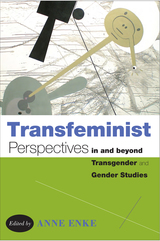 Transfeminist Perspectives in and beyond Transgender and Gender Studies
Finn Enke
Temple University Press, 2012 Lambda Literary Award for Best Book in Transgender Nonfiction, 2013
If feminist studies and transgender studies are so intimately connected, why are they not more deeply integrated? Offering multidisciplinary models for this assimilation, the vibrant essays in Transfeminist Perspectives in and beyond Transgender and Gender Studies suggest timely and necessary changes for institutions of higher learning.
Responding to the more visible presence of transgender persons as well as gender theories, the contributing essayists focus on how gender is practiced in academia, health care, social services, and even national border patrols. Working from the premise that transgender is both material and cultural, the contributors address such aspects of the university as administration, sports, curriculum, pedagogy, and the appropriate location for transgender studies.
Combining feminist theory, transgender studies, and activism centered on social diversity and justice, these essays examine how institutions as lived contexts shape everyday life.
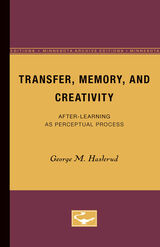 Transfer, Memory, and Creativity: After-Learning as Perceptual Process
George Haslerud
University of Minnesota Press, 1972 Transfer, Memory, and Creativity was first published in 1972.Dr. Haslerud, a psychologist, presents a valuable new theory of the transfer of learning, a theory which provides new insights into a neglected aspect of the psychology of learning. The findings and conclusions of his work have important implications for the problems of education, especially in view of today’s urgent need to improve the results of schooling.Through his concept of after-learning (the learning which takes place after the period of formal learning has ended) as a perceptual process, the author has succeeded in identifying factors or conditions which have tended to limit transfer of learning to boundaries of the literal and to prevent a progression to creative achievement. Dr. Haslerud contends that previous theories of the transfer of learning have been either irrelevant or insusceptible to specific application. With the new theory and its deductions, he points out, all learning can become relevant.Using several new constructs in his theory, Dr. Haslerud spells out the assumptions and definitions of terms which are changed by the perceptual view, supporting them in part by experimental evidence and suggesting ways in which hypotheses which are still provisional may be tested.The book is important for concerned citizens and school and college administrators who are seeking better educational outcomes as well as for educational and other psychologists who research and teaching involves learning theory.
 The Transfer of Cognitive Skill
Mark Singley and John R. Anderson
Harvard University Press, 1989 Does a knowledge of Latin facilitate the learning of computer programming? Does skill in geometry make it easier to learn music? The issue of the transfer of learning from one domain to another is a classic problem in psychology as well as an educational question of great importance, which this ingenious new book sets out to solve through a theory of transfer based on a comprehensive theory of skill acquisition.
The question was first studied systematically at the turn of the century by the noted psychologist Edward L. Thorndike, who proposed a theory of transfer based on common elements in two different tasks. Since then, psychologists of different theoretical orientations—verbal learning, gestalt, and information processing—have addressed the transfer question with differing and inconclusive results. Mark Singley and John Anderson resurrect Thorndike’s theory of identical elements, but in a broader context and from the perspective of cognitive psychology. Making use of a powerful knowledge-representation language, they recast his elements into units of procedural and declarative knowledge in the ACT* theory of skill acquisition. One skill will transfer to another, they argue, to the extent that it involves the same productions or the same declarative precursors. They show that with production rules, transfer can be localized to specific components—in keeping with Thorndike’s theory—and yet still be abstract and mentalistic.
The findings of this book have important implications for psychology and the improvement of teaching. They will interest cognitive scientists and educational psychologists, as well as computer scientists interested in artificial intelligence and cognitive modeling.
The Transfiguration of the Commonplace: A Philosophy of Art
Arthur C. Danto
Harvard University Press, 1981 Arthur C. Danto argues that recent developments in the art world, in particular the production of works of art that cannot be told from ordinary things, make urgent the need for a new theory of art and make plain the factors such a theory can and cannot involve. In the course of constructing such a theory, he seeks to demonstrate the relationship between philosophy and art, as well as the connections that hold between art and social institutions and art history.
The book distinguishes what belongs to artistic theory from what has traditionally been confused with it, namely aesthetic theory and offers as well a systematic account of metaphor, expression, and style, together with an original account of artistic representation. A wealth of examples, drawn especially from recent and contemporary art, illuminate the argument.
Transfigurations Of The Maghreb: Feminism, Decolonization, and Literatures
Winfred Woodhull
University of Minnesota Press, 1993 Through readings of some of the best-known texts in Algerian literature in French, Woodhull both challenges the separation between French and Francophone literatures and cultures in the academy and explores the ways in which "femininity" has been represented in the texts of North African and French writers since the mid-1950s.
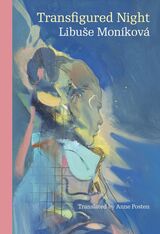 Transfigured Night
Libuše Moníková
Karolinum Press, 2023 A vision of late-twentieth-century Prague from an acclaimed Czech novelist.
In late 1992, three years after the Velvet Revolution and as Czechoslovakia is about to dissolve into the Czech Republic and Slovakia, choreographer and dancer Leonora Marty, who fled the Communist state decades earlier, has returned to Prague. Having wrapped up her ballet of The Makropulos Affair, the famous dancer meets old classmates, wanders the city through crowds of tourists, and visits the most obscure and unvisited museums. When she is approached by Thomas Asperger, a descendant of ethnic Germans driven from Czechoslovakia after World War II, she must confront three relationships—her relationship with the city of her youth, her homeland’s relationship with its past, and her new romance with this German admirer.
Written in German and published in 1995, by an author whose life mirrored her protagonist’s, the novel provides a cultural tour of Prague. Employing a style as influenced by the operas of Leoš Janácek as the novels of Thomas Pynchon, Transfigured Night is a masterpiece of Czech literature, showing that the culture of this nation comes in a variety of tongues.
Transfigurements: On the True Sense of Art
John Sallis
University of Chicago Press, 2008 Transfigurements develops a framework for thinking about art through innovative readings of some of the most important philosophical writing on the subject by Kant, Hegel, and Heidegger. Sallis exposes new layers in their texts and theories while also marking their limits. By doing so, his aim is to show that philosophy needs to attend to art directly. Consequently, Sallis also addresses a wide range of works of art, including paintings by Raphael, Monet, and Klee; Shakespeare’s comedies; and the music of Beethoven, Schubert, Mahler, and Tan Dun. Through these interpretations, he puts forth a compelling new elaboration of the philosophy of art.
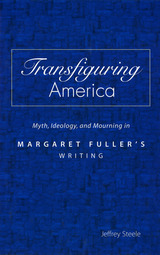 Transfiguring America: Myth, Ideology, and Mourning in Margaret Fuller's Writing
Jeffrey Steele
University of Missouri Press, 2001
Transfiguring America is the product of more than ten years of research and numerous published articles on Margaret Fuller, arguably America's first feminist theorist and one of the most important woman writers in the nineteenth century. Focusing on Fuller's development of a powerful language that paired cultural critique with mythmaking, Steele shows why her writing had such a vital impact on the woman's rights movement and modern conceptions of gender.
This groundbreaking study pays special attention to the ways in which Fuller's feminist consciousness and social theory emerged out of her mourning for herself and others, her dialogue with Emersonian Transcendentalism, and her eclectic reading in occult and mythical sources. Transfiguring America is the first book to provide detailed analyses of all of Fuller's major texts, including her mystical Dial essays, correspondence with Emerson, Summer on the Lakes, 1844 poetry, Woman in the Nineteenth Century, and New York Tribune essays written both in New York and Europe.
Starting from her own profound sense of loss as a marginalized woman, Fuller eventually recognized the ways in which the foundational myths of American society, buttressed by conservative religious ideologies, replicated dysfunctional images of manhood and womanhood. With Woman in the Nineteenth Century, after exploring the roots of oppression in her essays and poetry, Fuller advanced the cause of woman's rights by conceptualizing a more fluid and equitable model of gender founded upon the mythical reconfiguration of human potential. But as her horizons expanded, Fuller demanded not only political equality for women, but also emotional, intellectual, and spiritual freedom for all victims of social oppression.
By the end of her career, Steele shows, Fuller had blended personal experience and cultural critique into the imaginative reconstruction of American society. Beginning with a fervent belief in personal reform, she ended her career with the apocalyptic conviction that the dominant myths both of selfhood and national identity must be transfigured. Out of the ashes of personal turmoil and political revolution, she looked for the phoenix of a revitalized society founded upon the ideal of political justice.
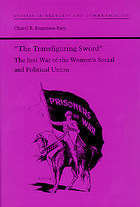 The Transfiguring Sword: The Just War of the Women's Social and Political Union
Cheryl R. Jorgensen-Earp
University of Alabama Press, 1997 Provides a new understanding of the recurrent rhetorical need to employ conservative rhetoric in support of a radical cause The Women’s Social and Political Union, the militant branch of the English women’s suffrage movement, turned to arson, bombing, and widespread property destruction as a strategy to achieve suffrage for women. Because of its comparative rarity, terrorist violence by reform (as opposed to revolutionary) movements is underexplored, as is the discursive rhetoric that accompanies this violence. Largely because of the moral stance that drives such movements, the need to justify violence is greater for the reformist than for the revolutionary terrorist. The burden of rhetorical justification falls even more heavily on women utilizing violence, an option generally perceived as open only to men. The militant suffragettes justified their turn to limited terrorism by arguing that their violence was part of a “just war.” Appropriating the rhetoric of a just war in defense of reformist violence allowed the suffragettes to exercise a traditional rhetorical vision for the sake of radical action. The concept of a just war allowed a spinning out of a fantasy of heroes, of a gallant band fighting against the odds. It challenged the imagination of the public to extend to women a heroic vision usually reserved for men and to accept the new expectations inherent in that vision. By incorporating the concept of a just war into their rhetoric, the WSPU leaders took the most conventional justification that Western tradition provides for the use of violence and adapted it to meet their unique circumstance as women using violence for political reform. This study challenges the common view that the suffragettes’ use of military metaphors, their vilification of the government, and their violent attacks on property were signs of hysteria and self-destruction. Instead, what emerges is a picture of a deliberate, if controversial, strategy of violence supported by a rhetorical defense of unusual power and consistency.
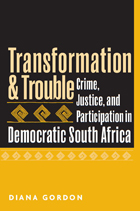 Transformation and Trouble: Crime, Justice and Participation in Democratic South Africa
Diana Gordon
University of Michigan Press, 2006
Crime is one of the major challenges to any new democracy. Violence often increases after the lifting of authoritarian control, or in the aftermath of regime change. But how can a fledgling democracy fight crime without violating the fragile rights of its citizens? In Transformation and Trouble, accomplished theorist and criminal justice scholar Diana Gordon critically examines South Africa's efforts to strike the perilous balance between democratic participation and social control.
South Africa has made great progress in pursuing the Western ideals of participatory justice and due process. Yet Gordon finds that popular concerns about crime have fostered the growth of a punitive criminal justice system that undermines the country's rights-oriented political culture. Transformation and Trouble calls for South Africa to reaffirm its commitment to public empowerment by reforming its criminal justice system-an approach, she argues, that would strengthen the country's new democracy.
"An eloquent, critical, but ultimately optimistic, analysis of the democratization of crime and justice in post-apartheid South Africa."
--Bill Dixon, School of Criminology, Education, Sociology and Social Work, Keele University
"A must read for understanding contemporary South Africa's agonizing dilemmas as it struggles to reconcile crime control with democratic values."
--Jerome H. Skolnick, New York University School of Law
"Gordon's vast experience with criminal justice illuminates her cautionary tale of the search for a new way in south Africa."
--Paul Chevigny, New York University
Diana Gordon is Professor Emerita of Political Science and Senior Research Scholar, City University of New York.
 Transformation by Fire: The Archaeology of Cremation in Cultural Context
Edited by Ian Kuijt, Colin P. Quinn, and Gabriel Cooney
University of Arizona Press, 2014 Ash, bone, and memories are all that remains after cremation. Yet for societies and communities, the act of cremation after death is highly symbolic, rich with complex meaning, touching on what it means to be human. In the process of transforming the dead, the family, the community, and society as a whole create and partake in cultural symbolism. Cremation is a key area of archaeological research, but its complexity has been underappreciated and undertheorized. Transformation by Fire offers a fresh assessment of archaeological research on this widespread social practice.
Editors Ian Kuijt, Colin P. Quinn, and Gabriel Cooney’s volume examines cremation by documenting the material signatures of cremation events and processes, as well as its transformative impact on social relations and concepts of the body. Indeed, examining why and how people chose to cremate their dead serves as an important means of understanding how people in the past dealt with death, the body, and the social world.
The contributors develop new perspectives on cremation as important mortuary practices and social transformations. Varying attitudes and beliefs on cremation and other forms of burial within the same cultural paradigm help us understand what constitutes the body and what occurs during its fiery transformation. In addition, they explore issues and interpretive perspectives in the archaeological study of cremation within and between different cultural contexts.
The global and comparative perspectives on cremation render the book a unique contribution to the literature of anthropological and mortuary archaeology.
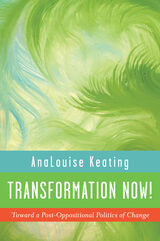 Transformation Now!: Toward a Post-Oppositional Politics of Change
AnaLouise Keating
University of Illinois Press, 2013 In this lively, thought-provoking study, AnaLouise Keating writes in the traditions of radical U.S. women-of-color feminist/womanist thought and queer studies, inviting us to transform how we think about identity, difference, social justice and social change, metaphysics, reading, and teaching. Through detailed investigations of women of color theories and writings, indigenous thought, and her own personal and pedagogical experiences, Keating develops transformative modes of engagement that move through oppositional approaches to embrace interconnectivity as a framework for identity formation, theorizing, social change, and the possibility of planetary citizenship. Speaking to many dimensions of contemporary scholarship, activism, and social justice work, Transformation Now! calls for and enacts innovative, radically inclusionary ways of reading, teaching, and communicating.
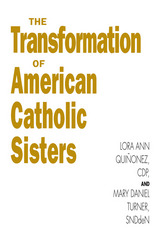 Transformation of American Catholic Sisters
Lora Quinonez
Temple University Press, 1993 "Lora Ann Quiñonez and Mary Daniel Turner once again serve American religious women well. Although their book focuses on the development of the Leadership Conference of Women Religious, it...is also an account of the thought development of American women religious.... Besides describing areas of change, Quiñonez and Turner analyze and interpret them thoroughly and objectively and also compassionately, courageously, and readably."
--Review for Religious
During the past four decades, radical changes have occurred in the personal and corporate lives of Roman Catholic nuns in the United States; in their institutions and ministries; in their relations with laity, clergy, and hierarchy; and in their presence in the public sphere. In this book, Lora Ann Quiñonez and Mary Daniel Turner explore this transformation: the experiences that marked these changes, their effects on the women, and the future suggested by the nature of the reforms.
The movement for change picked up speed in the decade after Vatican Council 11, which mandated the adaptation of religious communities to contemporary milieu. The impact of American culture on the sisters generated a struggle to reconcile American belonging and religious commitment into one identity. The Women's Movement caused a gradual awakening to the reality of gender as an element of personal and corporate identity. It made American nuns confront the structural questions that occur to awakened women and also confront the male Church hierarchy. This book is the first comprehensive analysis of the forces that directed the process by which American sisters have redefined themselves.
"[Quiñonez and Turner ] offer a privileged perspective on the transitions that have taken place in the past 25 years.... [This] is an important work that will enlighten and challenge. It contains pieces of the ongoing transformation that are not found in the many other books on American women's religious life today. American sisters will appreciate this splendid effort to synthesize their experience. Others in the church will find that the experience of American sisters has much resonance with their own."
--National Catholic Reporter
"This well-written and well-documented book shows the energy, creativity, and highly organized response of these women to Vatican Council II and to the momentum which they themselves created. It is a testimony to the dynamism and creativity of the women in religious life in the past forty years. The book is a work of love and a tribute to all those women who have suffered and celebrated the transition thus far."
--Marie J. Giblin, Maryknoll School of Theology
 The Transformation of American Catholicism: The Pittsburgh Laity and the Second Vatican Council, 1950-1972
Timothy Kelly
University of Notre Dame Press, 2009
Most scholars and media analysts have suggested that Vatican II revolutionized American Catholicism, with the changes it mandated filtering down from the Council to the church hierarchy to the laity.
Timothy Kelly's book challenges this assumption, based on his careful tracing of Catholic lay practices in the Pittsburgh Diocese from the 1950s through the 1970s. The lay experience of American Catholics did change dramatically in the 1960s, but Kelly argues that the transformation began earlier, before the Council, and continued throughout the next decade. Kelly examines the discourse of Catholicism in the 1950s and compares this to actual lay behavior. He discusses critical changes introduced by Vatican II and follows the lay response for a decade after the last Council sessions to illuminate Catholic efforts to implement the changes in everyday practice. His individual chapters focus on devotional behavior, liturgical reforms, and broader social and cultural issues.
Kelly's social history reveals that Vatican II was not a shock to a complaisant and unquestioning laity as much as a reform necessary to keep pace with changing religious, social, and cultural sensibilities. As Catholics rejected a heavily devotional religiosity, they sought instead practices that resonated more with their lived experiences. An emphasis on social justice grew, but lay Catholics had not yet charted a clear path by the end of the Council's last session, and by that time, church officials had begun to resist some of the Vatican II reforms. A fascinating study of the most profound transformation in American Catholicism in the last century, Kelly's work is an important contribution to Catholic history.
"Timothy Kelly's well-grounded case study, featuring exceptionally detailed research enlivened by vigorous narrative, is a provocative and valuable contribution to the literature on twentieth-century U.S. Catholicism." —James Fisher, Fordham University
“Finally, a book that looks at how real Catholics negotiated the societal and religious changes of the fifties and sixties. Kelly has accomplished the hard task of assembling a social history of a people in transition. His painstakingly careful research is particularly sensitive to how Catholics dealt with the changing status of women and the racial geography of Pittsburgh. From the bottom up we see how American Catholics were reworking their religion long before the advent of the Second Vatican Council.” — Colleen McDannell, Professor and Sterling M. McMurrin Professor of Religious Studies, University of Utah
“Case studies of the rich history of American Catholicism have already advanced our knowledge of the interactions between religion and social experience. Timothy Kelly's imaginative exploration of Pittsburgh's involvement in the transformations of modern Catholicism shoots right to the top of the list, in showing the complex linkages among laity, clergy, and the larger Church in causing and processing change.” —Peter N. Stearns, Provost, George Mason University
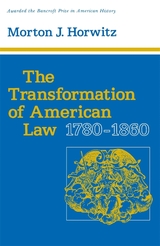 The Transformation of American Law, 1780–1860
Morton J. Horwitz
Harvard University Press, 1977 In a remarkable book based on prodigious research, Morton J. Horwitz offers a sweeping overview of the emergence of a national (and modern) legal system from English and colonial antecedents. He treats the evolution of the common law as intellectual history and also demonstrates how the shifting views of private law became a dynamic element in the economic growth of the United States.
Horwitz's subtle and sophisticated explanation of societal change begins with the common law, which was intended to provide justice for all. The great breakpoint came after 1790 when the law was slowly transformed to favor economic growth and development. The courts spurred economic competition instead of circumscribing it. This new instrumental law flourished as the legal profession and the mercantile elite forged a mutually beneficial alliance to gain wealth and power.
The evolving law of the early republic interacted with political philosophy, Horwitz shows. The doctrine of laissez-faire, long considered the cloak for competition, is here seen as a shield for the newly rich. By the 1840s the overarching reach of the doctrine prevented further distribution of wealth and protected entrenched classes by disallowing the courts very much power to intervene in economic life.
This searching interpretation, which connects law and the courts to the real world, will engage historians in a new debate. For to view the law as an engine of vast economic transformation is to challenge in a stunning way previous interpretations of the eras of revolution and reform.
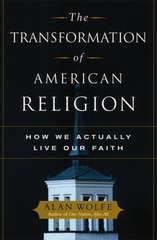 The Transformation of American Religion: How We Actually Live Our Faith
Alan Wolfe
University of Chicago Press, 2005 American religion—like talk of God—is omnipresent. Popular culture is awash in religious messages, from the singing cucumbers and tomatoes of the animated VeggieTales series to the bestselling "Left Behind" books to the multiplex sensation The Passion of the Christ. In The Transformation of American Religion, sociologist Alan Wolfe argues that the popularity of these cartoons, books, and movies is proof that religion has become increasingly mainstream. In fact, Wolfe argues, American culture has come to dominate American religion to such a point that, as Wolfe writes, "We are all mainstream now."
The Transformation of American Religion represents the first systematic effort in more than fifty years to bring together a wide body of literature about worship, fellowship, doctrine, tradition, identity, and sin to examine how Americans actually live their faith. Emphasizing personal stories, Wolfe takes readers to religious services across the nation-an Episcopal congregation in Massachusetts, a Catholic Mass in a suburb of Detroit, an Orthodox Jewish temple in Boston-to show that the stereotype of religion as a fire-and-brimstone affair is obsolete. Gone is the language of sin and damnation, and forgotten are the clear delineations between denominations; they have been replaced with a friendly God and a trend towards sampling new creeds and doctrines. Overall, Wolfe reveals American religion as less radical, less contentious, and less dangerous than it is generally perceived to be.
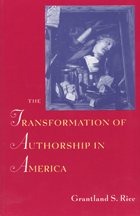 The Transformation of Authorship in America
Grantland S. Rice
University of Chicago Press, 1997 Did the emergence of a free press liberate eighteenth-century American authors? Most critics and historians have assumed so. In a study certain to force a rethinking of early American literary culture, Grantland S. Rice overturns this dominant view. Rice argues that the lapse of Puritan censorship, the consolidation of copyright law, and the explosion of a commercial print culture confronted writers in the new United States with a striking predicament: the depoliticization and commodification of public expression.
Rice shows that the rigorous censorship practiced by Puritan authorities conferred an implicit prestige on texts as civic interventions, helping to foster a vigorous and indigenous tradition of sociopolitical criticism. With special attention to the sudden emergence of the novel in post-revolutionary America, Rice reveals how the emergence of economic liberalism undermined the earlier tradition of political writing by transforming American authorship from an expression of individual civic conscience to a market-oriented profession.
Includes discussions of the writings of Benjamin Franklin, Michel-Guillaume-Jean de Crèvecoeur, and Hugh Henry Brackenridge.
The Transformation of Chinese Socialism
Chun Lin
Duke University Press, 2006 In this significant contribution to both political theory and China studies, Lin Chun provides a critical assessment of the scope and limits of socialist experiments in China, analyzing their development since the victory of the Chinese communist revolution in 1949 and reflecting on the country’s likely paths into the future. Lin suggests that China’s twentieth-century trajectory be grasped in terms of the collective search by its people for a modern alternative to colonial modernity, bureaucratic socialism, and capitalist subordination. Evaluating contending interpretations of the formation and transformation of Chinese socialism in the contemporary conditions of global capitalism, Lin argues that the post-Mao reform model must be remade.
The Transformation of Corporate Control
Neil Fligstein
Harvard University Press, 1990 Neil Fligstein challenges prevailing theories of the corporation and proposes a radically new view in which the firm is driven not so much by market forces as by the state and its policies toward business. Fligstein traces the evolution, over the past century, of corporate strategy from an initial emphasis on direct control to one of manufacturing, then sales and marketing, and finally today’s focus on finance.
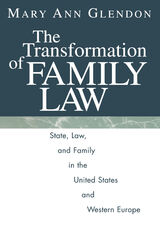 The Transformation of Family Law: State, Law, and Family in the United States and Western Europe
Mary Ann Glendon
University of Chicago Press, 1989 Mary Ann Glendon offers a comparative and historical analysis of rapid and profound changes in the legal system beginning in the 1960s in England, France, West Germany, Sweden, and the United States, while bringing new and insightful interpretation and critical thought to bear on the explosion of legislation in the last decade.
"Glendon is generally acknowledged to be the premier comparative law scholar in the area of family law. This volume, which offers an analytical survey of the changes in family law over the past twenty-five years, will burnish that reputation. Essential reading for anyone interested in evaluating the major changes that occurred in the law of the family. . . . [And] of serious interest to those in the social sciences as well."—James B. Boskey, Law Books in Review
"Poses important questions and supplies rich detail."—Barbara Bennett Woodhouse, Texas Law Review
"An impressive scholarly documentation of the legal changes that comprise the development of a conjugally-centered family system."—Debra Friedman, Contemporary Sociology
"She has painted a portrait of the family in which we recognize not only ourselves but also unremembered ideological forefathers. . . . It sends our thoughts out into unexpected adventures."—Inga Markovits, Michigan Law Review
The Transformation of Nature in Art
Ananda Kentish Coomaraswamy
Harvard University Press In contrast to contemporary western theories of aesthetics, scholastic and Oriental art agree that art imitates nature in her manner of operation, not nature visually. Things, including works of art, are what they are by reason of the determining forms or ideas embodied in them, and valid judgments are impossible without an understanding of these formative ideas. Christian and Oriental art, in other words, are languages; post-renaissance art, a spectacle. Aesthetic experience, then, consists in the combined intellectual and emotional delight of the spectator’s self-identification with the indicated content. Mr Coomaraswamy’s book sets forth this view of art and at the same time makes accessible certain Oriental, and especially Indian, source material hitherto almost unknown to students.
The Transformation of Old Age Security: Class and Politics in the American Welfare State
Jill Quadagno
University of Chicago Press, 1988 Why did the United States lag behind Germany, Britain, and Sweden in adopting a national plan for the elderly? When the Social Security Act was finally enacted in 1935, why did it depend on a class-based double standard? Why is old age welfare in the United States still less comprehensive than its European counterparts? In this sophisticated analytical chronicle of one hundred years of American welfare history, Jill Quadagno explores the curious birth of old age assistance in the United States. Grounded in historical research and informed by social science theory, the study reveals how public assistance grew from colonial-era poor laws, locally financed and administered, into a massive federal bureaucracy.
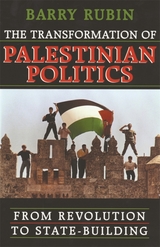 The Transformation of Palestinian Politics: From Revolution to State-Building
Barry Rubin
Harvard University Press, 1999 This book is a comprehensive overview and analysis of the Palestinians’ travail as they move from revolutionary movement to state. Barry Rubin outlines the difficulties in the transition now underway arising from Palestinian history, society, and diplomatic agreements. He writes about the search for a national identity, the choice of an economic system, and the structure of government.
Rubin finds the political system interestingly distinctive—it appears to be a pluralist dictatorship. There are free elections, multiple parties, and some latitude in civil liberties. Yet there is a relatively unrestrained chief executive and arbitrariness in applying the law because of restraints on freedom. The new ruling elite is a complex mixture of veteran revolutionaries, heirs to large and wealthy families, professional soldiers, technocrats, and Islamic clerics. Beyond explaining how the executive and legislative branches work, Rubin factors in the role of public opinion in the peace process, the place of nongovernmental institutions, opposition movements, and the Palestinian Authority’s foreign relations—including Palestinian views and interactions with the Arab world, Israel, and the United States.
This book is drawn from documents in Arabic, Hebrew, and English, as well as interviews and direct observations. Rubin finds that, overall, the positive aspects of the Palestinian Authority outweigh the negative, and he foresees the establishment of a Palestinian state. His charting of the triumphs and difficulties of this state-in-the-making helps predict and explain future dramatic developments in the Middle East.
The Transformation of Solidarity: Changing Risks and the Future of the Welfare State
Edited by Romke van der Veen, Mara Yerkes, and Peter Achterberg
Amsterdam University Press, 2012 This pioneering study investigates the consequences of social indivualization and economic globalization on the welfare state. With a particular focus on solidarity, or the willingness to accept shared risks, the editors look at the dynamics between the aging and the young, the healthy and the sick, and the working and unemployed within welfare states. The Transformation of Solidarity translates recent changes in the global economy into risk management strategies for businesses, unions, and government administrators, while pinpointing how the public views these risks. The editors of this important volume bring together a wide range of papers that approach this topic from a variety of perspectives, and they provide a vital new tool for understanding how welfare states operate.
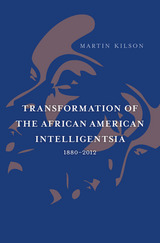 Transformation of the African American Intelligentsia, 1880–2012
Martin Kilson
Harvard University Press, 2014 After Reconstruction, African Americans found themselves free, yet largely excluded from politics, higher education, and the professions. Drawing on his professional research into political leadership and intellectual development in African American society, as well as his personal roots in the social-gospel teachings of black churches and at Lincoln University (PA), the political scientist Martin Kilson explores how a modern African American intelligentsia developed in the face of institutionalized racism. In this survey of the origins, evolution, and future prospects of the African American elite, Kilson makes a passionate argument for the ongoing necessity of black leaders in the tradition of W. E. B. Du Bois, who summoned the “Talented Tenth” to champion black progress.
Among the many dynamics that have shaped African American advancement, Kilson focuses on the damage—and eventual decline—of color elitism among the black professional class, the contrasting approaches of Du Bois and Booker T. Washington, and the consolidation of an ethos of self-conscious racial leadership. Black leaders who assumed this obligation helped usher in the civil rights movement. But mingled among the fruits of victory are the persistent challenges of poverty and inequality. As the black intellectual and professional class has grown larger and more influential than ever, counting the President of the United States in its ranks, new divides of class and ideology have opened in African American communities. Kilson asserts that a revival of commitment to communitarian leadership is essential for the continued pursuit of justice at home and around the world.
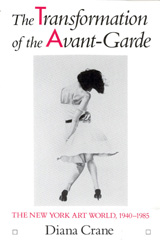 The Transformation of the Avant-Garde: The New York Art World, 1940-1985
Diana Crane
University of Chicago Press, 1989 With the rise of Abstract Expressionism, New York City became the acknowledged center of the avant-garde. Diana Crane documents the transformation of the New York art world between 1940 and 1985, both in the artistic styles that emerged during this period and the expansion of the number and types of institutions that purchased and displayed various works.
Crane's account is built around discussions of seven styles: Abstract Expressionism in the forties; Pop art and Minimalism in the sixties; Figurative painting, Photorealism, and Pattern painting in the early seventies; and Neo-Expressionism in the early eighties. Demonstrating that the New York art world moved toward increasing acceptance of dominant American cultural trends, Crane offers a fascinating look not only at the intricacies of New York's artistic inner circle but also at the sociology of work and professions, the economics of culture markets such as "dealing art," and the sociology of culture.
The Transformation of the Christian Right in the 1980s
Matthew C. Moen
University of Alabama Press, 2008 The Transformation of the Christian Right chronicles and analyzes the remarkable changes that have occurred in the Christian Right from its emergence in the late 1970s to the present. It documents the rapid turnover of Christian-Right organizations and explains the forces driving that kaleidoscopic change. Moen also traces the strategic shift of the movement’s leaders, away from lobbying the Congress and toward mobilizing conservative activists in the grass roots; he demonstrates the substitution of liberal language (with its emphasis on “equality, rights, and freedom”) for moralistic language (with its focus on “right and wrong”). Much has been written about the Christian Right’s impact on politics but little about how years of political activism have shaped and influenced the Christian Right. Moen addresses that neglected side of the issue.
 Transformation of the Mormon Culture Region
Ethan R. Yorgason
University of Illinois Press, 2010 In this unique study, Ethan R. Yorgason examines the Mormon "culture region" of the American West, which in the late nineteenth century was characterized by sexual immorality, communalism, and anti-Americanism but is now marked by social conservatism. Foregrounding the concept of region, Yorgason traces the conformist-conservative trajectory that arose from intense moral and ideological clashes between Mormons and non-Mormons from 1880 to 1920. Looking through the lenses of regional geography, history, and cultural studies, Yorgason investigates shifting moral orders relating to gender authority, economic responsibility, and national loyalty, community, and home life. Transformation of the Mormon Culture Region charts how Mormons and non-Mormons resolved their cultural contradictions over time by a progressive narrowing of the range of moral positions on gender (in favor of Victorian gender relations), the economy (in favor of individual economics), and the nation (identifying with national power and might). Mormons and non-Mormons together constructed a regime of effective coexistence while retaining regional distinctiveness.
The Transformation of the Roman West
Ian Wood
Arc Humanities Press, 2018 The history of the Late Roman Empire in the West has been divided into two parallel worlds, analysed either as a political and economic transformation or as a religious and cultural one. But how do these relate one to another? In this concise and effective synthesis, Ian Wood considers some ways in which religion and the Church can be reintegrated into what has become a largely secular discourse. The Church was at the heart of the changes that look place at the end of the Western Empire, not only regarding religion, but indeed every aspect of politics and society. Wood contends that the institutionalisation of the Church on a huge scale was a key factor in the transformation which began in the early fourth century with an incipiently Christian Roman Empire and ended three hundred years later in a world of thoroughly Christianised kingdoms.
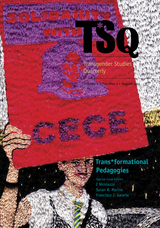 Trans*formational Pedagogies
Z. Nicolazzo, Susan B. Marine, and Francisco J. Galarte, special issue editors
Duke University Press With this special issue on “Trans*formational Pedagogies,” guest editors Z Nicolazzo, Susan B. Marine, and Francisco J. Galarte redress such absences and argue that explicit attention to the institutional contexts of formal educational activities should be central to trans studies in the moment of its increasingly rapid institutionalization. The collection of essays they offer here range from an examination of how teachers renaturalize the gender binary in classroom practices, to a study documenting the privileging of masculine norms of embodiment among trans men in college, to a dialogue between two trans teachers in Spain about their approaches to trans* pedagogy in public school classrooms. The articles make visible the reproduction of gender normativity in most educational settings and point to the transformative potential of education for dismantling such unthinking “genderism.”
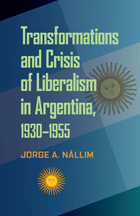 Transformations and Crisis of Liberalism in Argentina, 1930–1955
Jorge A. Nallim
University of Pittsburgh Press, 2012 In this original study, Jorge A. Nállim chronicles the decline of liberalism in Argentina during the volatile period between two military coups—the 1930 overthrow of
Hipólito Yrigoyen and the deposing of Juan Perón in 1955. While historians have primarily focused on liberalism in economic or political contexts, Nállim instead documents a wide range of locations where liberalism was claimed and ultimately marginalized in the pursuit of individual agendas.
Nállim shows how concepts of liberalism were espoused by various groups who “invented traditions” to legitimatize their methods of political, religious, class, intellectual, or cultural hegemony. In these deeply fractured and corrupt processes, liberalism lost political favor and alienated the public. These events also set the table for Peronism and stifled the future of progressive liberalism in Argentina.
Nállim describes the main political parties of the period and deconstructs their liberal discourses. He also examines major cultural institutions and shows how each attached liberalism to their cause.
Nállim compares and contrasts the events in Argentina to those in other Latin American nations and reveals their links to international developments. While critics have positioned the rhetoric of liberalism during this period as one of decadence or irrelevance, Nállim instead shows it to be a vital and complex factor in the metamorphosis of modern history in Argentina and Latin America as well.
Transformations: Art and the City
Edited by Elizabeth M. Grierson
Intellect Books, 2017 The contributors to Transformations explore the interactions between people and their urban surroundings through site-specific art and creative practices, tracing the ways in which people inhabit, imagine, and shape their cities. Drawing on the work of global artists, from Cambodia to Australia, New Zealand to the United States, this collection investigates the politics and democratization of space through an examination of art, education, justice, and the role of the citizen in the city. The essays explore how creative practices can work in tandem with ever-changing urban technologies and ecologies to both disrupt and shape urban public spaces.
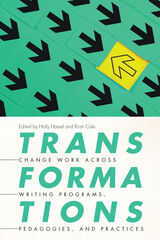 Transformations: Change Work across Writing Programs, Pedagogies, and Practices
Holly Hassel
Utah State University Press, 2021 As teaching practices adapt to changing technologies, budgetary constraints, new student populations, and changing employment practices, writing programs remain full of people dedicated to helping students improve their writing. This edited volume offers strategies for implementing large- and small-scale changes in writing programs by focusing on transformations—the institutional, programmatic, curricular, and labor practices that work together to shape our teaching and learning experiences of writing and rhetoric in higher education.
The collection includes chapters from multiple award-winning writing programs, including the recipients of the Two-Year College Association’s Outstanding Programs in English Award and the Conference on College Composition and Communication’s Writing Program Certificate of Excellence. These authors offer perspectives that demonstrate the deep work of transformation in writing programs and practices writ large, confirm the ways in which writing programs are connected to and situated within larger institutional and disciplinary contexts, and outline successful methods for navigating these contexts in order to transform the work.
In using the prism of transformation as the organizing principle for the collection, Transformations offers a range of strategies for adapting writing programs so that they meet the needs of students and teachers in service of creating equitable, ethical literacy instruction in a range of postsecondary contexts.
Contributors: Leah Anderst, Cynthia Baer, Ruth Benander, Mwangi Alex Chege, Jaclyn Fiscus-Cannaday, Joanne Giordano, Rachel Hall Buck, Sarah Henderson Lee, Allison Hutchinson, Lynee Lewis Gaillet, Jennifer Maloy, Neil Meyer, Susan Miller-Cochran, Ruth Osorio, Lori Ostergaard, Shyam Pandey, Cassie Phillips, Brenda Refaei, Heather Robinson, Shelley Rodrigo, Julia Romberger, Tiffany Rousculp, Megan Schoen, Paulette Stevenson
 Transformations in American Legal History
Daniel W. Hamilton
Harvard University Press, 2009 During his career at Harvard, Morton Horwitz changed the questions legal historians ask. The Transformation of American Law, 1780–1860 (1977) disclosed the many ways that judge-made law favored commercial and property interests and remade law to promote economic growth. The Transformation of American Law, 1870–1960 (1992) continued that project, with a focus on ideas that reshaped law as we struggled for objective and neutral legal responses to our country’s crises.
In this book, Horwitz’s students re-examine legal history from America’s colonial era to the late twentieth century. They ask classic Horwitzian questions, of how legal doctrine, thought, and practice are shaped by the interests of the powerful, as well as by the ideas of lawyers, politicians, and others. The essays address current questions in legal history, from colonial legal practice to questions of empire, civil rights, and constitutionalism in a democracy. The essays are, like Horwitz, provocative and original as they continue his transformation of American legal history.
 Transformations in American Legal History
Daniel W. Hamilton
Harvard University Press Over the course of his career at Harvard, Morton Horwitz changed the questions legal historians ask. The Transformation of American Law, 1780–1860 (1977) disclosed the many ways that judge-made law favored commercial and property interests and remade law to promote economic growth. The Transformation of American Law, 1870–1960 (1992) continued that project, with a focus on ideas that reshaped law as we struggled for objective and neutral legal responses to our country’s crises. In more recent years he has written extensively on the legal realists and the Warren Court.
Following an earlier festschrift volume by his former students, this volume includes essays by Horwitz’s colleagues at Harvard and those from across the academy, as well as his students. These essays assess specific themes in Horwitz’s work, from the antebellum era to the Warren Court, from jurisprudence to the influence of economics on judicial doctrine. The essays are, like Horwitz, provocative and original as they continue his transformation of American legal history.
Transformations of Circe: THE HISTORY OF AN ENCHANTRESS
Judith Yarnall
University of Illinois Press, 1994 Beginning with a detailed study of Homer's balance of negative and positive elements in the Circe-Odysseus myth, Judith Yarnall employs text and illustrations to demonstrate how Homer's Circe is connected with age-old traditions of goddess worship. She then examines how the image of a one-sided "witch," who first appeared in the commentary of Homer's allegorical interpreters, proved remarkably persistent, influencing Virgil and Ovid. Yarnall concludes with a discussion of work by Margaret Atwood and Eudora Welty in which the enchantress at last speaks in her own voice: that of a woman isolated by, but unashamed of, her power.
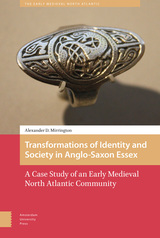 Transformations of Identity and Society in Anglo-Saxon Essex: A Case Study of an Early Medieval North Atlantic Community
Alexander D. Mirrington
Amsterdam University Press, 2019 Transformations of Identity and Society in Anglo-Saxon Essex: A Case Study of an Early Medieval North Atlantic Community presents the results of a comprehensive archaeological study of early medieval Essex (c.AD 400-1066). This region provides an important case study for examining coastal societies of north-western Europe. Drawing on a wealth of new data, the author demonstrates the profound influence of maritime contacts on changing expressions of cultural affiliation. It is argued that this Continental orientation reflects Essex’s longterm engagement with the emergent, dynamic North Sea network. The wide chronological focus and inclusive dataset enables long-term socio-economic continuity and transformation to be revealed. These include major new insights into the construction of group identity in Essex between the 5th and 11th centuries and the identification of several previously unknown sites of exchange. The presentation also includes the first full archaeological study of Essex under ‘Viking’ rule.
 Transformations of La Familia on the U.S.-Mexico Border
Raquel R. Marquez
University of Notre Dame Press, 2008
No international relationship of the United States is as encumbered by history, geography, culture, language, and economics as the one with Mexico. Given the scale and importance of the flow of commerce and culture across the border, however, surprisingly few studies have examined the micro-level impact of border immigration patterns, economic systems, and policies on families in the region. Recognizing this void, the women scholars represented here—all of whom have studied and lived near la frontera—explore the complexity of border dynamics. They offer a well-rounded portrayal of Latino families and their response to changes at the border.
The authors focus primarily on women and changes within families on the border—in response to women’s economic strategies, labor market participation, and interactions with relatives and others. Quantitative chapters provide demographic analyses of population changes in new immigrant areas, the conditions of children and families along the border, and the work patterns of border families and women entrepreneurs. Qualitative chapters provide insights into the rites of passage celebrated across borders and the transnational lives of women and their families. The volume concludes with recommendations for collaborative U.S.-Mexico border policies that support families.
“This is an excellent and highly coherent collection of papers dealing with the impact on Mexican and Mexican origin families of living in the transnational space of the U.S.-Mexico border. It is particularly useful because of its exceptional range of perspectives, combining demography, history, ethnography and public policy analysis. Census and survey data from the U.S. and Mexico, life histories, cross-border social and economic relationships, and the perceptions of border residents bring out in rich detail the complex interdependence of both sides of the border. There are valuable accounts of the ways in which women and youth are socialized into transnational identities on both sides of the borders through family and community rituals and even through the teaching of English in Mexico. The focus on families brings out graphically the particular challenges of poverty and migration for women, who increasingly work outside the home even when married and for migrant children who are vulnerable to school drop-out on both sides of the border. “ —Bryan R. Roberts, C.B. Smith Sr. Chair in U.S.-Mexico Relations, University of Texas at Austin
“This timely volume provides a unique comprehensive presentation of cultural and socioeconomic issues tied to the border, particularly as it relates to the everyday lives of transnational families and their on-going negotiation of identities. As a result, the authors’ conclusions and recommendations are imbued with a power of analysis that is grounded in their complex engagement of the issues. This is an outstanding book of significance for scholars and students working on issues of transnationalism, the political economy of migration, immigration, and border culture.” —Antonia Darder, University of Illinois at Urbana-Champaign
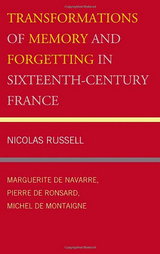 Transformations of Memory and Forgetting in Sixteenth-Century France: Marguerite de Navarre, Pierre de Ronsard, Michel de Montaigne
Nicolas Russell
University of Delaware Press, 2011 This book proposes that in a number of French Renaissance texts, produced in varying contexts and genres, we observe a shift in thinking about memory and forgetting. Focusing on a corpus of texts by Marguerite de Navarre, Pierre de Ronsard, and Michel de Montaigne, it explores several parallel transformations of and challenges to traditional discourses on the human faculty of memory. Throughout Classical Antiquity and the Middle Ages, a number of influential authors described memory as a powerful tool used to engage important human concerns such as spirituality, knowledge, politics, and ethics. This tradition had great esteem for memory and made great efforts to cultivate it in their pedagogical programs. In the early sixteenth century, this attitude toward memory started to be widely questioned. The invention of the printing press and the early stages of the scientific revolution changed the intellectual landscape in ways that would make memory less important in intellectual endeavors. Sixteenth-century writers began to question the reliability and stability of memory. They became wary of this mental faculty, which they portrayed as stubbornly independent, mysterious, unruly, and uncontrollable–an attitude that became the norm in modern Western thought as is illustrated by the works of Descartes, Locke, Freud, Proust, Foucault, and Nora, for example. Writing in this new intellectual landscape, Marguerite de Navarre, Ronsard, and Montaigne describe memory not as a powerful tool of the intellect but rather as an uncontrollable mental faculty that mirrored the uncertainty of human life. Their characterization of memory emerges from an engagement with a number of traditional ideas about memory. Notwithstanding the great many differences in concerns of these writers and in the nature of their texts, they react against or transform their classical and medieval models in similar ways. They focus on memory’s unruly side, the ways that memory functions independently of the will. They associate memory with the fluctuations of the body (the organic soul) rather than the stability of the mind (the intellectual soul). In their descriptions of memory, these authors both reflect and contribute to a modern understanding of and attitude towards this mental faculty. Published by University of Delaware Press. Distributed worldwide by Rutgers University Press.
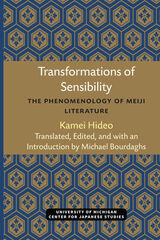 Transformations of Sensibility: The Phenomenology of Meiji Literature
Kamei Hideo; Translated, edited, and with an introduction by Michael Bourdaghs
University of Michigan Press, 2002 First published in Japan in 1983, this book is now a classic in modern Japanese literary studies. Covering an astonishing range of texts from the Meiji period (1868–1912), it presents sophisticated analyses of the ways that experiments in literary language produced multiple new—and sometimes revolutionary—forms of sensibility and subjectivity. Along the way, Kamei Hideo carries on an extended debate with Western theorists such as Saussure, Bakhtin, and Lotman, as well as with such contemporary Japanese critics as Karatani Kōjin and Noguchi Takehiko. Transformations of Sensibility deliberately challenges conventional wisdom about the rise of modern literature in Japan and offers highly original close readings of works by such writers as Futabatei Shimei, Tsubouchi Shōyō, Higuchi Ichiyō, and Izumi Kyōka, as well as writers previously ignored by most scholars. It also provides a new critical theorization of the relationship between language and sensibility, one that links the specificity of Meiji literature to broader concerns that transcend the field of Japanese literary studies. Available in English translation for the first time, it includes a new preface by the author and an introduction by the translation editor that explain the theoretical and historical contexts in which the work first appeared.
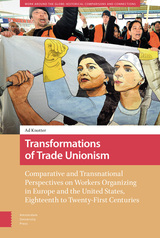 Transformations of Trade Unionism: Comparative and Transnational Perspectives on Workers Organizing in Europe and the United States, Eighteenth to Twenty-First Centuries
Ad Knotter
Amsterdam University Press, 2019 The historical experiences of workers organizing in Europe and the United States figure among the many forms of workers’ resistance resulting from the variety of labour relations in the global past. They cannot and will not be uniformly duplicated or copied from their present form in the global transformations of labour and workers’ movements that we are witnessing today. Nevertheless, in the twentieth century trade unionism as a form of collective agency among workers became a global phenomenon. With growing numbers of workers being exposed to wage labour and labour markets, the cases of workers organizing in the original heartlands of trade unionism in Europe and the United States can provide a historical background for future prospects and transformations. Based on comparisons of long-term developments and focusing on transnational connections, Transformations of Trade Unionism shows that historically there have been many varieties of trade unionism, emerging independently or transforming older ones, and that these varieties and transformations can be explained by specific and changing labour regimes. The case studies all start from Dutch examples, or incorporate a Dutch element, but the comparative and transnational approach connects these histories to general developments in Europe and United States from the eighteenth to the twenty-first century. This publication was made possible thanks to the generous financial support of the Stichting Unger - van Brero Fonds
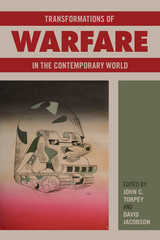 Transformations of Warfare in the Contemporary World
John C. Torpey
Temple University Press, 2016 Today’s warfare has moved away from being an event between massed national populations and toward small numbers of combatants using high-tech weaponry. The editors of and contributors to the timely collection Transformations of Warfare in the Contemporary World show that this shift reflects changes in the technological, strategic, ideological, and ethical realms. The essays in this volume discuss: ·the waning connection between citizenship and soldiering; ·the shift toward more reconstructive than destructive activities by militaries; ·the ethics of irregular or asymmetrical warfare; ·the role of novel techniques of identification in military settings; ·the stress on precision associated with targeted killings and kidnappings; ·the uses of the social sciences in contemporary warfare. In his concluding remarks, David Jacobson explores the extent to which the contemporary transformation of warfare is a product of a shift in the character of the combatants themselves. Contributors include: Ariel Colonomos, Roberto J. González, Travis R. Hall, Saskia Hooiveld, Rob Johnson, Colonel C. Anthony Pfaff, Ian Roxborough, and the editors
Transformations: Thinking after Heidegger
Gail Stenstad
University of Wisconsin Press, 2006 How are we to think and act constructively in the face of today’s environmental and political catastrophes? Gail Stenstad finds inspiring answers in the thought of German philosopher Martin Heidegger. Rather than simply describing or explaining Heidegger’s transformative way of thinking, Stenstad’s writing enacts it, bringing new insight into contemporary environmental, political, and personal issues. Readers come to understand some of Heidegger’s most challenging concepts through experiencing them. This is a truly creative scholarly work that invites all readers to carry Heidegger’s transformative thinking into their own areas of deep concern.
Transformative Civic Education in Democratic Societies
Tetyana Hoggan-Kloubert
Michigan State University Press, 2023 Democracy is neither inevitable nor guaranteed to last. To survive, democracy needs people adequately prepared to enact it. Such preparation for effective citizenship in a complex and plural world requires an adult civic education, one that goes beyond simple knowledge acquisition. It requires a transformative education to help learners become agents and co-shapers of their worlds. This book offers examples of the roles that civic education has played and can play in different communities. In this collection, scholars from around the world report and reflect on civic adult education, examining approaches, paradigms, and concepts that help us to act in culturally, ethnically, linguistically, and religiously diverse societies.
Transformative Justice: Israeli Identity on Trial
Leora Bilsky
University of Michigan Press, 2004 Transformative Justice, Leora Bilsky's landmark study of Israeli political trials, poses this deceptively simple question. The four trials that she analyzes focus on identity, the nature of pluralism, human rights, and the rule of law-issues whose importance extends far beyond Israel's borders. Drawing on the latest work in philosophy, law, history, and rhetoric, Bilsky exposes the many narratives that compete in a political trial and demonstrates how Israel's history of social and ideological conflicts in the courtroom offers us a rare opportunity to understand the meaning of political trials. The result is a bold new perspective on the politics of justice and its complex relationship to the values of liberalism.
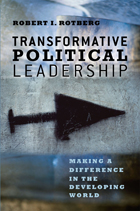 Transformative Political Leadership: Making a Difference in the Developing World
Robert I. Rotberg
University of Chicago Press, 2012 Accomplished political leaders have a clear strategy for turning political visions into reality. Through well-honed analytical, political, and emotional intelligence, leaders chart paths to promising futures that include economic growth, material prosperity, and human well-being. Alas, such leaders are rare in the developing world, where often institutions are weak and greed and corruption strong—and where responsible leadership therefore has the potential to effect the greatest change. In Transformative Political Leadership, Robert I. Rotberg focuses on the role of leadership in politics and argues that accomplished leaders demonstrate a particular set of skills. Through illustrative case studies of leaders who have performed ably in the developing world—among them Nelson Mandela in South Africa, Seretse Khama in Botswana, Lee Kuan Yew in Singapore, and Kemal Ataturk in Turkey—Rotberg examines how these leaders transformed their respective countries. The importance of capable leadership is woefully understudied in political science, and this book will be an important tool in exploring how leaders lead and how nations and institutions are built.
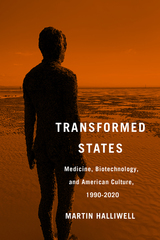 Transformed States: Medicine, Biotechnology, and American Culture, 1990–2020
Martin Halliwell
Rutgers University Press, 2025 Honourable Mention, British Association of American Studies Book Award
Transformed States offers a timely history of the politics, ethics, medical applications, and cultural representations of the biotechnological revolution, from the Human Genome Project to the COVID-19 pandemic. In exploring the entanglements of mental and physical health in an age of biotechnology, it views the post–Cold War 1990s as the horizon for understanding the intersection of technoscience and culture in the early twenty-first century.
The book draws on original research spanning the presidencies of George H. W. Bush and Joe Biden to show how the politics of science and technology shape the medical uses of biotechnology. Some of these technologies reveal fierce ideological conflicts in the arenas of cloning, reproduction, artificial intelligence, longevity, gender affirmation, vaccination and environmental health. Interweaving politics and culture, the book illustrates how these health issues are reflected in and challenged by literary and cinematic texts, from Oryx and Crake to Annihilation, and from Gattaca to Avatar.
By assessing the complex relationship between federal politics and the biomedical industry, Transformed States develops an ecological approach to public health that moves beyond tensions between state governance and private enterprise. To that end, Martin Halliwell analyzes thirty years that radically transformed American science, medicine, and policy, positioning biotechnology in dialogue with fears and fantasies about an emerging future in which health is ever more contested.
Along with the two earlier books, Therapeutic Revolutions (2013) and Voices of Mental Health (2017), Transformed States is the final volume of a landmark cultural and intellectual history of mental health in the United States, journeying from the combat zones of World War II to the global emergency of COVID-19.
 Transforming American Medicine: A Twenty-Year Retrospective on The Social Transformation of American Medicine, Volume 29
Keith Wailoo, Timothy Stoltzfus Jost, and Mark Schlesinger, eds.
Duke University Press "I am especially grateful for these nineteen essays . . . because they are so substantial. . . . This collection has proved to be neither a funeral pyre nor a festschrift [for The Social Transformation of American Medicine ], and it has taught me much about the subject and the reception of my work that I did not know."
—Paul Starr, excerpted from his conclusion in "Transforming American Medicine: A Twenty-Year Retrospective on The Social Transformation of American Medicine" Paul Starr’s Controversial Vision
In the early 1980s, as America stood at a crossroads—between New Deal liberalism and the conservatism of "the Reagan Revolution"—so too did American medicine and health care. Engaging this critical moment, Paul Starr’s The Social Transformation of American Medicine stimulated scholars across the disciplines to take stock of medicine’s historical and future trajectories. Starr’s analysis of American health care and medicine, undertaken in the context of broad contemporary societal, political, and cultural forces, earned him the Pulitzer and Bancroft Prizes, as well as garnering enduring public acclaim. Indeed, twenty years after its publication, The Social Transformation of American Medicine is now a standard in disciplines from health law to political science and history. Despite its undeniable import, Starr’s book still provokes argument and strong reaction on all sides, and the question that has puzzled readers since the grand synthesis appeared remains: whether to praise or to criticize it. According to historian Keith Wailoo, health lawyer Timothy Stoltzfus Jost, and political economist Mark Schlesinger, coeditors of "Transforming American Medicine: A Twenty-Year Retrospective on The Social Transformation of American Medicine," a new special double issue of the Journal of Health Politics, Policy and Law, the answer appears to be to do both. How Does the Vision Hold Up?
Rife with criticism, praise, and in-depth analysis of Starr’s work, this lengthy special issue brings together scholars from many disciplines to offer a comprehensive assessment of the life, the times, the promise, the problems, and the paradoxes of The Social Transformation of American Medicine. Contributors think critically about the problem of the grand narrative, about why doctors and health lawyers loved the book, about why historians reacted to it with ambivalence, about why its themes resonated as they did, and finally about how the political and policy landscape of health care has shifted in the last two decades. Additionally, the issue includes an extensive précis of salient parts of The Social Transformation of American Medicine and concludes with a contentious essay in which Starr himself responds to some of the criticism leveled at him in the preceding pages. With American medicine and health care now at another crossroads—a relentless rise in medical spending on one side, and a persistent sense that Americans are not getting good value for their health care dollar on the other—the issues that Starr originally highlighted (the rise of medical authority and the elaborate dance among doctors, the state, and the corporation) are still of vital importance. "Transforming American Medicine: A Twenty-Year Retrospective on The Social Transformation of American Medicine" vigorously continues the discussion of medicine’s past, present, and future that Starr’s book set in motion. Contributors. Gloria J. Bazzoli, Lawrence P. Casalino, Stefan Gildemeiste
Transforming Anthropology, volume 32 number 1 (April 2024)
The University of Chicago Press
University of Chicago Press Journals, 2024 This is volume 32 issue 1 of Transforming Anthropology. Transforming Anthropology is the flagship journal of the Association of Black Anthropologists. We seek to advance scholarship across the four fields of anthropology and beyond. Transforming Anthropology seeks contributions that reflect the dynamic, transnational, and contested conditions of social worlds — work that pushes the boundaries of discipline and genre. Transforming Anthropology interrogates the contemporary and historical construction of social inequities based on race, ethnicity, class, gender, sexuality, nationality and other invidious distinctions. We remain committed to publishing material that generates dialogues among communities of scholars, activists, artists, and the people with whom they work.
Transforming Anthropology, volume 32 number 2 (October 2024)
The University of Chicago Press
University of Chicago Press Journals, 2024 This is volume 32 issue 2 of Transforming Anthropology. Transforming Anthropology is the flagship journal of the Association of Black Anthropologists. We seek to advance scholarship across the four fields of anthropology and beyond. Transforming Anthropology seeks contributions that reflect the dynamic, transnational, and contested conditions of social worlds — work that pushes the boundaries of discipline and genre. Transforming Anthropology interrogates the contemporary and historical construction of social inequities based on race, ethnicity, class, gender, sexuality, nationality and other invidious distinctions. We remain committed to publishing material that generates dialogues among communities of scholars, activists, artists, and the people with whom they work.
Transforming Anthropology, volume 33 number 1 (April 2025)
The University of Chicago Press
University of Chicago Press Journals, 2025 This is volume 33 issue 1 of Transforming Anthropology. Transforming Anthropology is the flagship journal of the Association of Black Anthropologists. We seek to advance scholarship across the four fields of anthropology and beyond. Transforming Anthropology seeks contributions that reflect the dynamic, transnational, and contested conditions of social worlds — work that pushes the boundaries of discipline and genre. Transforming Anthropology interrogates the contemporary and historical construction of social inequities based on race, ethnicity, class, gender, sexuality, nationality and other invidious distinctions. We remain committed to publishing material that generates dialogues among communities of scholars, activists, artists, and the people with whom they work.
Transforming Cities and Minds through the Scholarship of Engagement: Economy, Equity, and Environment
Lorlene Hoyt
Vanderbilt University Press, 2013 Written by engaged scholars and practitioners, Transforming Minds and Cities is an "instrument-for-action" on the problems faced by U.S. cities that have suffered from decades of disinvestment. The book advocates the concept of reciprocal knowledge: real learning on both sides, campus and city, through a complex network of human relationships. Across the country from Camden to Oakland, the contributors engaged with community partners--hospitals, churches, community development corporations, community foundations, and other rooted institutions--to help restore old cities to life. Their collaborative thesis project engaged them with one another and university staff; it may offer a new paradigm for graduate education.
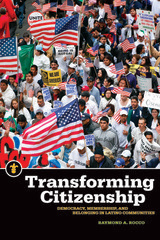 Transforming Citizenship: Democracy, Membership, and Belonging in Latino Communities
Raymond A. Rocco
Michigan State University Press, 2014 In Transforming Citizenship Raymond Rocco studies the “exclusionary inclusion” of Latinos based on racialization and how the processes behind this have shaped their marginalized citizenship status, offering a framework for explaining this dynamic. Contesting this status has been at the core of Latino politics for more than 150 years. Pursuing the goal of full, equal, and just inclusion in societal membership has long been a major part of the struggle to realize democratic normative principles. This illuminating research demonstrates the inherent limitations of the citizenship regime in the United States for incorporating Latinos as full societal members and offers an alternative conception, “associative citizenship,” that provides a way to account for and challenge the pattern of exclusionary belonging that has defined the positions of the Latinos in U.S. society. Through a critical engagement with key theorists such as Rawls, Habermas, Kymlicka, Walzer, Taylor, and Young, Rocco advances an original analysis of the politics of Latino societal membership and citizenship, arguing that the specific processes of racialization that have played a determinative role in creating and maintaining the pattern of social and political exclusions of Latinos have not been addressed by the dominant theories of diversity and citizenship developed in the prevalent literature in political theory.
Transforming Contagion: Risky Contacts among Bodies, Disciplines, and Nations
Fahs, Breanne
Rutgers University Press, 2018 2019 Choice Outstanding Academic Title
Moving from viruses, vaccines, and copycat murder to gay panics, xenophobia, and psychopaths, Transforming Contagion energetically fuses critical humanities and social science perspectives into a boundary-smashing interdisciplinary collection on contagion. The contributors provocatively suggest contagion to be as full of possibilities for revolution and resistance as it is for the descent into madness, malice, and extensive state control. The infectious practices rooted in politics, film, psychological exchanges, social movements, the classroom, and the circulation of a literary text or meme on social media compellingly reveal patterns that emerge in those attempts to re-route, quarantine, define, or even exacerbate various contagions.
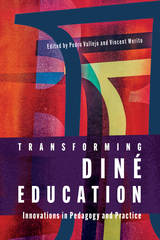 Transforming Diné Education: Innovations in Pedagogy and Practice
Edited by Pedro Vallejo and Vincent Werito
University of Arizona Press, 2022 Transforming Diné Education: Innovations in Pedagogy and Practice gathers the voices of Diné scholars, educators, and administrators to offer critical insights into contemporary programs that place Diné-centered pedagogy into practice.
Bringing together decades of teaching experience, contributors offer perspectives from school- and community-based programs, as well as the tribal, district, and university level. They address special education, language revitalization, wellness, self-determination and sovereignty, and university-tribal-community partnerships. These contributions foreground Diné ways of knowing both as an educational philosophy and as an active practice applied in the innovative programs the book highlights. The contributors deepen our understanding of the state of Navajo education by sharing their perspectives about effective teaching practices and the development of programs that advance educational opportunities for Navajo youth.
This work provides stories of Diné resilience, resistance, and survival. It articulates a Diné-centered pedagogy that will benefit educators and learners for generations to come. Transforming Diné Education fills a need in the larger literature of curricular and programmatic development and provides tools for academic success for all American Indian students.
Contributors
Berlinda Begay
Lorenda Belone
Michael “Mikki” Carroll
Quintina “Tina” Deschenie
Henry Fowler
Richard Fulton
Davis E. Henderson
Kelsey Dayle John
Lyla June Johnston
Tracia Keri Jojola
Tiffany S. Lee
Shawn Secatero
Michael Thompson
Pedro “Pete” Vallejo
Christine B. Vining
Vincent Werito
Duane “Chili” Yazzie
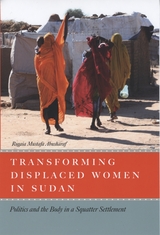 Transforming Displaced Women in Sudan: Politics and the Body in a Squatter Settlement
Rogaia Mustafa Abusharaf
University of Chicago Press, 2009 Over twenty years of civil war in predominantly Christian Southern Sudan has forced countless people from their homes. Transforming Displaced Women in Sudan examines the lives of women who have forged a new community in a shantytown on the outskirts of Khartoum, the largely Muslim, heavily Arabized capital in the north of the country. Sudanese-born anthropologist Rogaia Mustafa Abusharaf delivers a rich ethnography of this squatter settlement based on personal interviews with displaced women and careful observation of the various strategies they adopt to reconstruct their lives and livelihoods. Her findings debunk the myth that these settlements are utterly abject, and instead she discovers a dynamic culture where many women play an active role in fighting for peace and social change. Abusharaf also examines the way women’s bodies are politicized by their displacement, analyzing issues such as religious conversion, marriage, and female circumcision. An urgent dispatch from the ongoing humanitarian crisis in northeastern Africa, Transforming Displaced Women in Sudan will be essential for anyone concerned with the interrelated consequences of war, forced migration, and gender inequality.
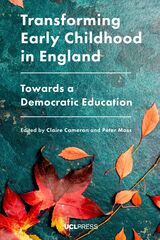 Transforming Early Childhood in England: Towards a Democratic Education
Edited by Claire Cameron and Peter Moss
University College London, 2020 Early childhood education and care has been a political priority in England since 1997, after a long period of neglect. Public funding has increased, and political parties aim to outbid each other in their offerings to families at each election. Transforming Early Childhood in England argues that, despite this attention, the system of early childhood services remains flawed and dysfunctional. National discourse is dominated by questions of the cost and availability of childcare, while a devalued workforce is characterized by a culture of quantifiable targets and measurement. With such deep-rooted problems, Claire Cameron and Peter Moss argue, early childhood education in England needs more than minor improvements. In the context of austerity measures affecting many young families, transformative change is urgent.
Transforming Early Childhood in England offers a critical analysis of the current system and proposes change based on a universal right to education. The book calls for revisions built on democratic principles, where all learning by all children is visible and recognized, educators are trusted and respected, and outcomes-driven targets are replaced. Combining criticism and hope, and drawing on inspiring research, the book is essential reading for students, educators, practitioners, parents, academics, and policymakers.
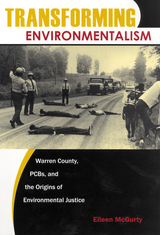 Transforming Environmentalism: Warren County, PCBs, and the Origins of Environmental Justice
McGurty, Eileen
Rutgers University Press, 2006 Contemporary public policy circles are quick to acknowledge that environmental factors contribute to ill health and pose a particular threat to poor and minority communities. But public officials rarely examined the distribution of environmental hazards such as polluted air and contaminated water. In the 1980s, as toxic waste facilities proliferated, the environmental justice movement demanded that impoverished communities no longer be burdened by excessive environmental risks.
In Transforming Environmentalism, Eileen McGurty explores a moment central to the emergence of the environmental justice movement. In 1978, residents of predominantly African American Warren County, North Carolina, were horrified to learn that the state planned to build a landfill in their county to hold forty thousand cubic yards of soil that was contaminated with PCBs from illegal dumping. They responded to the state's plans with a four-year resistance, ending in a month of protests with over 500 arrests from civil disobedience and disruptive actions.McGurty traces the evolving approaches that residents took to contest "environmental racism" in their community and shows how activism in Warren County spurred greater political debate and became a model for communities across the nation. Transforming Environmentalism explores how the specific circumstances of the Warren County events shaped the formation of the environmental justice movement and influenced contemporary environmentalism.
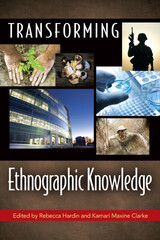 Transforming Ethnographic Knowledge
Edited by Rebecca Hardin and Kamari Maxine Clarke
University of Wisconsin Press, 2012 The ethnographic methods that anthropologists first developed to study other cultures—fieldwork, participant observation, dialogue—are now being adapted for a broad array of applications, such as business, conflict resolution and demobilization, wildlife conservation, education, and biomedicine. In Transforming Ethnographic Knowledge, anthropologists trace the changes they have seen in ethnography as a method and as an intellectual approach, and they offer examples of ethnography’s role in social change and its capacity to transform its practitioners.
Senior scholars Mary Catherine Bateson, Sidney Mintz, and J. Lorand Matory look back at how thinking ethnographically shaped both their work and their lives, and George Marcus suggests that the methods for teaching and training anthropologists need rethinking and updating. The second part of the volume features anthropologists working in sectors where ethnography is finding or claiming new relevance: Kamari Maxine Clarke looks at ethnographers’ involvement (or non-involvement) in military conflict, Csilla Kalocsai employs ethnographic tools to understand the dynamics of corporate management, Rebecca Hardin and Melissa Remis take their own anthropological training into rainforests where wildlife conservation and research meet changing subsistence practices and gendered politics of social difference, and Marcia Inhorn shows how the interests in mobility and diasporic connection that characterize a new generation of ethnographic work also apply to medical technologies, as those mediate fertility and relate to social status in the Middle East.
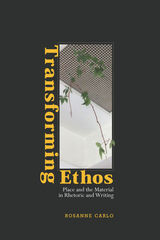 Transforming Ethos: Place and the Material in Rhetoric and Writing
Rosanne Carlo
Utah State University Press, 2020 In Transforming Ethos Rosanne Carlo synthesizes philosophy, rhetorical theory, and composition theory to clarify the role of ethos and its potential for identification and pedagogy for writing studies. Carlo renews focus on the ethos appeal and highlights its connection to materiality and place as a powerful instrument for writing and its teaching—one that insists on the relational and multimodal aspects of writing and makes prominent its inherent ethical considerations and possibilities.
Through case studies of professional and student writings as well as narrative reflections Transforming Ethos imagines the ethos appeal as not only connected to style and voice but also a process of habituation, related to practices of everyday interaction in places and with things. Carlo addresses how ethos aids in creating identification, transcending divisions between the self and other. She shows that when writers tell their experiences, they create and reveal the ethos appeal, and this type of narrative/multimodal writing is central to scholarship in rhetoric and composition as well as the teaching of writing. In addition, Carlo considers how composition is becoming compromised by professionalization—particularly through the idea of “transfer”—which is overtaking the critical work of self-development with others that a writing classroom should encourage in college students.
Transforming Ethos cements ethos as an essential term for the modern practice and teaching of rhetoric and places it at the heart of writing studies. This book will be significant for students and scholars in rhetoric and composition, as well as those interested in higher education more broadly.
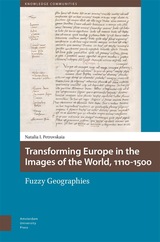 Transforming Europe in the Images of the World, 1110-1500: Fuzzy Geographies
Natalia Petrovskaia
Amsterdam University Press, 2025 This is the first book to examine the wide and important geographical tradition that arose from the description of the world in the Imago mundi – a medieval encyclopedic bestseller, almost unrivalled in popularity from its composition in the 1110s well into the age of print. The Imago mundi was translated into most European vernaculars and extracts from it were adapted into vernacular works ranging from encyclopedias to literary fiction, verse and prose. This is the first study to examine this tradition as a unified whole. It focuses in particular on the permutations undergone by the depiction of the region designated as ‘Europe’ in the original text and its later adaptations. The book demonstrates the incredible flexibility of the original text and how this enabled the transformation of this spatial description to suit the linguistic, political and cultural needs of vernacular adaptations.
 A Transforming Faith: Explorations of Twentieth-Century American Evangelicalism
David Harrington Watt
Rutgers University Press, 1991 Over the course of the twentieth century, evangelicals have in a variety of ways adjusted their world view to accommodate the changes in modern life. At the same time, there are important continuities between the ideas and attitudes of evangelicals in the 1920s and those of the late 1970s. Little attention has actually been paid to changes in this important social and political group since the Scopes trial and the election of 1976, when evangelical concerns played a major role in national politics. David Watt, in this readable and persuasive book, examines what happened in that fifty-year period. This book is an intellectual history of the evangelical movement in the period of its rise to prominence and power.
What Watt finds is that changes were more striking than continuities. Many of these changes manifested themselves in shifts of focus--from an emphasis on the second coming of Christ to the family, from privatization to politicization of religious concerns, from an antipathy to therapeutic practices to an acceptance of many of the assumptions of modern psychology. Watt believes that evangelicalism, as every other "ism," is subject to the influence of conflicting ideologies.
The book explores ideas and attitudes, not practice. It is based on the popular literature produced by evangelicals. In many ways it does not develop and prove a thesis; rather, it puts what we think we know about the experience of evangelicalism in this country into the context of the lives of evangelicals themselves.
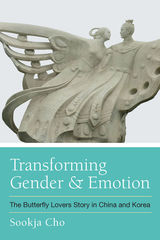 Transforming Gender and Emotion: The Butterfly Lovers Story in China and Korea
Sookja Cho
University of Michigan Press, 2017 The Butterfly Lovers Story, sometimes called the Chinese Romeo and Juliet, has been enduringly popular in China and Korea. In Transforming Gender and Emotion, Sookja Cho demonstrates why the Butterfly Lovers Story is more than just a popular love story. By unveiling the complexity of themes and messages concealed beneath the tale’s modern classification as a tragic love story, this book reveals the tale as a rich academic subject for students of human emotions and relationships, comparative geography and culture, and narrative adaptation. By examining folk beliefs and ideas that abound in the narrative—including rebirth and a second life, the association of human souls and butterflies, and women’s spiritual power—this book presents the Butterfly Lovers Story as an example of local religious narrative. The book’s cross-cultural comparisons, best manifested in its discussion of a shamanic ritual narrative version from the Cheju Island of Korea, frame the story as a catalyst for inclusive, expansive discussion of premodern Korean and Chinese literatures and cultures. This scrutiny of the historical and cultural background behind the formation and popularization of the Cheju Island version sheds light on important issues in the Butterfly Lovers Story that are not frequently discussed—either in past examinations of this particular narrative or in the overall literary studies of China and Korea. This new, open approach presents an innovative framework for understanding premodern literary and cultural space in East Asia.
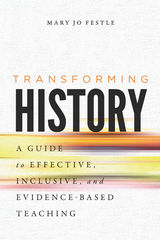 Transforming History: A Guide to Effective, Inclusive, and Evidence-Based Teaching
Mary Jo Festle
University of Wisconsin Press, 2020 Teaching history well is not just a matter of knowing history—it is a set of skills that can be developed and honed through practice. In this theoretically informed but eminently practical volume, Mary Jo Festle examines the recent explosion of research on the teaching and learning of history. Illuminated by her own work, Festle applies the concept of "backward design" as an organizing framework to the history classroom. She provides concrete strategies for setting up an environment that is inclusive and welcoming but still challenging and engaging.
Instructors will improve their own conceptual understandings of teaching and learning issues, as well as receive guidance on designing courses and implementing pedagogies consistent with what research tells us about how students learn. The book offers practical illustrations of assignments, goals, questions, grading rubrics, unit plans, and formats for peer observation that are adaptable for courses on any subject and of any size. Transforming History is a critical guide for higher and secondary education faculty—neophytes and longtime professionals alike—working to improve student learning.
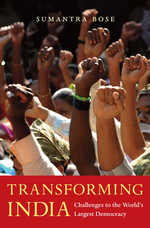 Transforming India: Challenges to the World’s Largest Democracy
Sumantra Bose
Harvard University Press, 2013 A nation of 1.25 billion people composed of numerous ethnic, linguistic, religious, and caste communities, India is the world’s most diverse democracy. Drawing on his extensive fieldwork and experience of Indian politics, Sumantra Bose tells the story of democracy’s evolution in India since the 1950s—and describes the many challenges it faces in the early twenty-first century.
Over the past two decades, India has changed from a country dominated by a single nationwide party into a robust multiparty and federal union, as regional parties and leaders have risen and flourished in many of India’s twenty-eight states. The regionalization of the nation’s political landscape has decentralized power, given communities a distinct voice, and deepened India’s democracy, Bose finds, but the new era has also brought fresh dilemmas.
The dynamism of India’s democracy derives from the active participation of the people—the demos. But as Bose makes clear, its transformation into a polity of, by, and for the people depends on tackling great problems of poverty, inequality, and oppression. This tension helps explain why Maoist revolutionaries wage war on the republic, and why people in the Kashmir Valley feel they are not full citizens. As India dramatically emerges on the global stage, Transforming India: Challenges to the World’s Largest Democracy provides invaluable analysis of its complexity and distinctiveness.
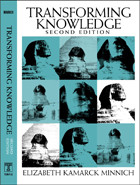 Transforming Knowledge 2Nd Edition
Elizabeth Kamarck Minnich
Temple University Press, 2004 This is a book about how we define knowledge and how we think about moral and political questions. It argues that the prevailing systems of knowledge, morality, and politics are rooted in views that are exclusionary and therefore legitimate injustice, patriarchy, and violence. That is, these views divide humans into different kinds along a hierarchy whose elite still defines the systems that shape our lives and misshape our thinking. Like the first edition of Transforming Knowledge, this substantially revised edition calls upon us to continue to liberate our minds and the systems we live within from concepts that rationalize inequality. It engages with the past fifteen years of feminist scholarship and developments in its allied fields (such as Cultural Studies, African American Studies, Queer Studies, and Disability Studies) to critique the deepest and most vicious of old prejudices. This new edition extends Minnich's arguments and connects them with the contemporary academy as well as recent instances of domination, genocide, and sexualized violence.
* Updated to consider recent scholarship in Gender, Multicultural, Postcolonial, Disability, Native American, and Queer Studies, among other fields of study
* Revised to include an extended analysis of the conceptual errors that legitimate domination, including the construction of kinds ("genders") of human beings
* Revised to include new materials from a variety of cultures and times, and engages with today's contemporary debates about affirmative action, postmodernism, and religion
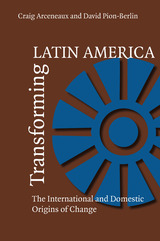 Transforming Latin America: The International And Domestic Origins Of Change
Craig Arceneaux
University of Pittsburgh Press, 2005
This ambitious book offers a clear and unified framework for understanding political change across Latin America. The impact of U.S. hegemony and the global economic system on the region is widely known, and scholars and advocates alike point to Latin America’s vulnerability in the face of external forces. In spite of such foreign pressure, however, individual countries continue to chart their own courses, displaying considerable variation in political and economic life.
Looking broadly across the Western Hemisphere, with examples from Brazil, the Southern Cone, the Andes, and Central America, Arceneaux and Pion-Berlin identify general rules that explain how international and domestic politics interact in specific contexts. The detailed, accessible case studies cast new light on such central problems as neoliberal economic reform, democratization, human rights, regional security, environmental degradation, drug trafficking, and immigration. And they consider not only what actors, institutions, and ideas matter in particular political contexts, but when, where, and how they matter. By dividing issues into the domains of "high" and "low" politics, and differentiating between short-term problems and more permanent concerns, they create an innovative typology for analyzing a wide variety of political events and trends.
 Transforming Markets: A Development Bank for the 21st Century. A History of the EBRD, Volume 2
Andrew Kilpatrick
Central European University Press, 2021 The second volume of the history of the European Bank for Reconstruction and Development (EBRD) takes up the story of how the Bank has become an indispensable part of the international financial architecture. It tracks the rollercoaster ride during this period, including the Bank’s crucial coordinating role in response to global and regional crises, the calls for its presence as an investor in Turkey, the Middle East and North Africa and later Greece and Cyprus, as well as the consequences of conflicts within its original region. It shows how in face of the growing threat of global warming the EBRD, working mainly with the private sector, developed a sustainable energy business model to tackle climate change. Transforming Markets also examines how the EBRD broadened its investment criteria, arguing that transition towards sustainable economies requires market qualities that are not only competitive and integrated but which are also resilient, well-governed, green and more inclusive. This approach aligned with the 2015 Paris Agreement and the international community’s 2030 Agenda for Sustainable Development, with its core set of 17 sustainable development goals. The story of the EBRD’s own transition and rich history provides a route map for building the sustainable markets necessary for future growth and prosperity.
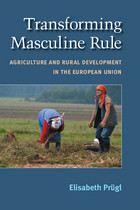 Transforming Masculine Rule: Agriculture and Rural Development in the European Union
Elisabeth Prügl
University of Michigan Press, 2011 "The premise of mainstreaming gender is to bring equality concerns into every aspect of policy-making, and this brave book offers a close look at how feminists have taken up the challenge to transform the hidden dynamics of male domination in agricultural policy in Europe. In contrast to the automatic assumption that (neo)liberal policy always works against women’s interests, Prügl demonstrates the potential for feminist ju-jitsu to take advantage of multiple levels of governance to empower women in some circumstances. Although feminists were not always successful, the story of their efforts to remake agricultural policy should encourage activists to look for points of leverage in this and other contested and changing multilevel power systems."
---Myra Marx Ferree, University of Wisconsin "Information on policy development, conflicts about improving the status of farm women, and using rural development policies to foster gender equality is hard to access in English and extremely useful for researchers concerned with the specifics of gender equality policy in the EU."
---Alison Woodward, Institute for European Studies, Vrije Universiteit Brussel "This book is a must-read for scholars interested in the gendered process of global restructuring. Elisabeth Prügl succeeds superbly in teasing out the power politics involved in European agricultural policy. Through the lens of a feminist-constructivist approach, she makes visible the multiple mechanisms of gendered power within the state. This very lucid narrative is a milestone in a new generation of feminist theoretical scholarship."
---Brigitte Young, University of Muenster, Germany Taking West and East Germany as case studies, Elisabeth Prügl shows how European agricultural policy has cemented long-standing gender-based inequalities and how feminists have used liberalization as an opportunity to challenge such inequalities. Through a comparison of the EU’s rural development program known as LEADER as it played out in the Altmark region in the German East and in the Danube/Bavarian Forest region in the West, Prügl provides a close-up view of the power politics involved in government policies and programs. In identifying mechanisms of power (refusal, co-optation, compromise, normalization, and silencing of difference), Prügl illustrates how these mechanisms operate in arguments over gender relations within the state. Her feminist-constructivist approach to global restructuring as a gendered process brings into view multiple levels of governance and the variety of gender constructions operating in different societies. Ultimately, Prügl offers a new understanding of patriarchy as diverse, contested, and in flux. Jacket photograph: © iStockphoto.com/Wojtek Kryczka
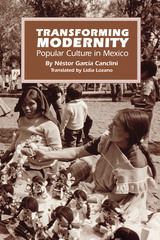 Transforming Modernity: Popular Culture in Mexico
By Néstor García Canclini
University of Texas Press, 1992 Is popular culture merely a process of creating, marketing, and consuming a final product, or is it an expression of the artist's surroundings and an attempt to alter them? Noted Argentine/Mexican anthropologist Néstor García Canclini addresses these questions and more in Transforming Modernity, a translation of Las culturas populares en el capitalismo. Based on fieldwork among the Purépecha of Michoacán, Mexico, some of the most talented artisans of the New World, the book is not so much a work of ethnography as of philosophy—a cultural critique of modernism. García Canclini delineates three interpretations of popular culture: spontaneous creation, which posits that artistic expression is the realization of beauty and knowledge; "memory for sale," which holds that original products are created for sale in the imposed capitalist system; and the tourist outlook, whereby collectibles are created to justify development and to provide insight into what capitalism has achieved. Transforming Modernity argues strongly for popular culture as an instrument of understanding, reproducing, and transforming the social system in order to elaborate and construct class hegemony and to reflect the unequal appropriation and distribution of cultural capital. With its wide scope, this book should appeal to readers within and well beyond anthropology—those interested in cultural theory, social thought, and Mesoamerican culture.
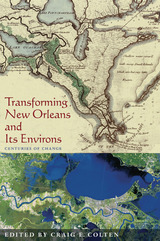 Transforming New Orleans and Its Environs: Centuries Of Change
Craig Colten
University of Pittsburgh Press, 2001
Human settlement of the Lower Mississippi River Valley—especially in New Orleans, the region’s largest metropolis—has produced profound and dramatic environmental change. From prehistoric midden building to late-twentieth century industrial pollution, Transforming New Orleans and Its Environs traces through history the impact of human activity upon the environment of this fascinating and unpredictable region.
In eleven essays, scholars across disciplines––including anthropology, architecture, history, natural history, and geography––chronicle how societies have worked to transform untamed wetlands and volatile floodplains into a present-day sprawling urban center and industrial complex, and how they have responded to the environmental changes brought about by the disruption of the natural setting.
This new text follows the trials of native and colonial settlers as they struggled to shape the environment to fit the needs of urbanization. It demonstrates how the Mississippi River, while providing great avenues for commerce, transportation, and colonization also presented the region’s greatest threat to urban centers, and details how engineers set about taming the mighty river. Also featured is an analysis of the impact of modern New Orleans upon the surrounding rural parishes and the effect urban pollution has had on the city’s water supply and aquatic life.
Transforming Peasants, Property and Power: The Collectivization of Agriculture in Romania, 1949–1962
Dorin Dobrincu
Central European University Press, 2009 The subject matter of the volume is part of larger research agenda on the process of land collectivization in the former communist camp, focusing on state, identity and property. The main innovation of the volume is to apply recent interdisciplinary approaches to the study of the collectivization process, asking what types of new peasant-state relations it formed and how it transformed notions of self, persons, and things (such as land). The project conceived of changes in the system of ownership as causing changes in the identity and attitude of people; similarly, it regarded the study of personal identities as essential for understanding changes in the system of ownership. This perspective is rare in the area-studies approaches to the topic.
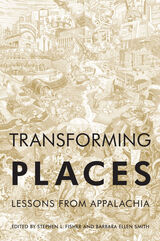 Transforming Places: Lessons from Appalachia
Edited by Stephen L. Fisher and Barbara Ellen Smith
University of Illinois Press, 2012 In this era of globalization's ruthless deracination, place attachments have become increasingly salient in collective mobilizations across the spectrum of politics. Like place-based activists in other resource-rich yet impoverished regions across the globe, Appalachians are contesting economic injustice, environmental degradation, and the anti-democratic power of elites. This collection of seventeen original essays by scholars and activists from a variety of backgrounds explores this wide range of oppositional politics, querying its successes, limitations, and impacts. The editors' critical introduction and conclusion integrate theories of place and space with analyses of organizations and events discussed by contributors. Transforming Places illuminates widely relevant lessons about building coalitions and movements with sufficient strength to challenge corporate-driven globalization. Contributors are Fran Ansley, Yaira Andrea Arias Soto, Dwight B. Billings, M. Kathryn Brown, Jeannette Butterworth, Paul Castelloe, Aviva Chomsky, Dave Cooper, Walter Davis, Meredith Dean, Elizabeth C. Fine, Jenrose Fitzgerald, Doug Gamble, Nina Gregg, Edna Gulley, Molly Hemstreet, Mary Hufford, Ralph Hutchison, Donna Jones, Ann Kingsolver, Sue Ella Kobak, Jill Kriesky, Michael E. Maloney, Lisa Markowitz, Linda McKinney, Ladelle McWhorter, Marta Maria Miranda, Chad Montrie, Maureen Mullinax, Phillip J. Obermiller, Rebecca O'Doherty, Cassie Robinson Pfleger, Randal Pfleger, Anita Puckett, Katie Richards-Schuster, June Rostan, Rees Shearer, Daniel Swan, Joe Szakos, Betsy Taylor, Thomas E. Wagner, Craig White, and Ryan Wishart.
 Transforming Relations: Essays on Jews and Christians throughout History in Honor of Michael A. Signer
Franklin T. Harkins
University of Notre Dame Press, 2010
Transforming Relations is a collection of original essays on the history of Jews and Christians in antiquity, the Middle Ages, and the modern era that honors the influential work of Michael A. Signer (1945-2009). Reflecting the breadth of Signer's research and pedagogical interests, the essays treat various aspects of the Jewish-Christian relationship through the centuries, from the divine law in antiquity to philosemitism in contemporary Christianity, from scriptural interpretation in the twelfth century to Christian Hebraism in the fifteenth, and from the presentation of Christianity in the Talmud and Midrashim to modern Christian understandings of Judaism. The essays are unified in their emphases on two principles that pervade Signer's own scholarly work: that the sacred texts shared by Jews and Christians serve simultaneously as a point of convergence and divergence for the two religious communities, and that modern practitioners of Judaism and Christianity must recognize and appreciate the other as part of a living tradition.
A fitting tribute to Signer's wide-ranging work, the volume aims to complement and continue his passionate and learned work of transforming relations between Jews and Christians. It will appeal to a broad readership, including historians of Judaism and Christianity, scholars of the Middle Ages, students of the history of biblical exegesis, and systematic theologians.
"Michael Signer, beloved scholar and rabbi, was a medievalist who spoke to contemporary concerns and a Jew who had close friendships with Christians. The scholarly depth of the essays in this volume and the range of issues the authors address are testimony to his significant legacy. This excellent book honors the memory of Rabbi Signer. It also will be a blessing to all who read it." --Mary C. Boys, S.N.J.M., Union Theological Seminary
"The Babylonian Talmud teaches Haval Ôal-dÕavdin ve-la mishtakhinÉ (Sanhedrin 111a), "Alas for the one who has been lost and cannot be replaced." Michael Signer's death leaves us all bereft, family and friends alike. This volume is a testament to Michael's breadth of scholarship and to his enduring legacy, and is a fitting tribute. Yehi zikhro barukh: "May Michael's memory be always for a blessing." --Robert A. Harris, Jewish Theological Seminary
"This superb collection of original essays is a most fitting tribute to the work of the late Rabbi Michael A. Signer (1945-2009). Michael's colleagues and students not only reflect on his legacy but also embody his very practice of a rigorous and collaborative scholarship that builds bridges of mutual understanding across the fractures of history and the realities of religious difference. With this volume, Michael's transformative work in Jewish-Christian relations continues." --Elizabeth Groppe, Xavier University
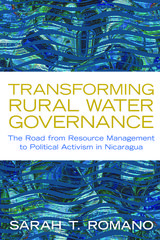 Transforming Rural Water Governance: The Road from Resource Management to Political Activism in Nicaragua
Sarah T. Romano
University of Arizona Press, 2019 The most acute water crises occur in everyday contexts in impoverished rural and urban areas across the Global South. While they rarely make headlines, these crises, characterized by inequitable access to sufficient and clean water, affect over one billion people globally. What is less known, though, is that millions of these same global citizens are at the forefront of responding to the challenges of water privatization, climate change, deforestation, mega-hydraulic projects, and other threats to accessing water as a critical resource.
In Transforming Rural Water Governance Sarah T. Romano explains the bottom-up development and political impact of community-based water and sanitation committees (CAPS) in Nicaragua. Romano traces the evolution of CAPS from rural resource management associations into a national political force through grassroots organizing and strategic alliances.
Resource management and service provision is inherently political: charging residents fees for service, determining rules for household water shutoffs and reconnections, and negotiating access to water sources with local property owners constitute just a few of the highly political endeavors resource management associations like CAPS undertake as part of their day-to-day work in their communities. Yet, for decades in Nicaragua, this local work did not reflect political activism. In the mid-2000s CAPS’ collective push for social change propelled them onto a national stage and into new roles as they demanded recognition from the government.
Romano argues that the transformation of Nicaragua’s CAPS into political actors is a promising example of the pursuit of sustainable and equitable water governance, particularly in Latin America. Transforming Rural Water Governance demonstrates that when activism informs public policy processes, the outcome is more inclusive governance and the potential for greater social and environmental justice.
 Transforming Saints: From Spain to New Spain
Charlene Villaseñor Black
Vanderbilt University Press, 2022 Transforming Saints explores the transformation and function of the images of holy women within wider religious, social, and political contexts of Old Spain and New Spain from the Spanish conquest to Mexican independence.
The chapters here examine the rise of the cults of the lactating Madonna, St. Anne, St. Librada, St. Mary Magdalene, and the Suffering Virgin. Concerned with holy figures presented as feminine archetypes—images that came under Inquisition scrutiny—as well as with cults suspected of concealing Indigenous influences, Charlene Villaseñor Black argues that these images would come to reflect the empowerment and agency of women in viceregal Mexico. Her close analysis of the imagery additionally demonstrates artists' innovative responses to Inquisition censorship and the new artistic demands occasioned by conversion.
The concerns that motivated the twenty-first century protests against Chicana artists Yolanda López in 2001 and Alma López in 2003 have a long history in the Hispanic world, in the form of anxieties about the humanization of sacred female bodies and fears of Indigenous influences infiltrating Catholicism. In this context Black also examines a number of important artists in depth, including El Greco, Murillo, Jusepe de Ribera, Pedro de Mena, Baltasar de Echave Ibía, Juan Correa, Cristóbal de Villalpando, and Miguel Cabrera.
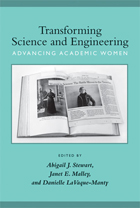 Transforming Science and Engineering: Advancing Academic Women
Abigail J. Stewart, Janet E. Malley, and Danielle LaVaque-Manty, Editors
University of Michigan Press, 2010 "If you have thrown up your hands in despair after trying to retain women science and engineering in the academy, read this book. It offers detailed descriptions of a wide array of tried-and-true programs that have been tested out by the NSF ADVANCE program."
---Joan C. Williams, 1066 Foundation Chair & Distinguished Professor of Law Director, Center for WorkLife Law University of California "Solid and practical, this volume details the first years of NSF funded institutional change to remake gender dynamics inside U.S. science. What works? What doesn't? And why?"
---Londa Schiebinger, John L. Hinds Professor of History of Science and Barbara D. Finberg Director, Michelle R. Clayman Institute for Gender Research at Stanford University, and author of Has Feminism Changed Science? "This book's time has come. Transforming Science and Engineering is important, and lots of people can learn from what has happened in the ADVANCE universities."
---Lotte Bailyn, Professor of Management, Behavioral and Policy Sciences Department, Sloan School of Management, MIT; author of Breaking the Mold: Redesigning Work for Productive and Satisfying Lives; and coauthor of Beyond Work-Family Balance: Advancing Gender Equity and Workplace Performance "This collection profiles 16 NSF ADVANCE grant successes, sandwiched between an interview with Dr. Alice Hogan and Dr. Lee Harle's summary of cost-effective practices from ADVANCE programs, giving so many 'biggest bang for the buck' examples in so few pages that it will easily justify both the cost of the book and the reading time. These accounts do not continue the too-common vague referrals to 'unhealthy environment' or 'chilly climate,' but rather expound the situations before and after the interventions, something necessary in order to transplant the programs, or even to use the programs for idea generation. Transforming Science and Engineering is a model of excellence, and will be extremely useful for those women, men, faculty, or administrators wanting to help their universities move into the 21st century and attract to their campuses qualified women and men who want opportunities to attain their full potentials."
---Donna J. Nelson, Associate Professor of Chemistry, University of Oklahoma In 2001, the National Science Foundation's ADVANCE Institutional Transformation program began awarding five-year grants to colleges and universities to address a common problem: how to improve the work environment for women faculty in science and engineering. Drawing on the expertise of scientists, engineers, social scientists, specialists in organizational behavior, and university administrators, this collection is the first to describe the variety of innovative efforts academic institutions around the country have undertaken. Focusing on a wide range of topics, from how to foster women's academic success in small teaching institutions, to how to use interactive theater to promote faculty reflection about departmental culture, to how a particular department created and maintained a healthy climate for women's scientific success, the contributors discuss both the theoretical and empirical aspects of the initiatives, with emphasis on the practical issues involved in creating these approaches. The resulting evidence shows that these initiatives have the desired effects. The cases represented in this collection depict the many issues women faculty in science and engineering face, and the solutions that are presented can be widely accepted at academic institutions around the United States. The essays in Transforming Science and Engineering illustrate that creating work environments that sustain and advance women scientists and engineers benefits women, men, and underrepresented minorities. Abigail J. Stewart is Sandra Schwartz Tangri Distinguished University Professor of Psychology and Women's Studies at the University of Michigan. Janet E. Malley is a psychologist and Associate Director of the Institute for Research on Women and Gender at the University of Michigan. Danielle LaVaque-Manty, former Research Associate at the Institute for Research on Women and Gender at the University of Michigan, teaches composition at U-M's Sweetland Writing Center. Cover photo: Joanne Leonard
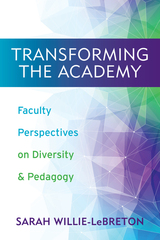 Transforming the Academy: Faculty Perspectives on Diversity and Pedagogy
Willie-LeBreton, Sarah
Rutgers University Press, 2016 In recent decades, American universities have begun to tout the “diversity” of their faculty and student bodies. But what kinds of diversity are being championed in their admissions and hiring practices, and what kinds are being neglected? Is diversity enough to solve the structural inequalities that plague our universities? And how might we articulate the value of diversity in the first place? Transforming the Academy begins to answer these questions by bringing together a mix of faculty—male and female, cisgender and queer, immigrant and native-born, tenured and contingent, white, black, multiracial, and other—from public and private universities across the United States. Whether describing contentious power dynamics within their classrooms or recounting protests that occurred on their campuses, the book’s contributors offer bracingly honest inside accounts of both the conflicts and the learning experiences that can emerge from being a representative of diversity. The collection’s authors are united by their commitment to an ideal of the American university as an inclusive and transformative space, one where students from all backgrounds can simultaneously feel intellectually challenged and personally supported. Yet Transforming the Academy also offers a wide range of perspectives on how to best achieve these goals, a diversity of opinion that is sure to inspire lively debate.
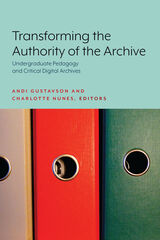 Transforming the Authority of the Archive: Undergraduate Pedagogy and Critical Digital Archives
Andi Gustavson and Charlotte Nunes, Editors
Lever Press, 2023 Featuring a wide array of perspectives, Transforming the Authority of the Archive details new roles for archives in undergraduate pedagogy and new roles for undergraduates in archives. While there has long been a place for archival exploration in undergraduate education (especially primary source analysis of items curated by archivists and educators), the models offered here engage students not only in analyzing collections, but also in the manifold challenges of building, stewarding, and communicating about collections. In transforming what archives are to undergraduate education, the projects detailed in this book transform the authority of the archive, as students and community partners claim powers to curate and create history.
Contributions to this volume represent a range of institutions including small liberal arts colleges, HBCUs, Ivy Leagues, large research institutions, and community-based collections. The assignments, projects, and initiatives described across this volume are fundamentally concerned with the challenge to model digital archival collections so as to center individual and community voices that are historically under-engaged in the archives. To address this challenge, contributors describe various approaches to substantively, often radically, redistribute archival resources and authority. The chapters within Transforming the Authority of the Archive offer thoughtful and creative pedagogical approaches to counter the presumed neutrality of the archive and advocate a shared understanding of the contingency of archival collections. This book is a must-read for liberal arts faculty, graduate students, archivists (both community- and institutionally-affiliated), information-studies professionals, librarians, and other professionals working and teaching in archives, museums, libraries, and other cultural heritage institutions.
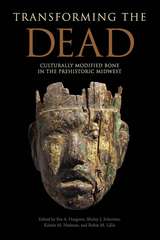 Transforming the Dead: Culturally Modified Bone in the Prehistoric Midwest
Eve A. Hargrave
University of Alabama Press, 2015 Transforming the Dead is a collection of essays that examines culturally modified human bones and their roles as “cultural and ritual objects” among prehistoric Eastern Woodland cultures. Previous scholarship has explored the role of human body parts in Native American cultures as trophies of war and revered ancestors. This collection discusses new evidence that human elements were also important components of daily and ritual activities across the Eastern Woodlands. The contributors to this volume discuss each case study within the unique regional and temporal contexts of the material, rather than seeking universal answers to how these objects were used. Most research addressing modified human bone has focused on cut marks and trauma associated with warfare, trophy taking, and burial practices. The editors and contributors of Transforming the Dead document the varied and often overlooked ways that human bone was intentionally modified through drilling, incising, cutting, and polishing for utilitarian, ornamental, spiritual, or ritual use. Examples include bracelets and gorgets to be worn, as well as musical rasps, pipe stems, masks, and protective talismans. The form and function of these objects are not unusual; their construction from the remains of “another” sets them apart. Through a flexible but systematic analysis of the archaeological record, the contributors bring into focus how the careful selection, modification, and retention of particular bones or body parts of an individual after death offer insights into concepts of personhood, the body, life, and death among the prehistoric Native Americans in the Midwest.
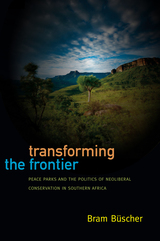 Transforming the Frontier: Peace Parks and the Politics of Neoliberal Conservation in Southern Africa
Bram Büscher
Duke University Press, 2013 International peace parks—transnational conservation areas established and managed by two or more countries—have become a popular way of protecting biodiversity while promoting international cooperation and regional development. In Transforming the Frontier, Bram Büscher shows how cross-border conservation neatly reflects the neoliberal political economy in which it developed. Based on extensive research in southern Africa with the Maloti-Drakensberg Transfrontier Conservation and Development Project, Büscher explains how the successful promotion of transfrontier conservation as a "win-win" solution happens not only in spite of troubling contradictions and problems, but indeed because of them. This is what he refers to as the "politics of neoliberal conservation," which receives its strength from effectively combining strategies of consensus, antipolitics, and marketing. Drawing on long-term, multilevel ethnographic research, Büscher argues that transfrontier conservation projects are not as concerned with on-the-ground development as they are purported to be. Instead, they are reframing environmental protection and sustainable development to fit an increasingly contradictory world order.
Transforming the Grid Towards Fully Renewable Energy
Oliver Probst
The Institution of Engineering and Technology, 2020 The need for a deep decarbonization of the energy sector and the associated opportunities are now increasingly recognized, with fossil fuel projects simultaneously becoming more risky business propositions. With large-scale wind and solar generation now being the cheapest options in many parts of the world, a deeply renewable electricity sector is predestined to become the main driver of this transition. Yet, misconceptions abound. In part, this can be traced back to the complexity of the electricity sector and the processes involved in its transformation, located at the intersection between grid design and operation, markets and regulations.
Transforming the Personal, Political, Historical and Sacred in Theory and Practice: Personal, Political, Historical, and Sacred
Manfred Halpern
University of Scranton Press, 2009 The eminent political scientist Manfred Halpern (1924–2001) viewed politics as belonging to each of us, as part of the nature of being human. In A Comprehensive Philosophy of Transformation, his magnum opus, Halpern elucidates the interconnected “four faces of our being”: the political, personal, historical, and sacred. This momentous volume identifies several modes of political activity, warns against the dangers of leaving politics to professional politicians, and urges us to build networks of compassion that include everyone in a just society. Overall, Halpern calls for a transformative politics achieved through enhanced participation and understanding.
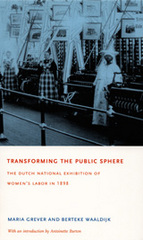 Transforming the Public Sphere: The Dutch National Exhibition of Women’s Labor in 1898
Maria Grever and Berteke Waaldijk
Duke University Press, 2004 In 1898, the year Queen Wilhelmina of the Netherlands was inaugurated, five hundred women organized an enormous public exhibition showcasing women’s contributions to Dutch society as workers in a strikingly broad array of professions. The National Exhibition of Women’s Labor, held in The Hague, was attended by more than ninety thousand visitors. Maria Grever and Berteke Waaldijk consider the exhibition in the international contexts of women’s history, visual culture, and imperialism. A comprehensive social history, Transforming the Public Sphere describes the planning and construction of the Exhibition of Women’s Labor and the event itself—the sights, the sounds, and the smells—as well as the role of exhibitions in late-nineteenth-century public culture. The authors discuss how the 1898 exhibition displayed the range and variety of women’s economic, intellectual, and artistic roles in Dutch culture, including their participation in such traditionally male professions as engineering, diamond-cutting, and printing and publishing. They examine how people and goods from the Dutch colonies were represented, most notably in an extensive open-air replica of a “Javanese village.” Grever and Waaldijk reveal the tensions the exhibition highlighted: between women of different economic classes; between the goal of equal rights for women and the display of imperial subjects and spoils; and between socialists and feminists, who competed fiercely with one another for working women’s support. Transforming the Public Sphere explores an event that served as the dress rehearsal for advances in women’s public participation during the twentieth century.
 Transforming Therapy: Mental Health Practice and Cultural Change in Mexico
Whitney L. Duncan
Vanderbilt University Press, 2018 Oaxaca is known for many things--its indigenous groups, archaeological sites, crafts, and textiles--but not for mental health care. When one talks with Oaxacans about mental health, most say it's a taboo topic and that people there think you "have to be crazy to go to a psychologist." Yet throughout Oaxaca are signs advertising the services of psicólogos; there are prominent conferences of mental health professionals; and self-help groups like Neurotics Anonymous thrive, where participants rise to say, "Hola, mi nombre es Raquel, y soy neurótica."
How does one explain the recent growth of Euroamerican-style therapies in the region? Author Whitney L. Duncan analyzes this phenomenon of "psy-globalization" and develops a rich ethnography of its effects on Oaxacans' understandings of themselves and their emotions, ultimately showing how globalizing forms of care are transformative for and transformed by the local context. She also delves into the mental health impacts of migration from Mexico to the United States, both for migrants who return and for the family members they leave behind.
This book is a recipient of the Norman L. and Roselea J. Goldberg Prize from Vanderbilt University Press for the best book in the area of medicine.
|
|

